Nursing Professional Responsibility and Accountability Assessment 2022
VerifiedAdded on 2022/09/16
|64
|20031
|25
AI Summary
Contribute Materials
Your contribution can guide someone’s learning journey. Share your
documents today.
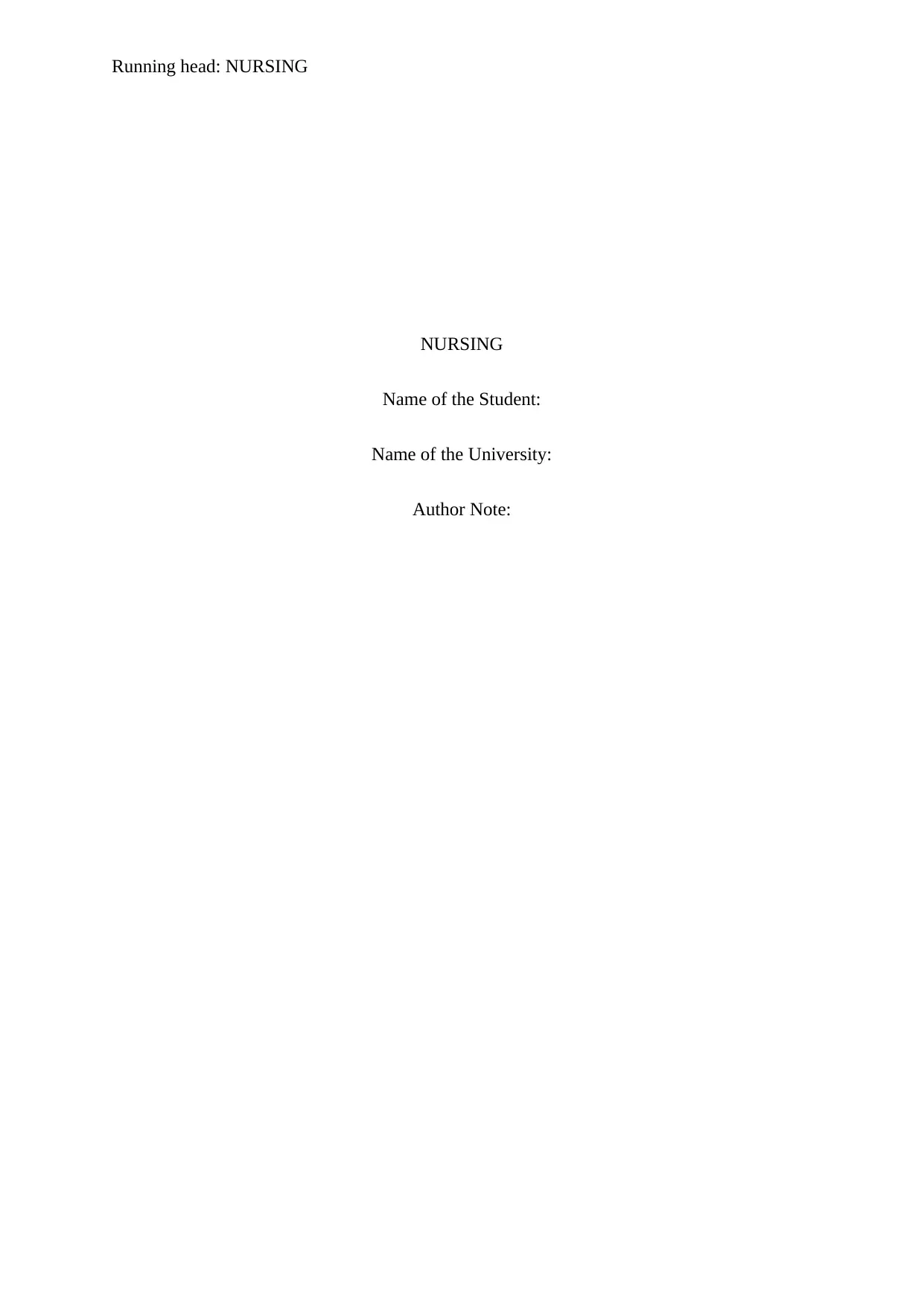
Running head: NURSING
NURSING
Name of the Student:
Name of the University:
Author Note:
NURSING
Name of the Student:
Name of the University:
Author Note:
Secure Best Marks with AI Grader
Need help grading? Try our AI Grader for instant feedback on your assignments.
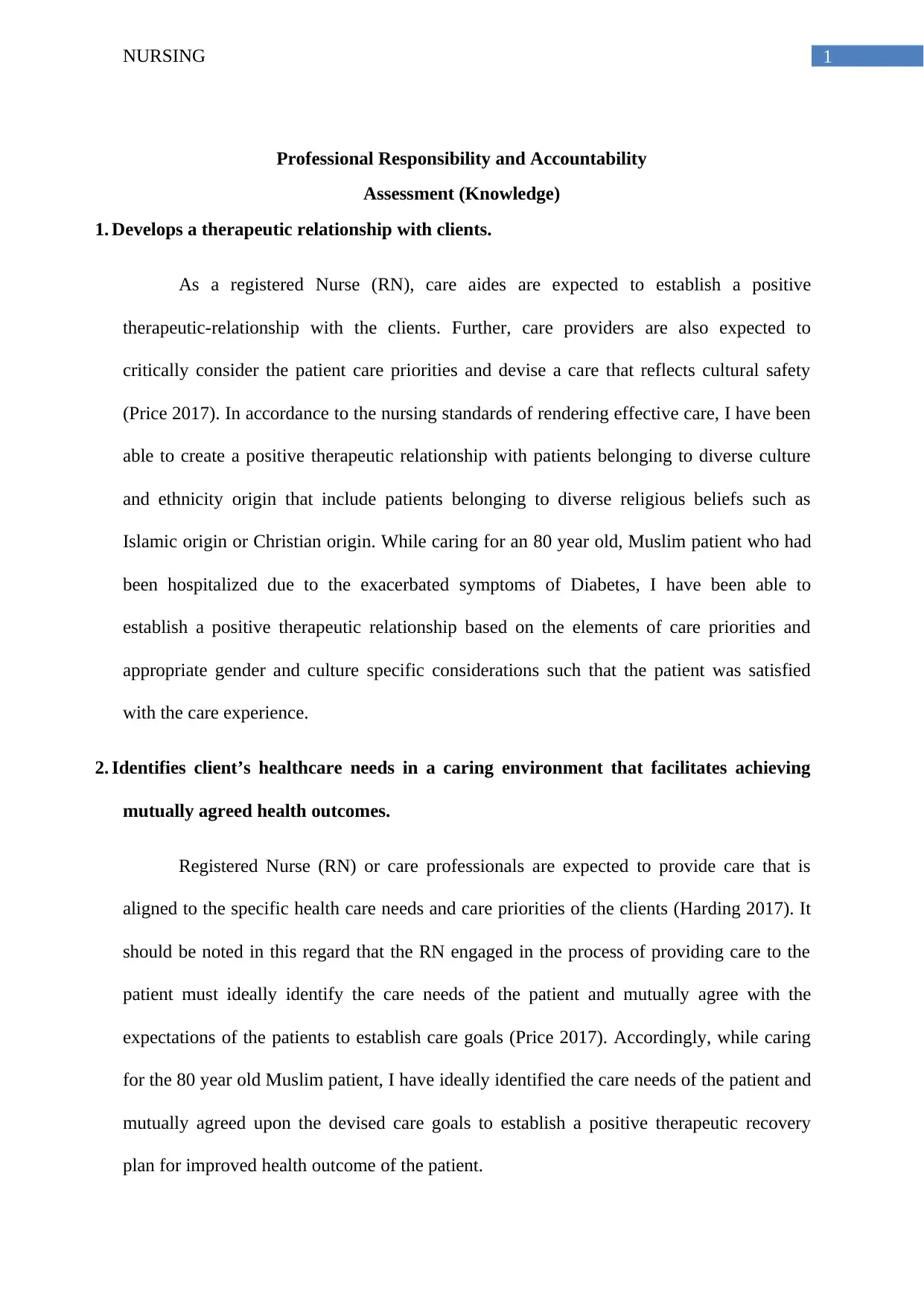
1NURSING
Professional Responsibility and Accountability
Assessment (Knowledge)
1. Develops a therapeutic relationship with clients.
As a registered Nurse (RN), care aides are expected to establish a positive
therapeutic-relationship with the clients. Further, care providers are also expected to
critically consider the patient care priorities and devise a care that reflects cultural safety
(Price 2017). In accordance to the nursing standards of rendering effective care, I have been
able to create a positive therapeutic relationship with patients belonging to diverse culture
and ethnicity origin that include patients belonging to diverse religious beliefs such as
Islamic origin or Christian origin. While caring for an 80 year old, Muslim patient who had
been hospitalized due to the exacerbated symptoms of Diabetes, I have been able to
establish a positive therapeutic relationship based on the elements of care priorities and
appropriate gender and culture specific considerations such that the patient was satisfied
with the care experience.
2. Identifies client’s healthcare needs in a caring environment that facilitates achieving
mutually agreed health outcomes.
Registered Nurse (RN) or care professionals are expected to provide care that is
aligned to the specific health care needs and care priorities of the clients (Harding 2017). It
should be noted in this regard that the RN engaged in the process of providing care to the
patient must ideally identify the care needs of the patient and mutually agree with the
expectations of the patients to establish care goals (Price 2017). Accordingly, while caring
for the 80 year old Muslim patient, I have ideally identified the care needs of the patient and
mutually agreed upon the devised care goals to establish a positive therapeutic recovery
plan for improved health outcome of the patient.
Professional Responsibility and Accountability
Assessment (Knowledge)
1. Develops a therapeutic relationship with clients.
As a registered Nurse (RN), care aides are expected to establish a positive
therapeutic-relationship with the clients. Further, care providers are also expected to
critically consider the patient care priorities and devise a care that reflects cultural safety
(Price 2017). In accordance to the nursing standards of rendering effective care, I have been
able to create a positive therapeutic relationship with patients belonging to diverse culture
and ethnicity origin that include patients belonging to diverse religious beliefs such as
Islamic origin or Christian origin. While caring for an 80 year old, Muslim patient who had
been hospitalized due to the exacerbated symptoms of Diabetes, I have been able to
establish a positive therapeutic relationship based on the elements of care priorities and
appropriate gender and culture specific considerations such that the patient was satisfied
with the care experience.
2. Identifies client’s healthcare needs in a caring environment that facilitates achieving
mutually agreed health outcomes.
Registered Nurse (RN) or care professionals are expected to provide care that is
aligned to the specific health care needs and care priorities of the clients (Harding 2017). It
should be noted in this regard that the RN engaged in the process of providing care to the
patient must ideally identify the care needs of the patient and mutually agree with the
expectations of the patients to establish care goals (Price 2017). Accordingly, while caring
for the 80 year old Muslim patient, I have ideally identified the care needs of the patient and
mutually agreed upon the devised care goals to establish a positive therapeutic recovery
plan for improved health outcome of the patient.
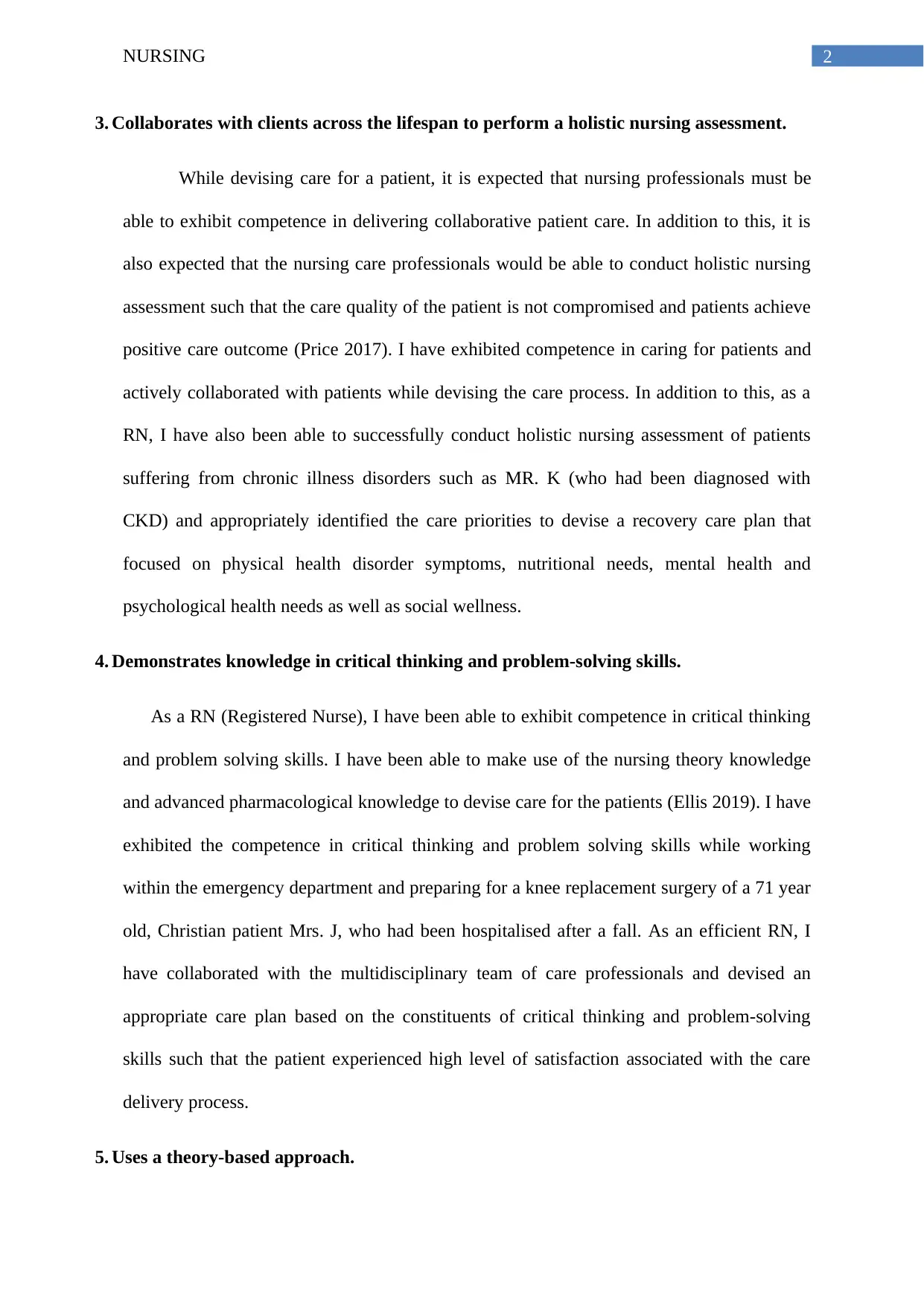
2NURSING
3. Collaborates with clients across the lifespan to perform a holistic nursing assessment.
While devising care for a patient, it is expected that nursing professionals must be
able to exhibit competence in delivering collaborative patient care. In addition to this, it is
also expected that the nursing care professionals would be able to conduct holistic nursing
assessment such that the care quality of the patient is not compromised and patients achieve
positive care outcome (Price 2017). I have exhibited competence in caring for patients and
actively collaborated with patients while devising the care process. In addition to this, as a
RN, I have also been able to successfully conduct holistic nursing assessment of patients
suffering from chronic illness disorders such as MR. K (who had been diagnosed with
CKD) and appropriately identified the care priorities to devise a recovery care plan that
focused on physical health disorder symptoms, nutritional needs, mental health and
psychological health needs as well as social wellness.
4. Demonstrates knowledge in critical thinking and problem-solving skills.
As a RN (Registered Nurse), I have been able to exhibit competence in critical thinking
and problem solving skills. I have been able to make use of the nursing theory knowledge
and advanced pharmacological knowledge to devise care for the patients (Ellis 2019). I have
exhibited the competence in critical thinking and problem solving skills while working
within the emergency department and preparing for a knee replacement surgery of a 71 year
old, Christian patient Mrs. J, who had been hospitalised after a fall. As an efficient RN, I
have collaborated with the multidisciplinary team of care professionals and devised an
appropriate care plan based on the constituents of critical thinking and problem-solving
skills such that the patient experienced high level of satisfaction associated with the care
delivery process.
5. Uses a theory-based approach.
3. Collaborates with clients across the lifespan to perform a holistic nursing assessment.
While devising care for a patient, it is expected that nursing professionals must be
able to exhibit competence in delivering collaborative patient care. In addition to this, it is
also expected that the nursing care professionals would be able to conduct holistic nursing
assessment such that the care quality of the patient is not compromised and patients achieve
positive care outcome (Price 2017). I have exhibited competence in caring for patients and
actively collaborated with patients while devising the care process. In addition to this, as a
RN, I have also been able to successfully conduct holistic nursing assessment of patients
suffering from chronic illness disorders such as MR. K (who had been diagnosed with
CKD) and appropriately identified the care priorities to devise a recovery care plan that
focused on physical health disorder symptoms, nutritional needs, mental health and
psychological health needs as well as social wellness.
4. Demonstrates knowledge in critical thinking and problem-solving skills.
As a RN (Registered Nurse), I have been able to exhibit competence in critical thinking
and problem solving skills. I have been able to make use of the nursing theory knowledge
and advanced pharmacological knowledge to devise care for the patients (Ellis 2019). I have
exhibited the competence in critical thinking and problem solving skills while working
within the emergency department and preparing for a knee replacement surgery of a 71 year
old, Christian patient Mrs. J, who had been hospitalised after a fall. As an efficient RN, I
have collaborated with the multidisciplinary team of care professionals and devised an
appropriate care plan based on the constituents of critical thinking and problem-solving
skills such that the patient experienced high level of satisfaction associated with the care
delivery process.
5. Uses a theory-based approach.
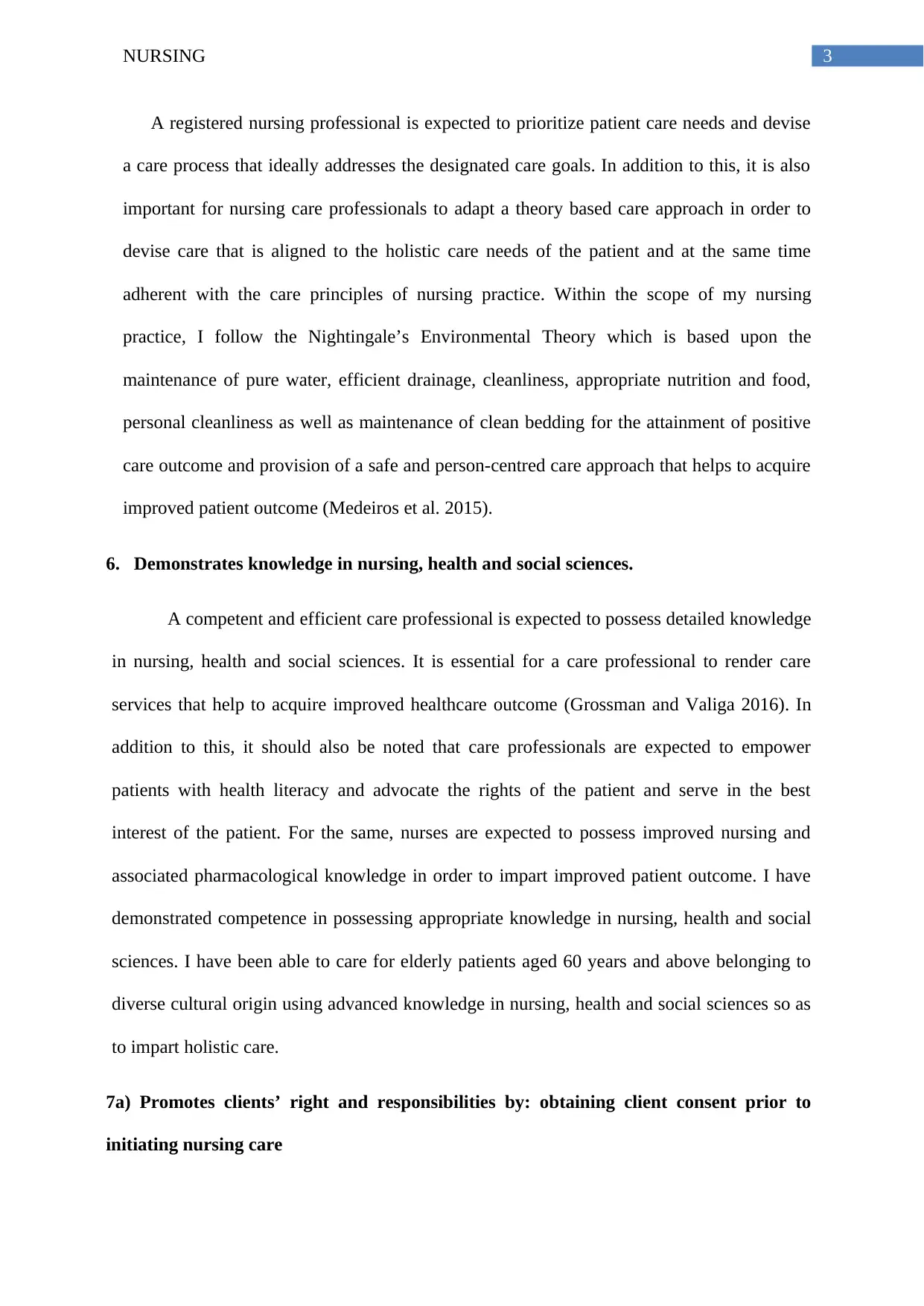
3NURSING
A registered nursing professional is expected to prioritize patient care needs and devise
a care process that ideally addresses the designated care goals. In addition to this, it is also
important for nursing care professionals to adapt a theory based care approach in order to
devise care that is aligned to the holistic care needs of the patient and at the same time
adherent with the care principles of nursing practice. Within the scope of my nursing
practice, I follow the Nightingale’s Environmental Theory which is based upon the
maintenance of pure water, efficient drainage, cleanliness, appropriate nutrition and food,
personal cleanliness as well as maintenance of clean bedding for the attainment of positive
care outcome and provision of a safe and person-centred care approach that helps to acquire
improved patient outcome (Medeiros et al. 2015).
6. Demonstrates knowledge in nursing, health and social sciences.
A competent and efficient care professional is expected to possess detailed knowledge
in nursing, health and social sciences. It is essential for a care professional to render care
services that help to acquire improved healthcare outcome (Grossman and Valiga 2016). In
addition to this, it should also be noted that care professionals are expected to empower
patients with health literacy and advocate the rights of the patient and serve in the best
interest of the patient. For the same, nurses are expected to possess improved nursing and
associated pharmacological knowledge in order to impart improved patient outcome. I have
demonstrated competence in possessing appropriate knowledge in nursing, health and social
sciences. I have been able to care for elderly patients aged 60 years and above belonging to
diverse cultural origin using advanced knowledge in nursing, health and social sciences so as
to impart holistic care.
7a) Promotes clients’ right and responsibilities by: obtaining client consent prior to
initiating nursing care
A registered nursing professional is expected to prioritize patient care needs and devise
a care process that ideally addresses the designated care goals. In addition to this, it is also
important for nursing care professionals to adapt a theory based care approach in order to
devise care that is aligned to the holistic care needs of the patient and at the same time
adherent with the care principles of nursing practice. Within the scope of my nursing
practice, I follow the Nightingale’s Environmental Theory which is based upon the
maintenance of pure water, efficient drainage, cleanliness, appropriate nutrition and food,
personal cleanliness as well as maintenance of clean bedding for the attainment of positive
care outcome and provision of a safe and person-centred care approach that helps to acquire
improved patient outcome (Medeiros et al. 2015).
6. Demonstrates knowledge in nursing, health and social sciences.
A competent and efficient care professional is expected to possess detailed knowledge
in nursing, health and social sciences. It is essential for a care professional to render care
services that help to acquire improved healthcare outcome (Grossman and Valiga 2016). In
addition to this, it should also be noted that care professionals are expected to empower
patients with health literacy and advocate the rights of the patient and serve in the best
interest of the patient. For the same, nurses are expected to possess improved nursing and
associated pharmacological knowledge in order to impart improved patient outcome. I have
demonstrated competence in possessing appropriate knowledge in nursing, health and social
sciences. I have been able to care for elderly patients aged 60 years and above belonging to
diverse cultural origin using advanced knowledge in nursing, health and social sciences so as
to impart holistic care.
7a) Promotes clients’ right and responsibilities by: obtaining client consent prior to
initiating nursing care
Secure Best Marks with AI Grader
Need help grading? Try our AI Grader for instant feedback on your assignments.
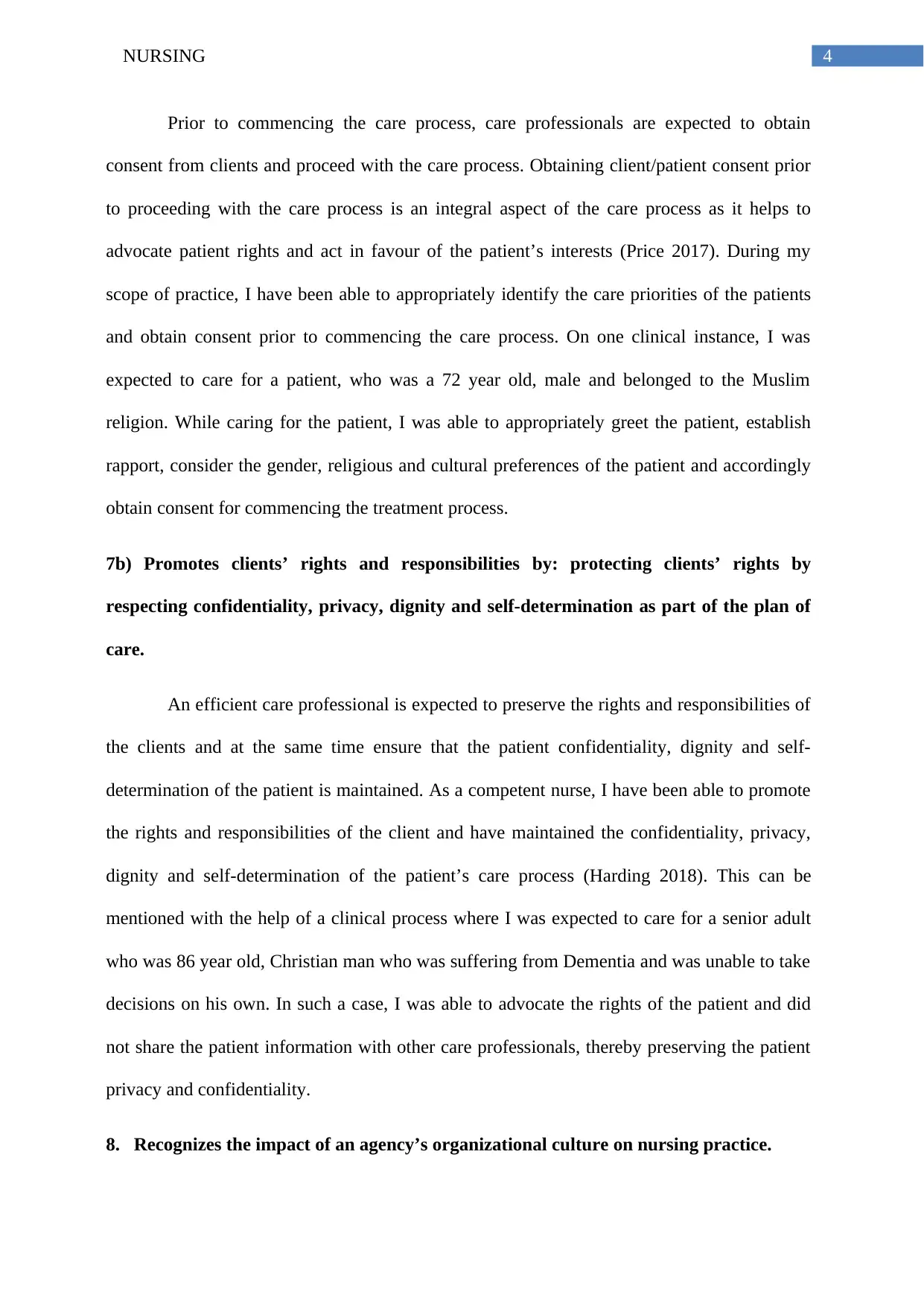
4NURSING
Prior to commencing the care process, care professionals are expected to obtain
consent from clients and proceed with the care process. Obtaining client/patient consent prior
to proceeding with the care process is an integral aspect of the care process as it helps to
advocate patient rights and act in favour of the patient’s interests (Price 2017). During my
scope of practice, I have been able to appropriately identify the care priorities of the patients
and obtain consent prior to commencing the care process. On one clinical instance, I was
expected to care for a patient, who was a 72 year old, male and belonged to the Muslim
religion. While caring for the patient, I was able to appropriately greet the patient, establish
rapport, consider the gender, religious and cultural preferences of the patient and accordingly
obtain consent for commencing the treatment process.
7b) Promotes clients’ rights and responsibilities by: protecting clients’ rights by
respecting confidentiality, privacy, dignity and self-determination as part of the plan of
care.
An efficient care professional is expected to preserve the rights and responsibilities of
the clients and at the same time ensure that the patient confidentiality, dignity and self-
determination of the patient is maintained. As a competent nurse, I have been able to promote
the rights and responsibilities of the client and have maintained the confidentiality, privacy,
dignity and self-determination of the patient’s care process (Harding 2018). This can be
mentioned with the help of a clinical process where I was expected to care for a senior adult
who was 86 year old, Christian man who was suffering from Dementia and was unable to take
decisions on his own. In such a case, I was able to advocate the rights of the patient and did
not share the patient information with other care professionals, thereby preserving the patient
privacy and confidentiality.
8. Recognizes the impact of an agency’s organizational culture on nursing practice.
Prior to commencing the care process, care professionals are expected to obtain
consent from clients and proceed with the care process. Obtaining client/patient consent prior
to proceeding with the care process is an integral aspect of the care process as it helps to
advocate patient rights and act in favour of the patient’s interests (Price 2017). During my
scope of practice, I have been able to appropriately identify the care priorities of the patients
and obtain consent prior to commencing the care process. On one clinical instance, I was
expected to care for a patient, who was a 72 year old, male and belonged to the Muslim
religion. While caring for the patient, I was able to appropriately greet the patient, establish
rapport, consider the gender, religious and cultural preferences of the patient and accordingly
obtain consent for commencing the treatment process.
7b) Promotes clients’ rights and responsibilities by: protecting clients’ rights by
respecting confidentiality, privacy, dignity and self-determination as part of the plan of
care.
An efficient care professional is expected to preserve the rights and responsibilities of
the clients and at the same time ensure that the patient confidentiality, dignity and self-
determination of the patient is maintained. As a competent nurse, I have been able to promote
the rights and responsibilities of the client and have maintained the confidentiality, privacy,
dignity and self-determination of the patient’s care process (Harding 2018). This can be
mentioned with the help of a clinical process where I was expected to care for a senior adult
who was 86 year old, Christian man who was suffering from Dementia and was unable to take
decisions on his own. In such a case, I was able to advocate the rights of the patient and did
not share the patient information with other care professionals, thereby preserving the patient
privacy and confidentiality.
8. Recognizes the impact of an agency’s organizational culture on nursing practice.
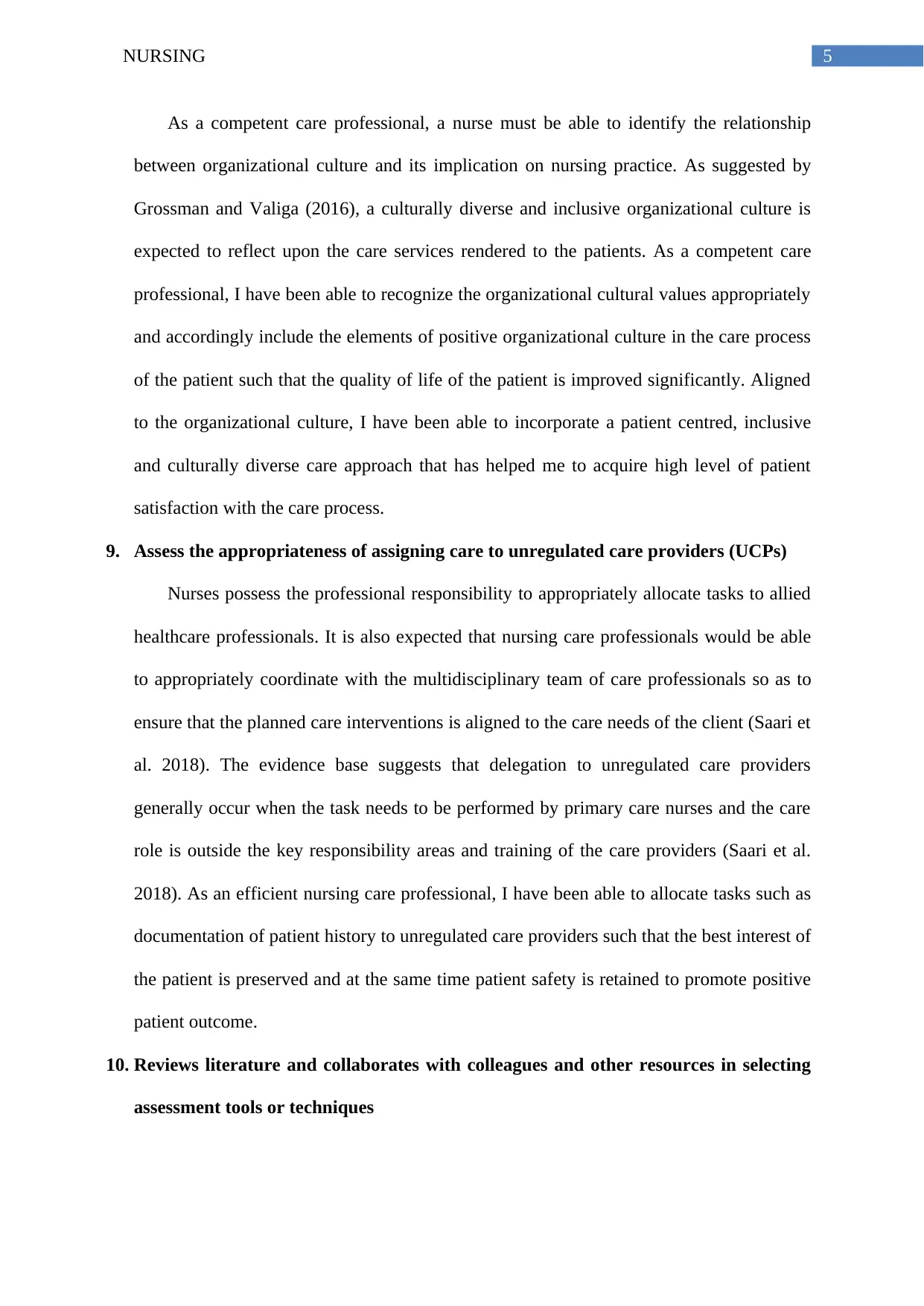
5NURSING
As a competent care professional, a nurse must be able to identify the relationship
between organizational culture and its implication on nursing practice. As suggested by
Grossman and Valiga (2016), a culturally diverse and inclusive organizational culture is
expected to reflect upon the care services rendered to the patients. As a competent care
professional, I have been able to recognize the organizational cultural values appropriately
and accordingly include the elements of positive organizational culture in the care process
of the patient such that the quality of life of the patient is improved significantly. Aligned
to the organizational culture, I have been able to incorporate a patient centred, inclusive
and culturally diverse care approach that has helped me to acquire high level of patient
satisfaction with the care process.
9. Assess the appropriateness of assigning care to unregulated care providers (UCPs)
Nurses possess the professional responsibility to appropriately allocate tasks to allied
healthcare professionals. It is also expected that nursing care professionals would be able
to appropriately coordinate with the multidisciplinary team of care professionals so as to
ensure that the planned care interventions is aligned to the care needs of the client (Saari et
al. 2018). The evidence base suggests that delegation to unregulated care providers
generally occur when the task needs to be performed by primary care nurses and the care
role is outside the key responsibility areas and training of the care providers (Saari et al.
2018). As an efficient nursing care professional, I have been able to allocate tasks such as
documentation of patient history to unregulated care providers such that the best interest of
the patient is preserved and at the same time patient safety is retained to promote positive
patient outcome.
10. Reviews literature and collaborates with colleagues and other resources in selecting
assessment tools or techniques
As a competent care professional, a nurse must be able to identify the relationship
between organizational culture and its implication on nursing practice. As suggested by
Grossman and Valiga (2016), a culturally diverse and inclusive organizational culture is
expected to reflect upon the care services rendered to the patients. As a competent care
professional, I have been able to recognize the organizational cultural values appropriately
and accordingly include the elements of positive organizational culture in the care process
of the patient such that the quality of life of the patient is improved significantly. Aligned
to the organizational culture, I have been able to incorporate a patient centred, inclusive
and culturally diverse care approach that has helped me to acquire high level of patient
satisfaction with the care process.
9. Assess the appropriateness of assigning care to unregulated care providers (UCPs)
Nurses possess the professional responsibility to appropriately allocate tasks to allied
healthcare professionals. It is also expected that nursing care professionals would be able
to appropriately coordinate with the multidisciplinary team of care professionals so as to
ensure that the planned care interventions is aligned to the care needs of the client (Saari et
al. 2018). The evidence base suggests that delegation to unregulated care providers
generally occur when the task needs to be performed by primary care nurses and the care
role is outside the key responsibility areas and training of the care providers (Saari et al.
2018). As an efficient nursing care professional, I have been able to allocate tasks such as
documentation of patient history to unregulated care providers such that the best interest of
the patient is preserved and at the same time patient safety is retained to promote positive
patient outcome.
10. Reviews literature and collaborates with colleagues and other resources in selecting
assessment tools or techniques
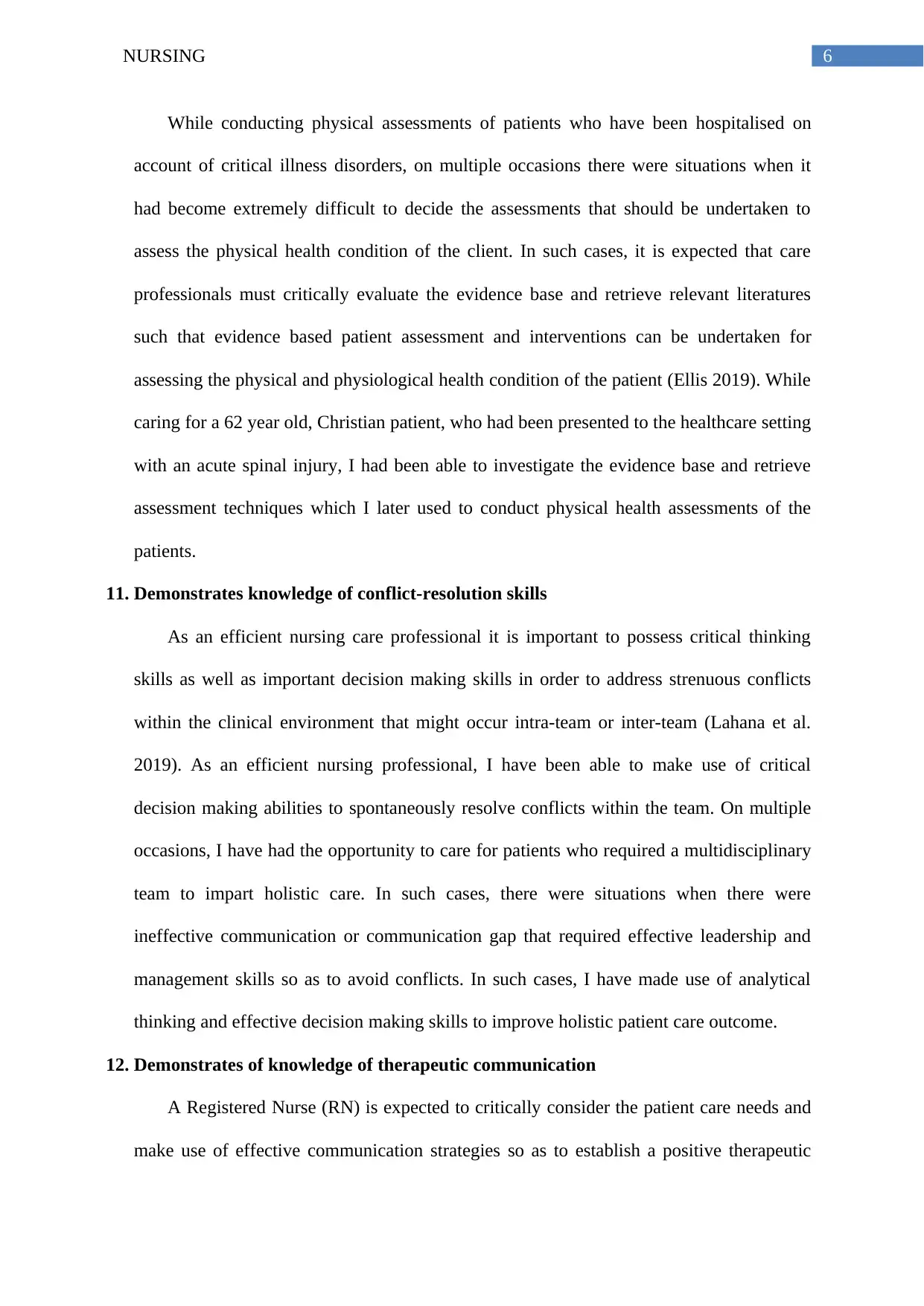
6NURSING
While conducting physical assessments of patients who have been hospitalised on
account of critical illness disorders, on multiple occasions there were situations when it
had become extremely difficult to decide the assessments that should be undertaken to
assess the physical health condition of the client. In such cases, it is expected that care
professionals must critically evaluate the evidence base and retrieve relevant literatures
such that evidence based patient assessment and interventions can be undertaken for
assessing the physical and physiological health condition of the patient (Ellis 2019). While
caring for a 62 year old, Christian patient, who had been presented to the healthcare setting
with an acute spinal injury, I had been able to investigate the evidence base and retrieve
assessment techniques which I later used to conduct physical health assessments of the
patients.
11. Demonstrates knowledge of conflict-resolution skills
As an efficient nursing care professional it is important to possess critical thinking
skills as well as important decision making skills in order to address strenuous conflicts
within the clinical environment that might occur intra-team or inter-team (Lahana et al.
2019). As an efficient nursing professional, I have been able to make use of critical
decision making abilities to spontaneously resolve conflicts within the team. On multiple
occasions, I have had the opportunity to care for patients who required a multidisciplinary
team to impart holistic care. In such cases, there were situations when there were
ineffective communication or communication gap that required effective leadership and
management skills so as to avoid conflicts. In such cases, I have made use of analytical
thinking and effective decision making skills to improve holistic patient care outcome.
12. Demonstrates of knowledge of therapeutic communication
A Registered Nurse (RN) is expected to critically consider the patient care needs and
make use of effective communication strategies so as to establish a positive therapeutic
While conducting physical assessments of patients who have been hospitalised on
account of critical illness disorders, on multiple occasions there were situations when it
had become extremely difficult to decide the assessments that should be undertaken to
assess the physical health condition of the client. In such cases, it is expected that care
professionals must critically evaluate the evidence base and retrieve relevant literatures
such that evidence based patient assessment and interventions can be undertaken for
assessing the physical and physiological health condition of the patient (Ellis 2019). While
caring for a 62 year old, Christian patient, who had been presented to the healthcare setting
with an acute spinal injury, I had been able to investigate the evidence base and retrieve
assessment techniques which I later used to conduct physical health assessments of the
patients.
11. Demonstrates knowledge of conflict-resolution skills
As an efficient nursing care professional it is important to possess critical thinking
skills as well as important decision making skills in order to address strenuous conflicts
within the clinical environment that might occur intra-team or inter-team (Lahana et al.
2019). As an efficient nursing professional, I have been able to make use of critical
decision making abilities to spontaneously resolve conflicts within the team. On multiple
occasions, I have had the opportunity to care for patients who required a multidisciplinary
team to impart holistic care. In such cases, there were situations when there were
ineffective communication or communication gap that required effective leadership and
management skills so as to avoid conflicts. In such cases, I have made use of analytical
thinking and effective decision making skills to improve holistic patient care outcome.
12. Demonstrates of knowledge of therapeutic communication
A Registered Nurse (RN) is expected to critically consider the patient care needs and
make use of effective communication strategies so as to establish a positive therapeutic
Paraphrase This Document
Need a fresh take? Get an instant paraphrase of this document with our AI Paraphraser
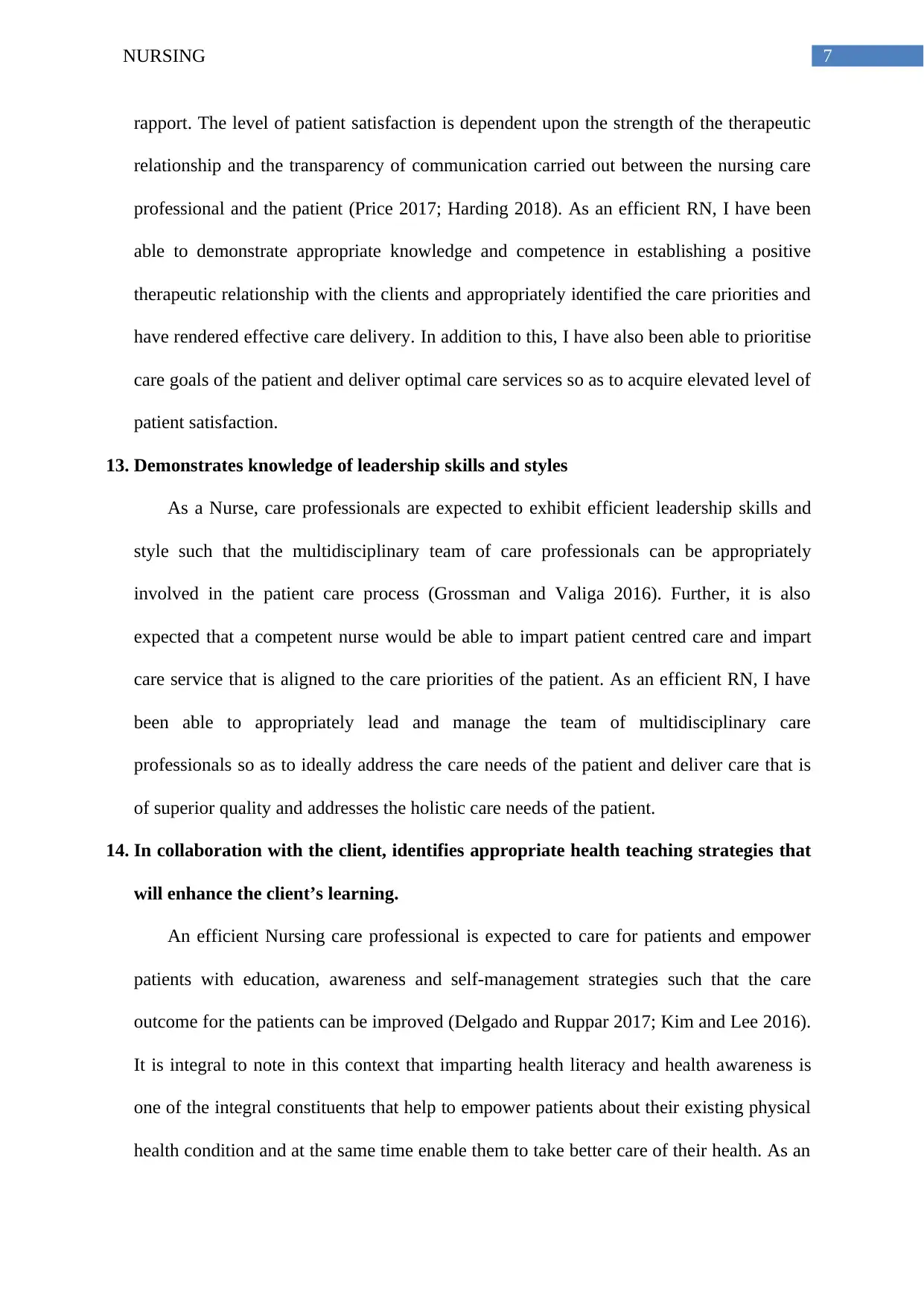
7NURSING
rapport. The level of patient satisfaction is dependent upon the strength of the therapeutic
relationship and the transparency of communication carried out between the nursing care
professional and the patient (Price 2017; Harding 2018). As an efficient RN, I have been
able to demonstrate appropriate knowledge and competence in establishing a positive
therapeutic relationship with the clients and appropriately identified the care priorities and
have rendered effective care delivery. In addition to this, I have also been able to prioritise
care goals of the patient and deliver optimal care services so as to acquire elevated level of
patient satisfaction.
13. Demonstrates knowledge of leadership skills and styles
As a Nurse, care professionals are expected to exhibit efficient leadership skills and
style such that the multidisciplinary team of care professionals can be appropriately
involved in the patient care process (Grossman and Valiga 2016). Further, it is also
expected that a competent nurse would be able to impart patient centred care and impart
care service that is aligned to the care priorities of the patient. As an efficient RN, I have
been able to appropriately lead and manage the team of multidisciplinary care
professionals so as to ideally address the care needs of the patient and deliver care that is
of superior quality and addresses the holistic care needs of the patient.
14. In collaboration with the client, identifies appropriate health teaching strategies that
will enhance the client’s learning.
An efficient Nursing care professional is expected to care for patients and empower
patients with education, awareness and self-management strategies such that the care
outcome for the patients can be improved (Delgado and Ruppar 2017; Kim and Lee 2016).
It is integral to note in this context that imparting health literacy and health awareness is
one of the integral constituents that help to empower patients about their existing physical
health condition and at the same time enable them to take better care of their health. As an
rapport. The level of patient satisfaction is dependent upon the strength of the therapeutic
relationship and the transparency of communication carried out between the nursing care
professional and the patient (Price 2017; Harding 2018). As an efficient RN, I have been
able to demonstrate appropriate knowledge and competence in establishing a positive
therapeutic relationship with the clients and appropriately identified the care priorities and
have rendered effective care delivery. In addition to this, I have also been able to prioritise
care goals of the patient and deliver optimal care services so as to acquire elevated level of
patient satisfaction.
13. Demonstrates knowledge of leadership skills and styles
As a Nurse, care professionals are expected to exhibit efficient leadership skills and
style such that the multidisciplinary team of care professionals can be appropriately
involved in the patient care process (Grossman and Valiga 2016). Further, it is also
expected that a competent nurse would be able to impart patient centred care and impart
care service that is aligned to the care priorities of the patient. As an efficient RN, I have
been able to appropriately lead and manage the team of multidisciplinary care
professionals so as to ideally address the care needs of the patient and deliver care that is
of superior quality and addresses the holistic care needs of the patient.
14. In collaboration with the client, identifies appropriate health teaching strategies that
will enhance the client’s learning.
An efficient Nursing care professional is expected to care for patients and empower
patients with education, awareness and self-management strategies such that the care
outcome for the patients can be improved (Delgado and Ruppar 2017; Kim and Lee 2016).
It is integral to note in this context that imparting health literacy and health awareness is
one of the integral constituents that help to empower patients about their existing physical
health condition and at the same time enable them to take better care of their health. As an
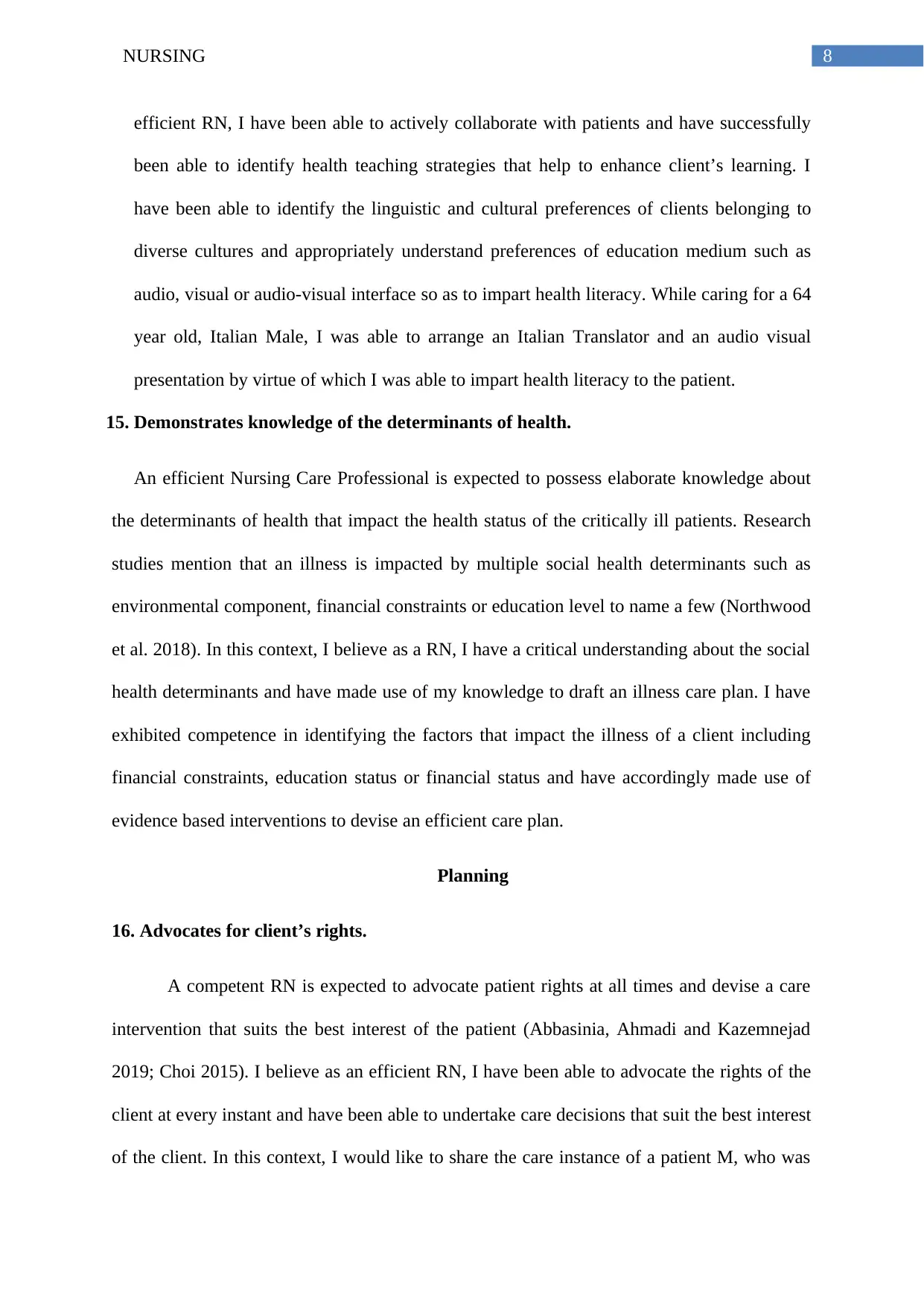
8NURSING
efficient RN, I have been able to actively collaborate with patients and have successfully
been able to identify health teaching strategies that help to enhance client’s learning. I
have been able to identify the linguistic and cultural preferences of clients belonging to
diverse cultures and appropriately understand preferences of education medium such as
audio, visual or audio-visual interface so as to impart health literacy. While caring for a 64
year old, Italian Male, I was able to arrange an Italian Translator and an audio visual
presentation by virtue of which I was able to impart health literacy to the patient.
15. Demonstrates knowledge of the determinants of health.
An efficient Nursing Care Professional is expected to possess elaborate knowledge about
the determinants of health that impact the health status of the critically ill patients. Research
studies mention that an illness is impacted by multiple social health determinants such as
environmental component, financial constraints or education level to name a few (Northwood
et al. 2018). In this context, I believe as a RN, I have a critical understanding about the social
health determinants and have made use of my knowledge to draft an illness care plan. I have
exhibited competence in identifying the factors that impact the illness of a client including
financial constraints, education status or financial status and have accordingly made use of
evidence based interventions to devise an efficient care plan.
Planning
16. Advocates for client’s rights.
A competent RN is expected to advocate patient rights at all times and devise a care
intervention that suits the best interest of the patient (Abbasinia, Ahmadi and Kazemnejad
2019; Choi 2015). I believe as an efficient RN, I have been able to advocate the rights of the
client at every instant and have been able to undertake care decisions that suit the best interest
of the client. In this context, I would like to share the care instance of a patient M, who was
efficient RN, I have been able to actively collaborate with patients and have successfully
been able to identify health teaching strategies that help to enhance client’s learning. I
have been able to identify the linguistic and cultural preferences of clients belonging to
diverse cultures and appropriately understand preferences of education medium such as
audio, visual or audio-visual interface so as to impart health literacy. While caring for a 64
year old, Italian Male, I was able to arrange an Italian Translator and an audio visual
presentation by virtue of which I was able to impart health literacy to the patient.
15. Demonstrates knowledge of the determinants of health.
An efficient Nursing Care Professional is expected to possess elaborate knowledge about
the determinants of health that impact the health status of the critically ill patients. Research
studies mention that an illness is impacted by multiple social health determinants such as
environmental component, financial constraints or education level to name a few (Northwood
et al. 2018). In this context, I believe as a RN, I have a critical understanding about the social
health determinants and have made use of my knowledge to draft an illness care plan. I have
exhibited competence in identifying the factors that impact the illness of a client including
financial constraints, education status or financial status and have accordingly made use of
evidence based interventions to devise an efficient care plan.
Planning
16. Advocates for client’s rights.
A competent RN is expected to advocate patient rights at all times and devise a care
intervention that suits the best interest of the patient (Abbasinia, Ahmadi and Kazemnejad
2019; Choi 2015). I believe as an efficient RN, I have been able to advocate the rights of the
client at every instant and have been able to undertake care decisions that suit the best interest
of the client. In this context, I would like to share the care instance of a patient M, who was
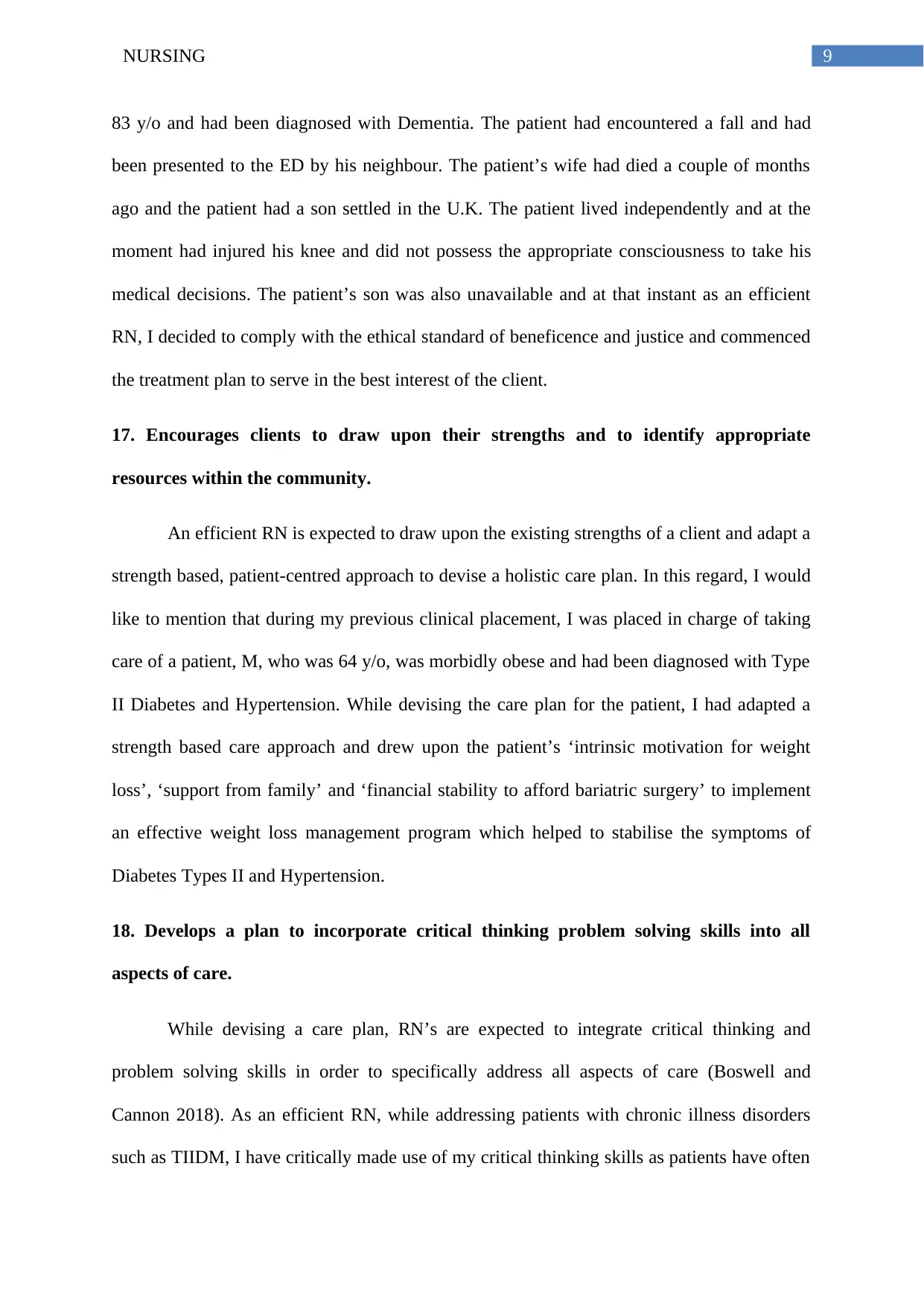
9NURSING
83 y/o and had been diagnosed with Dementia. The patient had encountered a fall and had
been presented to the ED by his neighbour. The patient’s wife had died a couple of months
ago and the patient had a son settled in the U.K. The patient lived independently and at the
moment had injured his knee and did not possess the appropriate consciousness to take his
medical decisions. The patient’s son was also unavailable and at that instant as an efficient
RN, I decided to comply with the ethical standard of beneficence and justice and commenced
the treatment plan to serve in the best interest of the client.
17. Encourages clients to draw upon their strengths and to identify appropriate
resources within the community.
An efficient RN is expected to draw upon the existing strengths of a client and adapt a
strength based, patient-centred approach to devise a holistic care plan. In this regard, I would
like to mention that during my previous clinical placement, I was placed in charge of taking
care of a patient, M, who was 64 y/o, was morbidly obese and had been diagnosed with Type
II Diabetes and Hypertension. While devising the care plan for the patient, I had adapted a
strength based care approach and drew upon the patient’s ‘intrinsic motivation for weight
loss’, ‘support from family’ and ‘financial stability to afford bariatric surgery’ to implement
an effective weight loss management program which helped to stabilise the symptoms of
Diabetes Types II and Hypertension.
18. Develops a plan to incorporate critical thinking problem solving skills into all
aspects of care.
While devising a care plan, RN’s are expected to integrate critical thinking and
problem solving skills in order to specifically address all aspects of care (Boswell and
Cannon 2018). As an efficient RN, while addressing patients with chronic illness disorders
such as TIIDM, I have critically made use of my critical thinking skills as patients have often
83 y/o and had been diagnosed with Dementia. The patient had encountered a fall and had
been presented to the ED by his neighbour. The patient’s wife had died a couple of months
ago and the patient had a son settled in the U.K. The patient lived independently and at the
moment had injured his knee and did not possess the appropriate consciousness to take his
medical decisions. The patient’s son was also unavailable and at that instant as an efficient
RN, I decided to comply with the ethical standard of beneficence and justice and commenced
the treatment plan to serve in the best interest of the client.
17. Encourages clients to draw upon their strengths and to identify appropriate
resources within the community.
An efficient RN is expected to draw upon the existing strengths of a client and adapt a
strength based, patient-centred approach to devise a holistic care plan. In this regard, I would
like to mention that during my previous clinical placement, I was placed in charge of taking
care of a patient, M, who was 64 y/o, was morbidly obese and had been diagnosed with Type
II Diabetes and Hypertension. While devising the care plan for the patient, I had adapted a
strength based care approach and drew upon the patient’s ‘intrinsic motivation for weight
loss’, ‘support from family’ and ‘financial stability to afford bariatric surgery’ to implement
an effective weight loss management program which helped to stabilise the symptoms of
Diabetes Types II and Hypertension.
18. Develops a plan to incorporate critical thinking problem solving skills into all
aspects of care.
While devising a care plan, RN’s are expected to integrate critical thinking and
problem solving skills in order to specifically address all aspects of care (Boswell and
Cannon 2018). As an efficient RN, while addressing patients with chronic illness disorders
such as TIIDM, I have critically made use of my critical thinking skills as patients have often
Secure Best Marks with AI Grader
Need help grading? Try our AI Grader for instant feedback on your assignments.
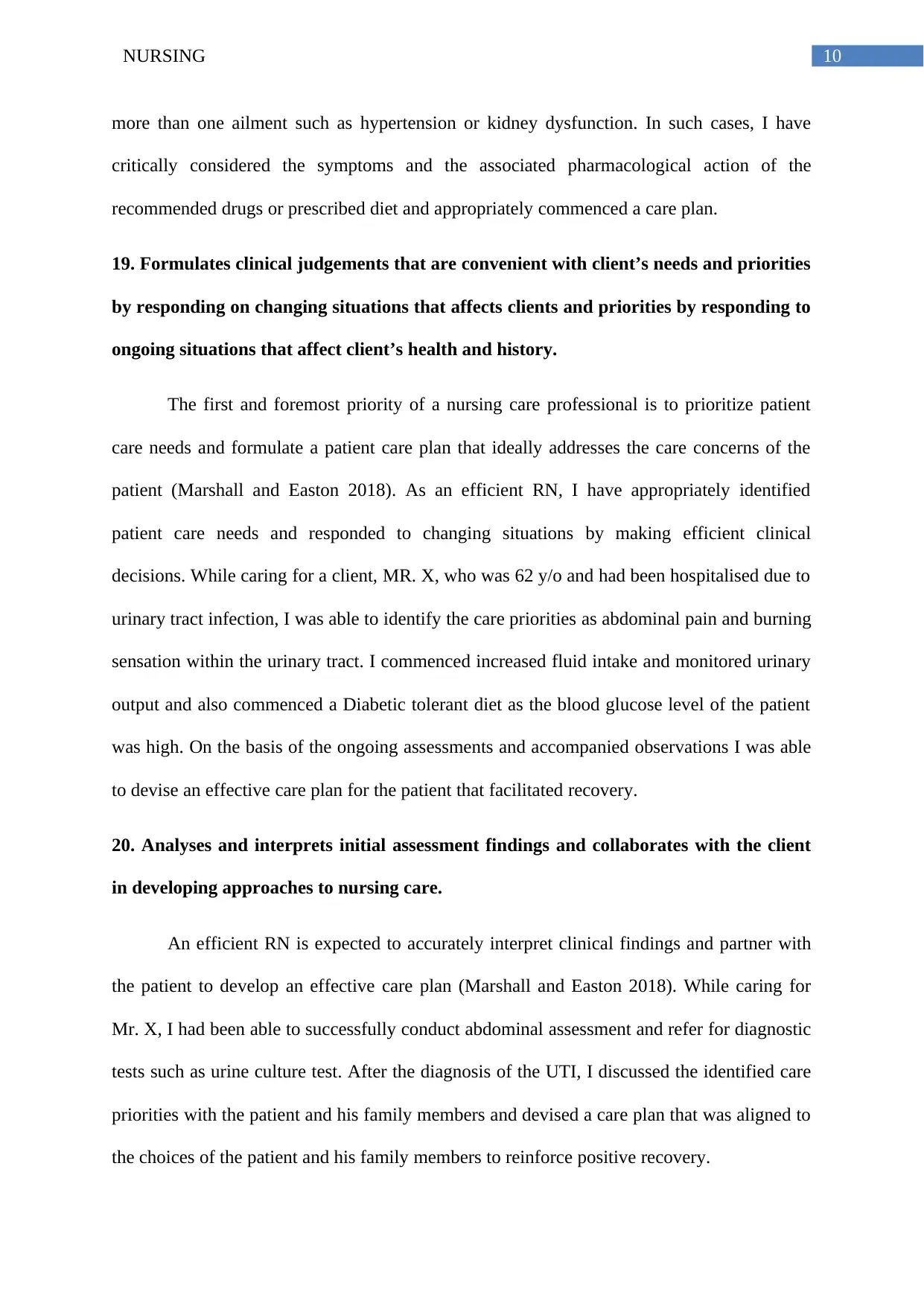
10NURSING
more than one ailment such as hypertension or kidney dysfunction. In such cases, I have
critically considered the symptoms and the associated pharmacological action of the
recommended drugs or prescribed diet and appropriately commenced a care plan.
19. Formulates clinical judgements that are convenient with client’s needs and priorities
by responding on changing situations that affects clients and priorities by responding to
ongoing situations that affect client’s health and history.
The first and foremost priority of a nursing care professional is to prioritize patient
care needs and formulate a patient care plan that ideally addresses the care concerns of the
patient (Marshall and Easton 2018). As an efficient RN, I have appropriately identified
patient care needs and responded to changing situations by making efficient clinical
decisions. While caring for a client, MR. X, who was 62 y/o and had been hospitalised due to
urinary tract infection, I was able to identify the care priorities as abdominal pain and burning
sensation within the urinary tract. I commenced increased fluid intake and monitored urinary
output and also commenced a Diabetic tolerant diet as the blood glucose level of the patient
was high. On the basis of the ongoing assessments and accompanied observations I was able
to devise an effective care plan for the patient that facilitated recovery.
20. Analyses and interprets initial assessment findings and collaborates with the client
in developing approaches to nursing care.
An efficient RN is expected to accurately interpret clinical findings and partner with
the patient to develop an effective care plan (Marshall and Easton 2018). While caring for
Mr. X, I had been able to successfully conduct abdominal assessment and refer for diagnostic
tests such as urine culture test. After the diagnosis of the UTI, I discussed the identified care
priorities with the patient and his family members and devised a care plan that was aligned to
the choices of the patient and his family members to reinforce positive recovery.
more than one ailment such as hypertension or kidney dysfunction. In such cases, I have
critically considered the symptoms and the associated pharmacological action of the
recommended drugs or prescribed diet and appropriately commenced a care plan.
19. Formulates clinical judgements that are convenient with client’s needs and priorities
by responding on changing situations that affects clients and priorities by responding to
ongoing situations that affect client’s health and history.
The first and foremost priority of a nursing care professional is to prioritize patient
care needs and formulate a patient care plan that ideally addresses the care concerns of the
patient (Marshall and Easton 2018). As an efficient RN, I have appropriately identified
patient care needs and responded to changing situations by making efficient clinical
decisions. While caring for a client, MR. X, who was 62 y/o and had been hospitalised due to
urinary tract infection, I was able to identify the care priorities as abdominal pain and burning
sensation within the urinary tract. I commenced increased fluid intake and monitored urinary
output and also commenced a Diabetic tolerant diet as the blood glucose level of the patient
was high. On the basis of the ongoing assessments and accompanied observations I was able
to devise an effective care plan for the patient that facilitated recovery.
20. Analyses and interprets initial assessment findings and collaborates with the client
in developing approaches to nursing care.
An efficient RN is expected to accurately interpret clinical findings and partner with
the patient to develop an effective care plan (Marshall and Easton 2018). While caring for
Mr. X, I had been able to successfully conduct abdominal assessment and refer for diagnostic
tests such as urine culture test. After the diagnosis of the UTI, I discussed the identified care
priorities with the patient and his family members and devised a care plan that was aligned to
the choices of the patient and his family members to reinforce positive recovery.
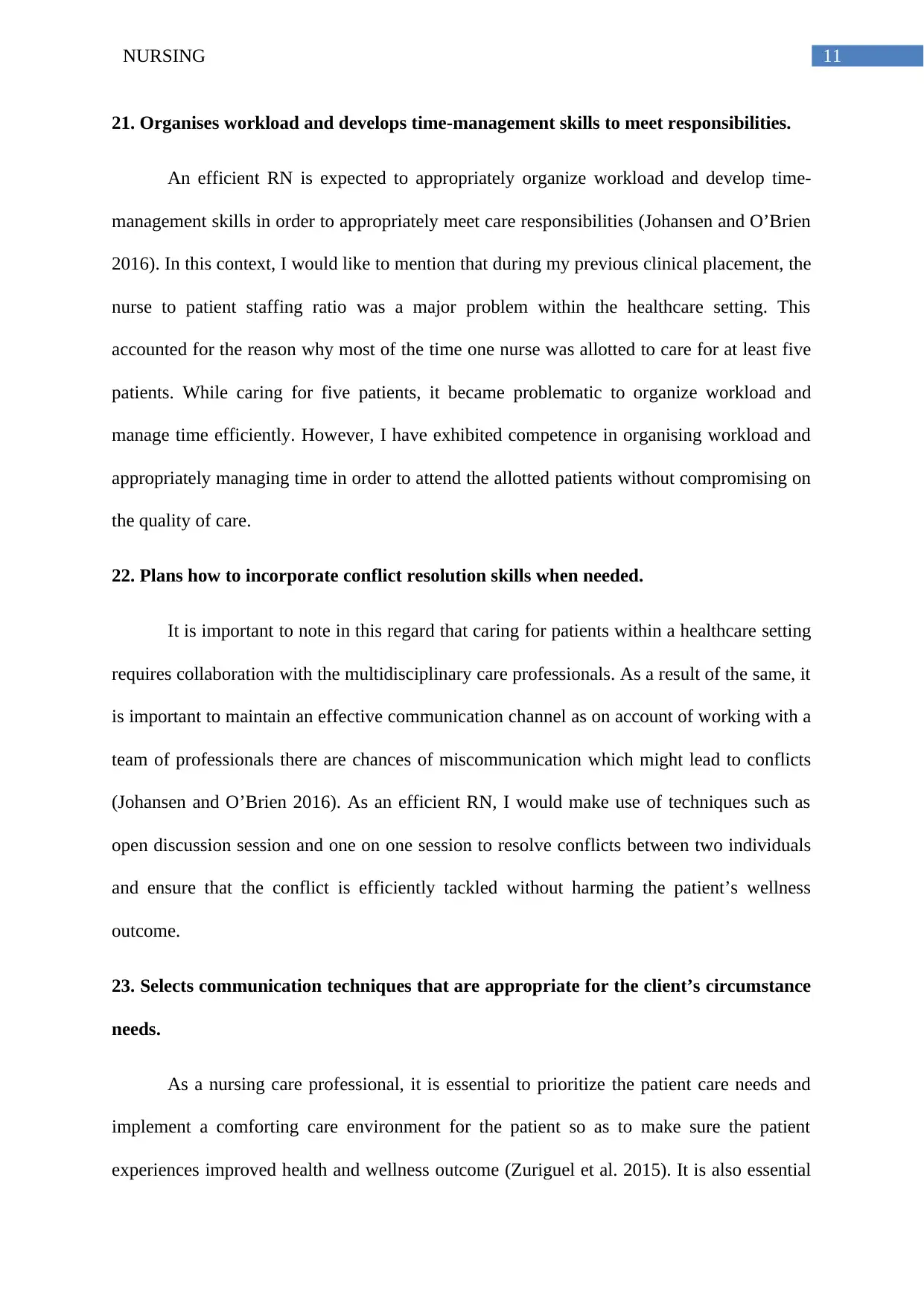
11NURSING
21. Organises workload and develops time-management skills to meet responsibilities.
An efficient RN is expected to appropriately organize workload and develop time-
management skills in order to appropriately meet care responsibilities (Johansen and O’Brien
2016). In this context, I would like to mention that during my previous clinical placement, the
nurse to patient staffing ratio was a major problem within the healthcare setting. This
accounted for the reason why most of the time one nurse was allotted to care for at least five
patients. While caring for five patients, it became problematic to organize workload and
manage time efficiently. However, I have exhibited competence in organising workload and
appropriately managing time in order to attend the allotted patients without compromising on
the quality of care.
22. Plans how to incorporate conflict resolution skills when needed.
It is important to note in this regard that caring for patients within a healthcare setting
requires collaboration with the multidisciplinary care professionals. As a result of the same, it
is important to maintain an effective communication channel as on account of working with a
team of professionals there are chances of miscommunication which might lead to conflicts
(Johansen and O’Brien 2016). As an efficient RN, I would make use of techniques such as
open discussion session and one on one session to resolve conflicts between two individuals
and ensure that the conflict is efficiently tackled without harming the patient’s wellness
outcome.
23. Selects communication techniques that are appropriate for the client’s circumstance
needs.
As a nursing care professional, it is essential to prioritize the patient care needs and
implement a comforting care environment for the patient so as to make sure the patient
experiences improved health and wellness outcome (Zuriguel et al. 2015). It is also essential
21. Organises workload and develops time-management skills to meet responsibilities.
An efficient RN is expected to appropriately organize workload and develop time-
management skills in order to appropriately meet care responsibilities (Johansen and O’Brien
2016). In this context, I would like to mention that during my previous clinical placement, the
nurse to patient staffing ratio was a major problem within the healthcare setting. This
accounted for the reason why most of the time one nurse was allotted to care for at least five
patients. While caring for five patients, it became problematic to organize workload and
manage time efficiently. However, I have exhibited competence in organising workload and
appropriately managing time in order to attend the allotted patients without compromising on
the quality of care.
22. Plans how to incorporate conflict resolution skills when needed.
It is important to note in this regard that caring for patients within a healthcare setting
requires collaboration with the multidisciplinary care professionals. As a result of the same, it
is important to maintain an effective communication channel as on account of working with a
team of professionals there are chances of miscommunication which might lead to conflicts
(Johansen and O’Brien 2016). As an efficient RN, I would make use of techniques such as
open discussion session and one on one session to resolve conflicts between two individuals
and ensure that the conflict is efficiently tackled without harming the patient’s wellness
outcome.
23. Selects communication techniques that are appropriate for the client’s circumstance
needs.
As a nursing care professional, it is essential to prioritize the patient care needs and
implement a comforting care environment for the patient so as to make sure the patient
experiences improved health and wellness outcome (Zuriguel et al. 2015). It is also essential
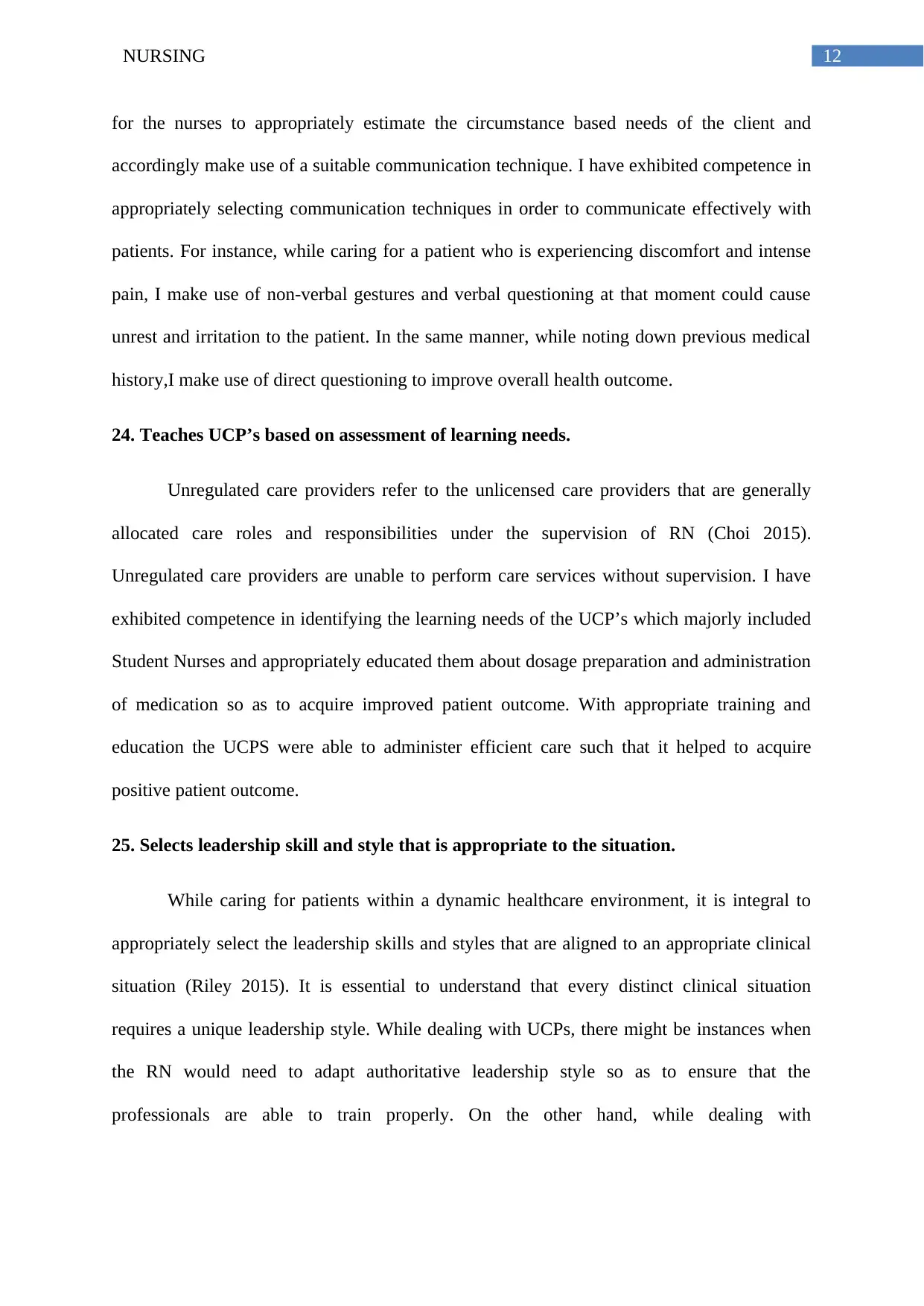
12NURSING
for the nurses to appropriately estimate the circumstance based needs of the client and
accordingly make use of a suitable communication technique. I have exhibited competence in
appropriately selecting communication techniques in order to communicate effectively with
patients. For instance, while caring for a patient who is experiencing discomfort and intense
pain, I make use of non-verbal gestures and verbal questioning at that moment could cause
unrest and irritation to the patient. In the same manner, while noting down previous medical
history,I make use of direct questioning to improve overall health outcome.
24. Teaches UCP’s based on assessment of learning needs.
Unregulated care providers refer to the unlicensed care providers that are generally
allocated care roles and responsibilities under the supervision of RN (Choi 2015).
Unregulated care providers are unable to perform care services without supervision. I have
exhibited competence in identifying the learning needs of the UCP’s which majorly included
Student Nurses and appropriately educated them about dosage preparation and administration
of medication so as to acquire improved patient outcome. With appropriate training and
education the UCPS were able to administer efficient care such that it helped to acquire
positive patient outcome.
25. Selects leadership skill and style that is appropriate to the situation.
While caring for patients within a dynamic healthcare environment, it is integral to
appropriately select the leadership skills and styles that are aligned to an appropriate clinical
situation (Riley 2015). It is essential to understand that every distinct clinical situation
requires a unique leadership style. While dealing with UCPs, there might be instances when
the RN would need to adapt authoritative leadership style so as to ensure that the
professionals are able to train properly. On the other hand, while dealing with
for the nurses to appropriately estimate the circumstance based needs of the client and
accordingly make use of a suitable communication technique. I have exhibited competence in
appropriately selecting communication techniques in order to communicate effectively with
patients. For instance, while caring for a patient who is experiencing discomfort and intense
pain, I make use of non-verbal gestures and verbal questioning at that moment could cause
unrest and irritation to the patient. In the same manner, while noting down previous medical
history,I make use of direct questioning to improve overall health outcome.
24. Teaches UCP’s based on assessment of learning needs.
Unregulated care providers refer to the unlicensed care providers that are generally
allocated care roles and responsibilities under the supervision of RN (Choi 2015).
Unregulated care providers are unable to perform care services without supervision. I have
exhibited competence in identifying the learning needs of the UCP’s which majorly included
Student Nurses and appropriately educated them about dosage preparation and administration
of medication so as to acquire improved patient outcome. With appropriate training and
education the UCPS were able to administer efficient care such that it helped to acquire
positive patient outcome.
25. Selects leadership skill and style that is appropriate to the situation.
While caring for patients within a dynamic healthcare environment, it is integral to
appropriately select the leadership skills and styles that are aligned to an appropriate clinical
situation (Riley 2015). It is essential to understand that every distinct clinical situation
requires a unique leadership style. While dealing with UCPs, there might be instances when
the RN would need to adapt authoritative leadership style so as to ensure that the
professionals are able to train properly. On the other hand, while dealing with
Paraphrase This Document
Need a fresh take? Get an instant paraphrase of this document with our AI Paraphraser
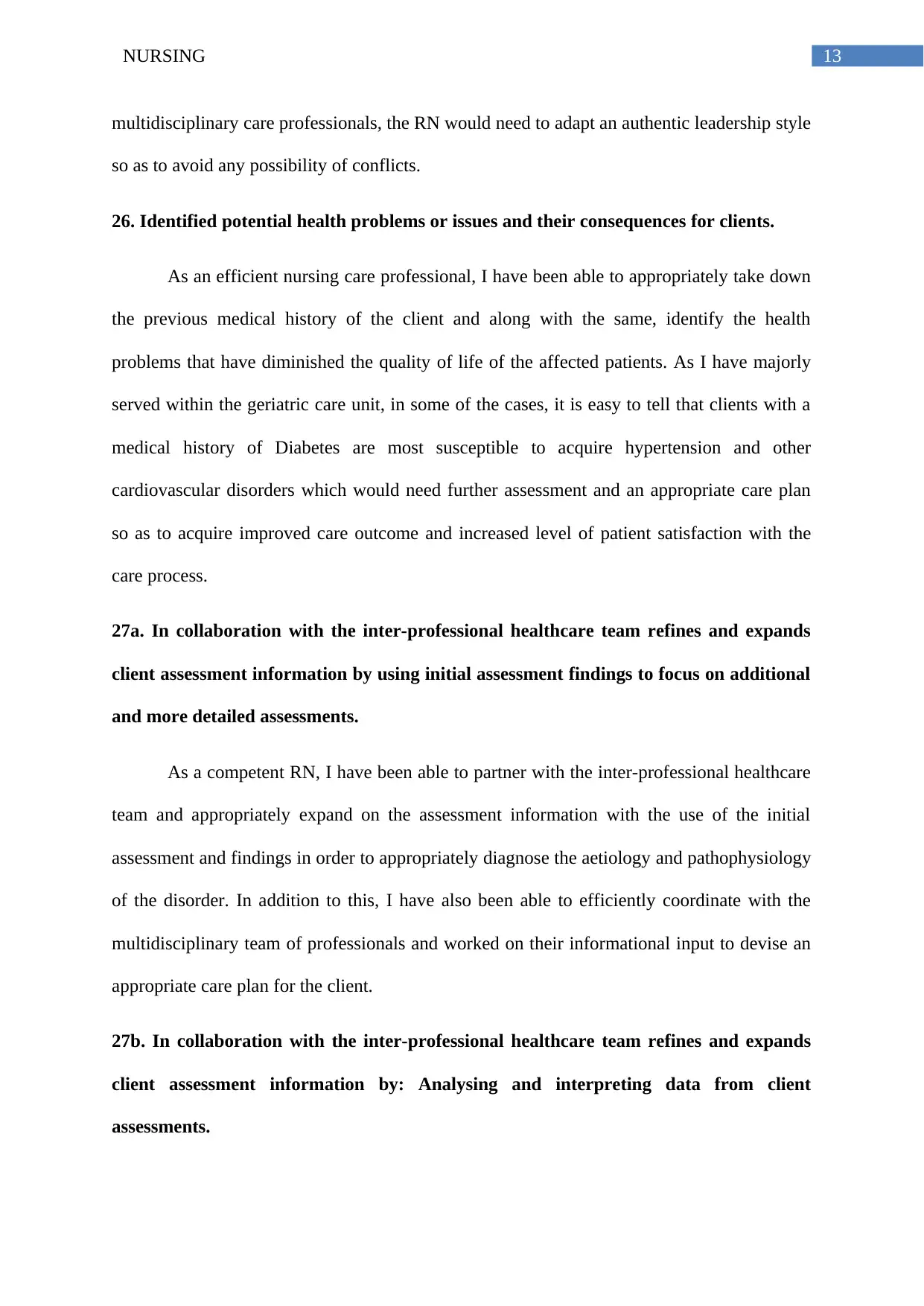
13NURSING
multidisciplinary care professionals, the RN would need to adapt an authentic leadership style
so as to avoid any possibility of conflicts.
26. Identified potential health problems or issues and their consequences for clients.
As an efficient nursing care professional, I have been able to appropriately take down
the previous medical history of the client and along with the same, identify the health
problems that have diminished the quality of life of the affected patients. As I have majorly
served within the geriatric care unit, in some of the cases, it is easy to tell that clients with a
medical history of Diabetes are most susceptible to acquire hypertension and other
cardiovascular disorders which would need further assessment and an appropriate care plan
so as to acquire improved care outcome and increased level of patient satisfaction with the
care process.
27a. In collaboration with the inter-professional healthcare team refines and expands
client assessment information by using initial assessment findings to focus on additional
and more detailed assessments.
As a competent RN, I have been able to partner with the inter-professional healthcare
team and appropriately expand on the assessment information with the use of the initial
assessment and findings in order to appropriately diagnose the aetiology and pathophysiology
of the disorder. In addition to this, I have also been able to efficiently coordinate with the
multidisciplinary team of professionals and worked on their informational input to devise an
appropriate care plan for the client.
27b. In collaboration with the inter-professional healthcare team refines and expands
client assessment information by: Analysing and interpreting data from client
assessments.
multidisciplinary care professionals, the RN would need to adapt an authentic leadership style
so as to avoid any possibility of conflicts.
26. Identified potential health problems or issues and their consequences for clients.
As an efficient nursing care professional, I have been able to appropriately take down
the previous medical history of the client and along with the same, identify the health
problems that have diminished the quality of life of the affected patients. As I have majorly
served within the geriatric care unit, in some of the cases, it is easy to tell that clients with a
medical history of Diabetes are most susceptible to acquire hypertension and other
cardiovascular disorders which would need further assessment and an appropriate care plan
so as to acquire improved care outcome and increased level of patient satisfaction with the
care process.
27a. In collaboration with the inter-professional healthcare team refines and expands
client assessment information by using initial assessment findings to focus on additional
and more detailed assessments.
As a competent RN, I have been able to partner with the inter-professional healthcare
team and appropriately expand on the assessment information with the use of the initial
assessment and findings in order to appropriately diagnose the aetiology and pathophysiology
of the disorder. In addition to this, I have also been able to efficiently coordinate with the
multidisciplinary team of professionals and worked on their informational input to devise an
appropriate care plan for the client.
27b. In collaboration with the inter-professional healthcare team refines and expands
client assessment information by: Analysing and interpreting data from client
assessments.
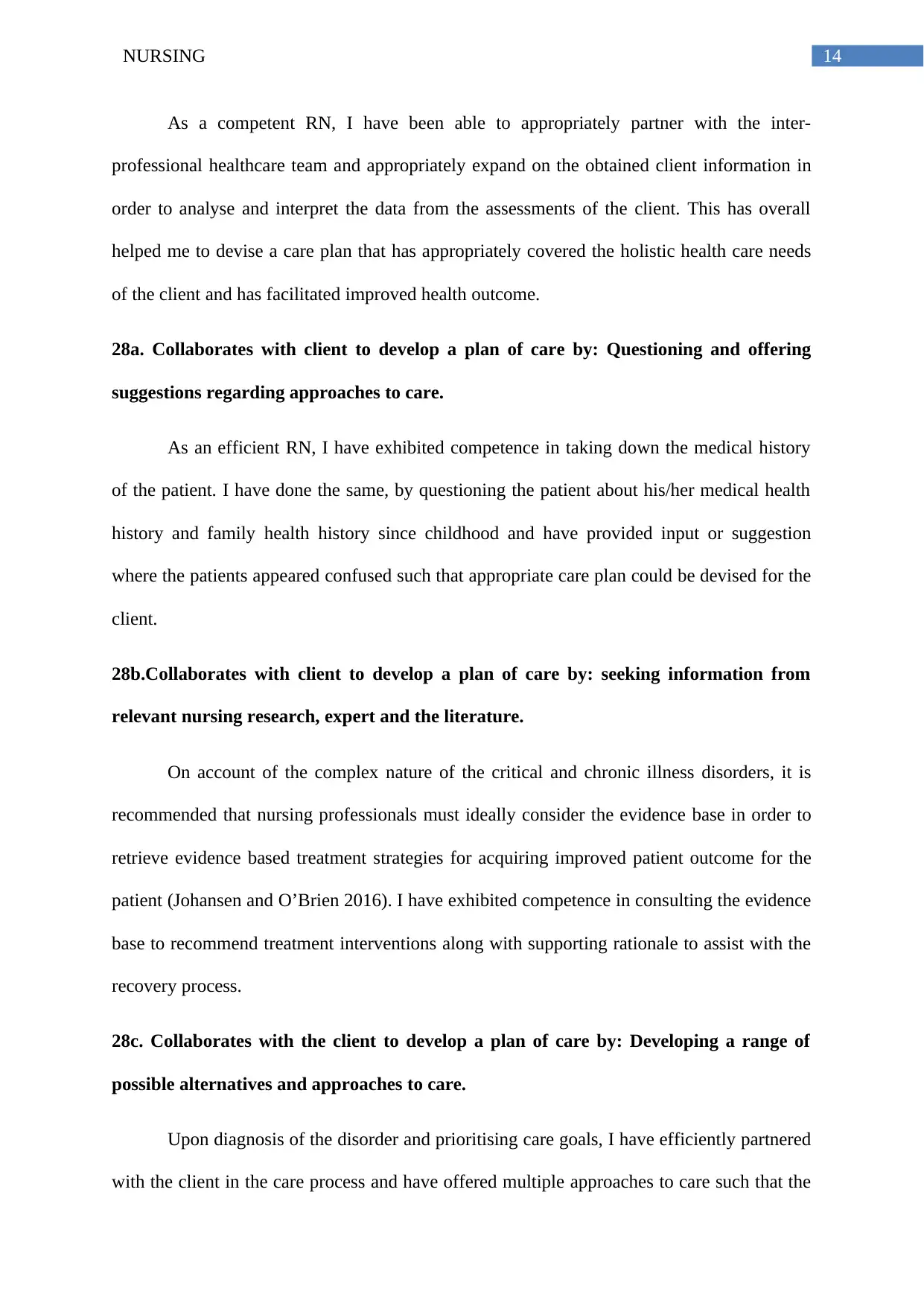
14NURSING
As a competent RN, I have been able to appropriately partner with the inter-
professional healthcare team and appropriately expand on the obtained client information in
order to analyse and interpret the data from the assessments of the client. This has overall
helped me to devise a care plan that has appropriately covered the holistic health care needs
of the client and has facilitated improved health outcome.
28a. Collaborates with client to develop a plan of care by: Questioning and offering
suggestions regarding approaches to care.
As an efficient RN, I have exhibited competence in taking down the medical history
of the patient. I have done the same, by questioning the patient about his/her medical health
history and family health history since childhood and have provided input or suggestion
where the patients appeared confused such that appropriate care plan could be devised for the
client.
28b.Collaborates with client to develop a plan of care by: seeking information from
relevant nursing research, expert and the literature.
On account of the complex nature of the critical and chronic illness disorders, it is
recommended that nursing professionals must ideally consider the evidence base in order to
retrieve evidence based treatment strategies for acquiring improved patient outcome for the
patient (Johansen and O’Brien 2016). I have exhibited competence in consulting the evidence
base to recommend treatment interventions along with supporting rationale to assist with the
recovery process.
28c. Collaborates with the client to develop a plan of care by: Developing a range of
possible alternatives and approaches to care.
Upon diagnosis of the disorder and prioritising care goals, I have efficiently partnered
with the client in the care process and have offered multiple approaches to care such that the
As a competent RN, I have been able to appropriately partner with the inter-
professional healthcare team and appropriately expand on the obtained client information in
order to analyse and interpret the data from the assessments of the client. This has overall
helped me to devise a care plan that has appropriately covered the holistic health care needs
of the client and has facilitated improved health outcome.
28a. Collaborates with client to develop a plan of care by: Questioning and offering
suggestions regarding approaches to care.
As an efficient RN, I have exhibited competence in taking down the medical history
of the patient. I have done the same, by questioning the patient about his/her medical health
history and family health history since childhood and have provided input or suggestion
where the patients appeared confused such that appropriate care plan could be devised for the
client.
28b.Collaborates with client to develop a plan of care by: seeking information from
relevant nursing research, expert and the literature.
On account of the complex nature of the critical and chronic illness disorders, it is
recommended that nursing professionals must ideally consider the evidence base in order to
retrieve evidence based treatment strategies for acquiring improved patient outcome for the
patient (Johansen and O’Brien 2016). I have exhibited competence in consulting the evidence
base to recommend treatment interventions along with supporting rationale to assist with the
recovery process.
28c. Collaborates with the client to develop a plan of care by: Developing a range of
possible alternatives and approaches to care.
Upon diagnosis of the disorder and prioritising care goals, I have efficiently partnered
with the client in the care process and have offered multiple approaches to care such that the
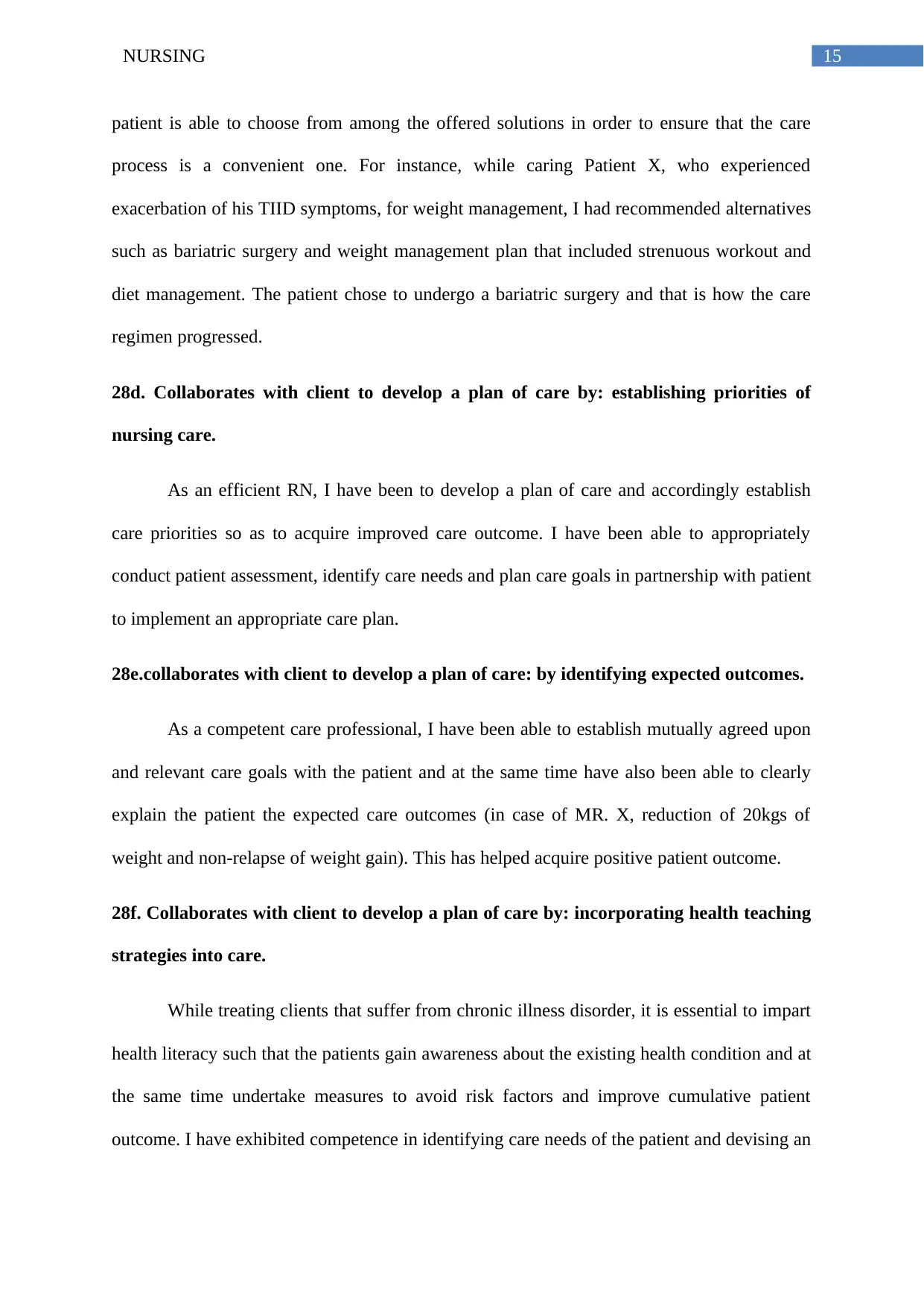
15NURSING
patient is able to choose from among the offered solutions in order to ensure that the care
process is a convenient one. For instance, while caring Patient X, who experienced
exacerbation of his TIID symptoms, for weight management, I had recommended alternatives
such as bariatric surgery and weight management plan that included strenuous workout and
diet management. The patient chose to undergo a bariatric surgery and that is how the care
regimen progressed.
28d. Collaborates with client to develop a plan of care by: establishing priorities of
nursing care.
As an efficient RN, I have been to develop a plan of care and accordingly establish
care priorities so as to acquire improved care outcome. I have been able to appropriately
conduct patient assessment, identify care needs and plan care goals in partnership with patient
to implement an appropriate care plan.
28e.collaborates with client to develop a plan of care: by identifying expected outcomes.
As a competent care professional, I have been able to establish mutually agreed upon
and relevant care goals with the patient and at the same time have also been able to clearly
explain the patient the expected care outcomes (in case of MR. X, reduction of 20kgs of
weight and non-relapse of weight gain). This has helped acquire positive patient outcome.
28f. Collaborates with client to develop a plan of care by: incorporating health teaching
strategies into care.
While treating clients that suffer from chronic illness disorder, it is essential to impart
health literacy such that the patients gain awareness about the existing health condition and at
the same time undertake measures to avoid risk factors and improve cumulative patient
outcome. I have exhibited competence in identifying care needs of the patient and devising an
patient is able to choose from among the offered solutions in order to ensure that the care
process is a convenient one. For instance, while caring Patient X, who experienced
exacerbation of his TIID symptoms, for weight management, I had recommended alternatives
such as bariatric surgery and weight management plan that included strenuous workout and
diet management. The patient chose to undergo a bariatric surgery and that is how the care
regimen progressed.
28d. Collaborates with client to develop a plan of care by: establishing priorities of
nursing care.
As an efficient RN, I have been to develop a plan of care and accordingly establish
care priorities so as to acquire improved care outcome. I have been able to appropriately
conduct patient assessment, identify care needs and plan care goals in partnership with patient
to implement an appropriate care plan.
28e.collaborates with client to develop a plan of care: by identifying expected outcomes.
As a competent care professional, I have been able to establish mutually agreed upon
and relevant care goals with the patient and at the same time have also been able to clearly
explain the patient the expected care outcomes (in case of MR. X, reduction of 20kgs of
weight and non-relapse of weight gain). This has helped acquire positive patient outcome.
28f. Collaborates with client to develop a plan of care by: incorporating health teaching
strategies into care.
While treating clients that suffer from chronic illness disorder, it is essential to impart
health literacy such that the patients gain awareness about the existing health condition and at
the same time undertake measures to avoid risk factors and improve cumulative patient
outcome. I have exhibited competence in identifying care needs of the patient and devising an
Secure Best Marks with AI Grader
Need help grading? Try our AI Grader for instant feedback on your assignments.
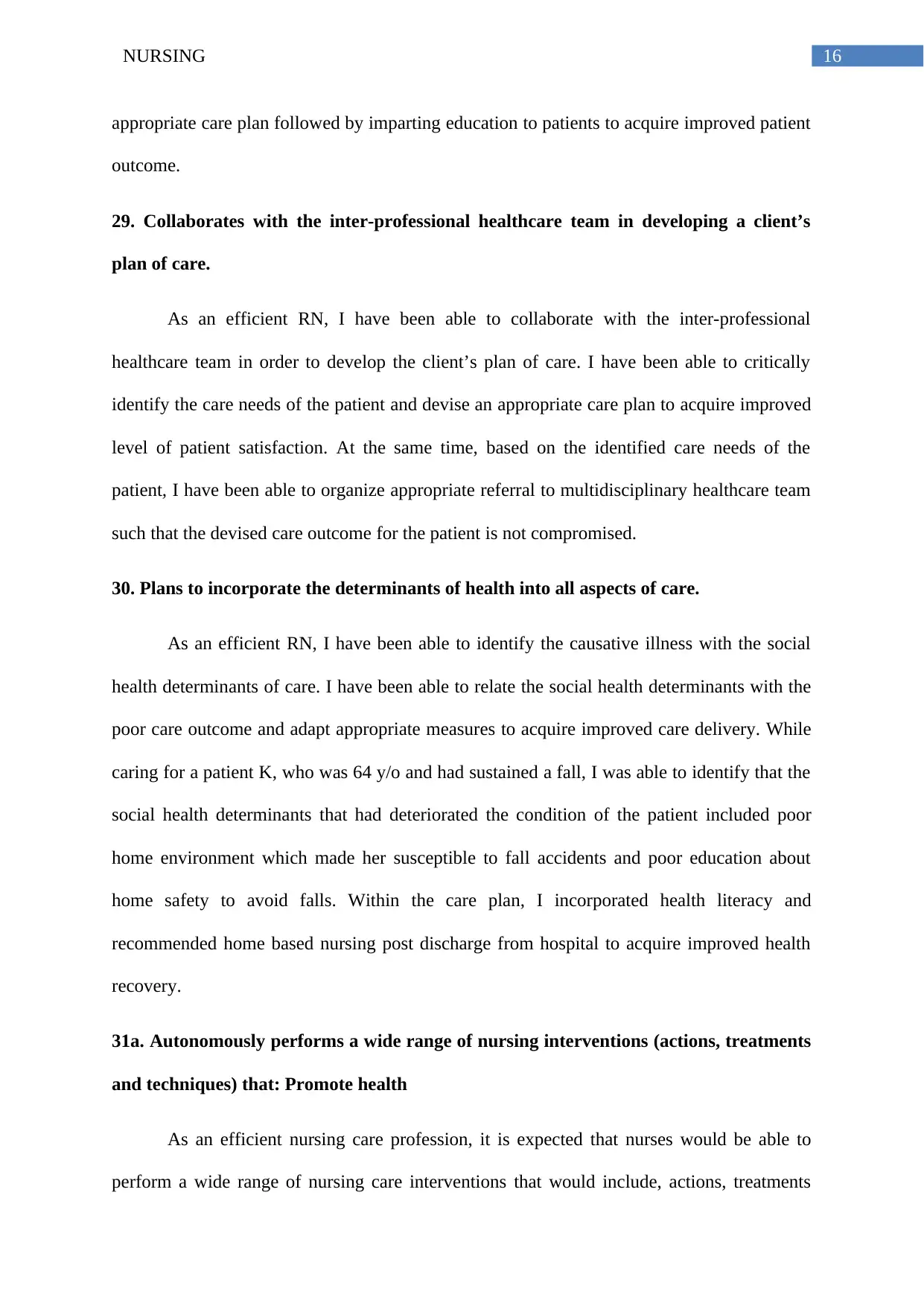
16NURSING
appropriate care plan followed by imparting education to patients to acquire improved patient
outcome.
29. Collaborates with the inter-professional healthcare team in developing a client’s
plan of care.
As an efficient RN, I have been able to collaborate with the inter-professional
healthcare team in order to develop the client’s plan of care. I have been able to critically
identify the care needs of the patient and devise an appropriate care plan to acquire improved
level of patient satisfaction. At the same time, based on the identified care needs of the
patient, I have been able to organize appropriate referral to multidisciplinary healthcare team
such that the devised care outcome for the patient is not compromised.
30. Plans to incorporate the determinants of health into all aspects of care.
As an efficient RN, I have been able to identify the causative illness with the social
health determinants of care. I have been able to relate the social health determinants with the
poor care outcome and adapt appropriate measures to acquire improved care delivery. While
caring for a patient K, who was 64 y/o and had sustained a fall, I was able to identify that the
social health determinants that had deteriorated the condition of the patient included poor
home environment which made her susceptible to fall accidents and poor education about
home safety to avoid falls. Within the care plan, I incorporated health literacy and
recommended home based nursing post discharge from hospital to acquire improved health
recovery.
31a. Autonomously performs a wide range of nursing interventions (actions, treatments
and techniques) that: Promote health
As an efficient nursing care profession, it is expected that nurses would be able to
perform a wide range of nursing care interventions that would include, actions, treatments
appropriate care plan followed by imparting education to patients to acquire improved patient
outcome.
29. Collaborates with the inter-professional healthcare team in developing a client’s
plan of care.
As an efficient RN, I have been able to collaborate with the inter-professional
healthcare team in order to develop the client’s plan of care. I have been able to critically
identify the care needs of the patient and devise an appropriate care plan to acquire improved
level of patient satisfaction. At the same time, based on the identified care needs of the
patient, I have been able to organize appropriate referral to multidisciplinary healthcare team
such that the devised care outcome for the patient is not compromised.
30. Plans to incorporate the determinants of health into all aspects of care.
As an efficient RN, I have been able to identify the causative illness with the social
health determinants of care. I have been able to relate the social health determinants with the
poor care outcome and adapt appropriate measures to acquire improved care delivery. While
caring for a patient K, who was 64 y/o and had sustained a fall, I was able to identify that the
social health determinants that had deteriorated the condition of the patient included poor
home environment which made her susceptible to fall accidents and poor education about
home safety to avoid falls. Within the care plan, I incorporated health literacy and
recommended home based nursing post discharge from hospital to acquire improved health
recovery.
31a. Autonomously performs a wide range of nursing interventions (actions, treatments
and techniques) that: Promote health
As an efficient nursing care profession, it is expected that nurses would be able to
perform a wide range of nursing care interventions that would include, actions, treatments
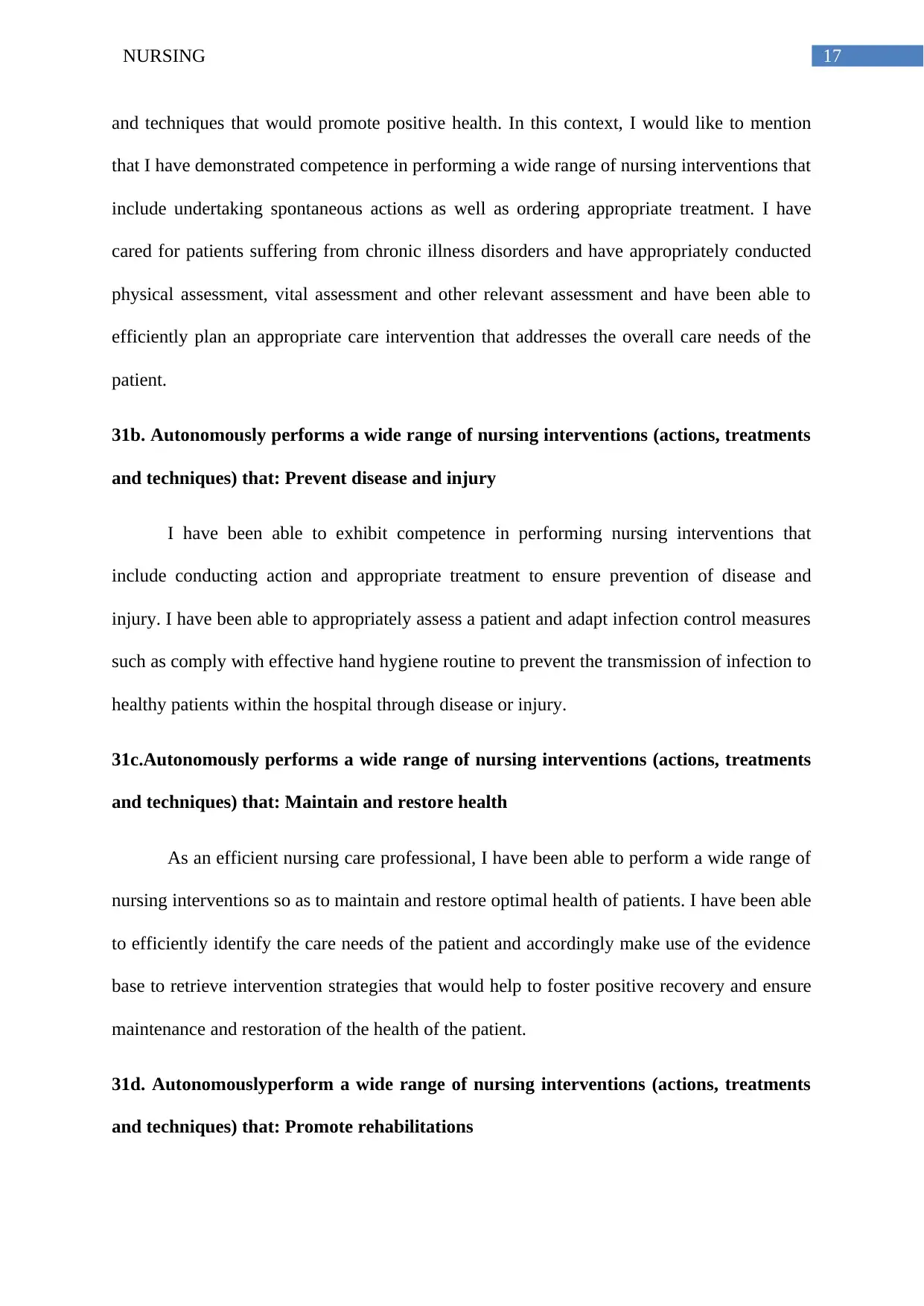
17NURSING
and techniques that would promote positive health. In this context, I would like to mention
that I have demonstrated competence in performing a wide range of nursing interventions that
include undertaking spontaneous actions as well as ordering appropriate treatment. I have
cared for patients suffering from chronic illness disorders and have appropriately conducted
physical assessment, vital assessment and other relevant assessment and have been able to
efficiently plan an appropriate care intervention that addresses the overall care needs of the
patient.
31b. Autonomously performs a wide range of nursing interventions (actions, treatments
and techniques) that: Prevent disease and injury
I have been able to exhibit competence in performing nursing interventions that
include conducting action and appropriate treatment to ensure prevention of disease and
injury. I have been able to appropriately assess a patient and adapt infection control measures
such as comply with effective hand hygiene routine to prevent the transmission of infection to
healthy patients within the hospital through disease or injury.
31c.Autonomously performs a wide range of nursing interventions (actions, treatments
and techniques) that: Maintain and restore health
As an efficient nursing care professional, I have been able to perform a wide range of
nursing interventions so as to maintain and restore optimal health of patients. I have been able
to efficiently identify the care needs of the patient and accordingly make use of the evidence
base to retrieve intervention strategies that would help to foster positive recovery and ensure
maintenance and restoration of the health of the patient.
31d. Autonomouslyperform a wide range of nursing interventions (actions, treatments
and techniques) that: Promote rehabilitations
and techniques that would promote positive health. In this context, I would like to mention
that I have demonstrated competence in performing a wide range of nursing interventions that
include undertaking spontaneous actions as well as ordering appropriate treatment. I have
cared for patients suffering from chronic illness disorders and have appropriately conducted
physical assessment, vital assessment and other relevant assessment and have been able to
efficiently plan an appropriate care intervention that addresses the overall care needs of the
patient.
31b. Autonomously performs a wide range of nursing interventions (actions, treatments
and techniques) that: Prevent disease and injury
I have been able to exhibit competence in performing nursing interventions that
include conducting action and appropriate treatment to ensure prevention of disease and
injury. I have been able to appropriately assess a patient and adapt infection control measures
such as comply with effective hand hygiene routine to prevent the transmission of infection to
healthy patients within the hospital through disease or injury.
31c.Autonomously performs a wide range of nursing interventions (actions, treatments
and techniques) that: Maintain and restore health
As an efficient nursing care professional, I have been able to perform a wide range of
nursing interventions so as to maintain and restore optimal health of patients. I have been able
to efficiently identify the care needs of the patient and accordingly make use of the evidence
base to retrieve intervention strategies that would help to foster positive recovery and ensure
maintenance and restoration of the health of the patient.
31d. Autonomouslyperform a wide range of nursing interventions (actions, treatments
and techniques) that: Promote rehabilitations
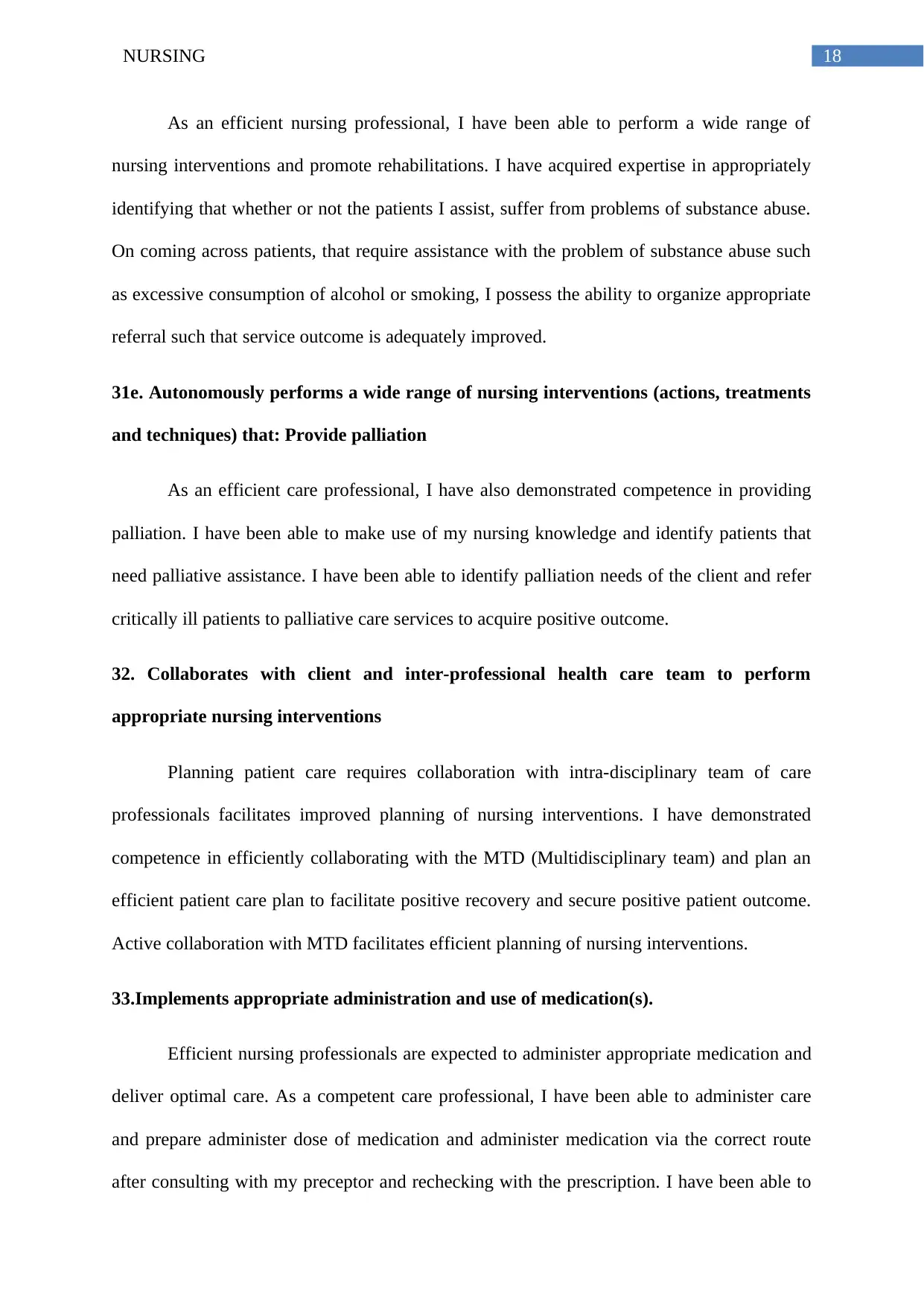
18NURSING
As an efficient nursing professional, I have been able to perform a wide range of
nursing interventions and promote rehabilitations. I have acquired expertise in appropriately
identifying that whether or not the patients I assist, suffer from problems of substance abuse.
On coming across patients, that require assistance with the problem of substance abuse such
as excessive consumption of alcohol or smoking, I possess the ability to organize appropriate
referral such that service outcome is adequately improved.
31e. Autonomously performs a wide range of nursing interventions (actions, treatments
and techniques) that: Provide palliation
As an efficient care professional, I have also demonstrated competence in providing
palliation. I have been able to make use of my nursing knowledge and identify patients that
need palliative assistance. I have been able to identify palliation needs of the client and refer
critically ill patients to palliative care services to acquire positive outcome.
32. Collaborates with client and inter-professional health care team to perform
appropriate nursing interventions
Planning patient care requires collaboration with intra-disciplinary team of care
professionals facilitates improved planning of nursing interventions. I have demonstrated
competence in efficiently collaborating with the MTD (Multidisciplinary team) and plan an
efficient patient care plan to facilitate positive recovery and secure positive patient outcome.
Active collaboration with MTD facilitates efficient planning of nursing interventions.
33.Implements appropriate administration and use of medication(s).
Efficient nursing professionals are expected to administer appropriate medication and
deliver optimal care. As a competent care professional, I have been able to administer care
and prepare administer dose of medication and administer medication via the correct route
after consulting with my preceptor and rechecking with the prescription. I have been able to
As an efficient nursing professional, I have been able to perform a wide range of
nursing interventions and promote rehabilitations. I have acquired expertise in appropriately
identifying that whether or not the patients I assist, suffer from problems of substance abuse.
On coming across patients, that require assistance with the problem of substance abuse such
as excessive consumption of alcohol or smoking, I possess the ability to organize appropriate
referral such that service outcome is adequately improved.
31e. Autonomously performs a wide range of nursing interventions (actions, treatments
and techniques) that: Provide palliation
As an efficient care professional, I have also demonstrated competence in providing
palliation. I have been able to make use of my nursing knowledge and identify patients that
need palliative assistance. I have been able to identify palliation needs of the client and refer
critically ill patients to palliative care services to acquire positive outcome.
32. Collaborates with client and inter-professional health care team to perform
appropriate nursing interventions
Planning patient care requires collaboration with intra-disciplinary team of care
professionals facilitates improved planning of nursing interventions. I have demonstrated
competence in efficiently collaborating with the MTD (Multidisciplinary team) and plan an
efficient patient care plan to facilitate positive recovery and secure positive patient outcome.
Active collaboration with MTD facilitates efficient planning of nursing interventions.
33.Implements appropriate administration and use of medication(s).
Efficient nursing professionals are expected to administer appropriate medication and
deliver optimal care. As a competent care professional, I have been able to administer care
and prepare administer dose of medication and administer medication via the correct route
after consulting with my preceptor and rechecking with the prescription. I have been able to
Paraphrase This Document
Need a fresh take? Get an instant paraphrase of this document with our AI Paraphraser
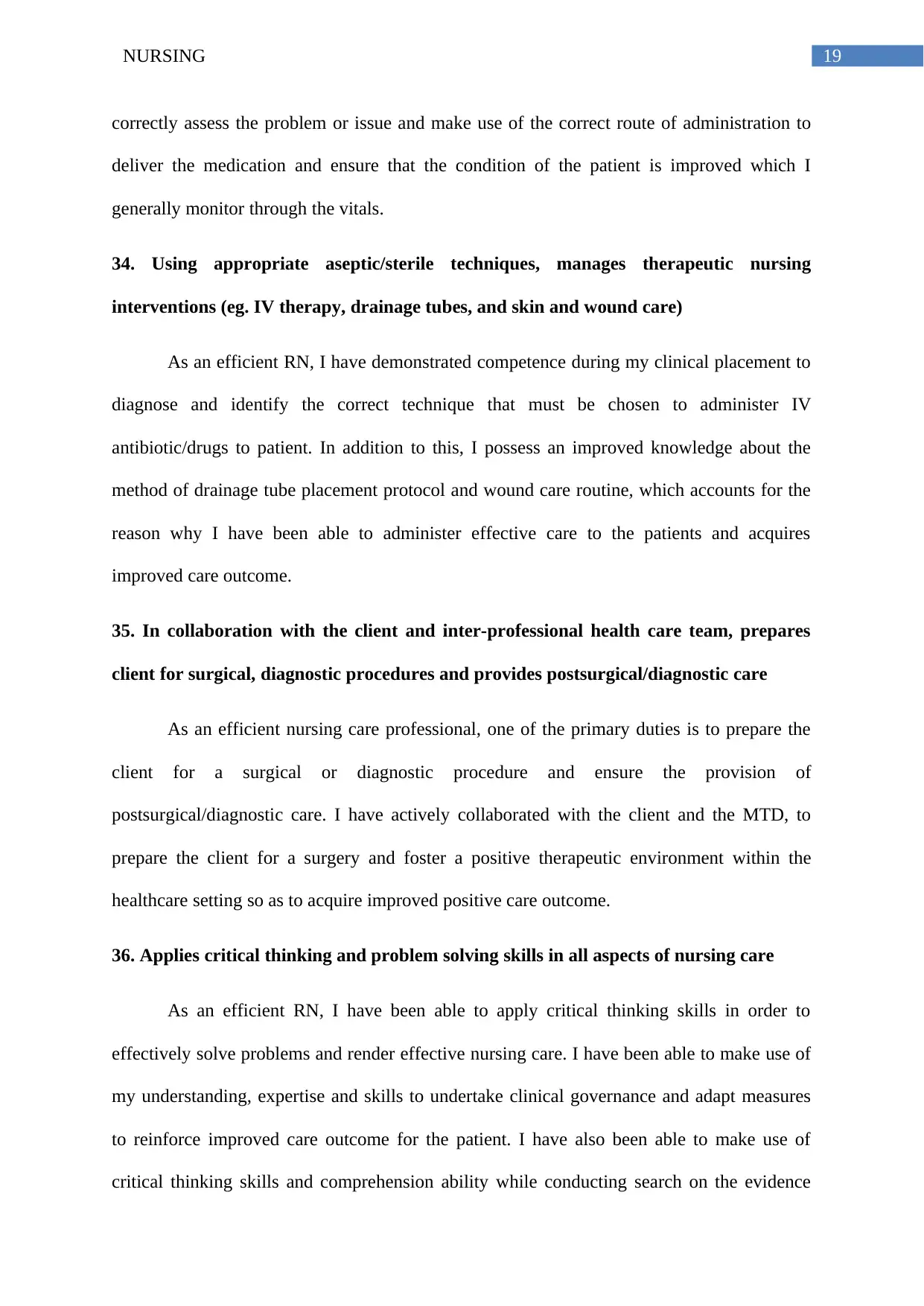
19NURSING
correctly assess the problem or issue and make use of the correct route of administration to
deliver the medication and ensure that the condition of the patient is improved which I
generally monitor through the vitals.
34. Using appropriate aseptic/sterile techniques, manages therapeutic nursing
interventions (eg. IV therapy, drainage tubes, and skin and wound care)
As an efficient RN, I have demonstrated competence during my clinical placement to
diagnose and identify the correct technique that must be chosen to administer IV
antibiotic/drugs to patient. In addition to this, I possess an improved knowledge about the
method of drainage tube placement protocol and wound care routine, which accounts for the
reason why I have been able to administer effective care to the patients and acquires
improved care outcome.
35. In collaboration with the client and inter-professional health care team, prepares
client for surgical, diagnostic procedures and provides postsurgical/diagnostic care
As an efficient nursing care professional, one of the primary duties is to prepare the
client for a surgical or diagnostic procedure and ensure the provision of
postsurgical/diagnostic care. I have actively collaborated with the client and the MTD, to
prepare the client for a surgery and foster a positive therapeutic environment within the
healthcare setting so as to acquire improved positive care outcome.
36. Applies critical thinking and problem solving skills in all aspects of nursing care
As an efficient RN, I have been able to apply critical thinking skills in order to
effectively solve problems and render effective nursing care. I have been able to make use of
my understanding, expertise and skills to undertake clinical governance and adapt measures
to reinforce improved care outcome for the patient. I have also been able to make use of
critical thinking skills and comprehension ability while conducting search on the evidence
correctly assess the problem or issue and make use of the correct route of administration to
deliver the medication and ensure that the condition of the patient is improved which I
generally monitor through the vitals.
34. Using appropriate aseptic/sterile techniques, manages therapeutic nursing
interventions (eg. IV therapy, drainage tubes, and skin and wound care)
As an efficient RN, I have demonstrated competence during my clinical placement to
diagnose and identify the correct technique that must be chosen to administer IV
antibiotic/drugs to patient. In addition to this, I possess an improved knowledge about the
method of drainage tube placement protocol and wound care routine, which accounts for the
reason why I have been able to administer effective care to the patients and acquires
improved care outcome.
35. In collaboration with the client and inter-professional health care team, prepares
client for surgical, diagnostic procedures and provides postsurgical/diagnostic care
As an efficient nursing care professional, one of the primary duties is to prepare the
client for a surgical or diagnostic procedure and ensure the provision of
postsurgical/diagnostic care. I have actively collaborated with the client and the MTD, to
prepare the client for a surgery and foster a positive therapeutic environment within the
healthcare setting so as to acquire improved positive care outcome.
36. Applies critical thinking and problem solving skills in all aspects of nursing care
As an efficient RN, I have been able to apply critical thinking skills in order to
effectively solve problems and render effective nursing care. I have been able to make use of
my understanding, expertise and skills to undertake clinical governance and adapt measures
to reinforce improved care outcome for the patient. I have also been able to make use of
critical thinking skills and comprehension ability while conducting search on the evidence
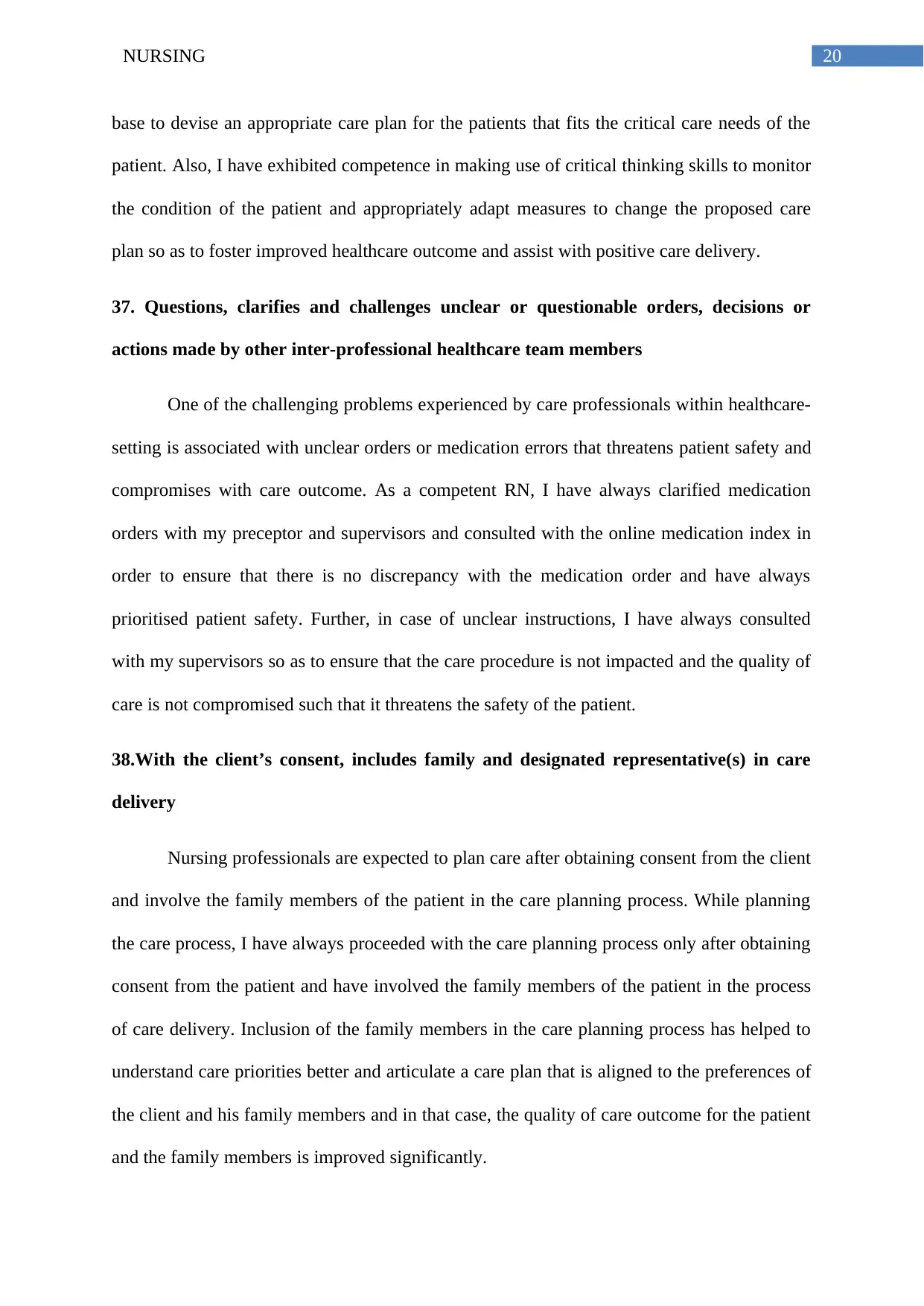
20NURSING
base to devise an appropriate care plan for the patients that fits the critical care needs of the
patient. Also, I have exhibited competence in making use of critical thinking skills to monitor
the condition of the patient and appropriately adapt measures to change the proposed care
plan so as to foster improved healthcare outcome and assist with positive care delivery.
37. Questions, clarifies and challenges unclear or questionable orders, decisions or
actions made by other inter-professional healthcare team members
One of the challenging problems experienced by care professionals within healthcare-
setting is associated with unclear orders or medication errors that threatens patient safety and
compromises with care outcome. As a competent RN, I have always clarified medication
orders with my preceptor and supervisors and consulted with the online medication index in
order to ensure that there is no discrepancy with the medication order and have always
prioritised patient safety. Further, in case of unclear instructions, I have always consulted
with my supervisors so as to ensure that the care procedure is not impacted and the quality of
care is not compromised such that it threatens the safety of the patient.
38.With the client’s consent, includes family and designated representative(s) in care
delivery
Nursing professionals are expected to plan care after obtaining consent from the client
and involve the family members of the patient in the care planning process. While planning
the care process, I have always proceeded with the care planning process only after obtaining
consent from the patient and have involved the family members of the patient in the process
of care delivery. Inclusion of the family members in the care planning process has helped to
understand care priorities better and articulate a care plan that is aligned to the preferences of
the client and his family members and in that case, the quality of care outcome for the patient
and the family members is improved significantly.
base to devise an appropriate care plan for the patients that fits the critical care needs of the
patient. Also, I have exhibited competence in making use of critical thinking skills to monitor
the condition of the patient and appropriately adapt measures to change the proposed care
plan so as to foster improved healthcare outcome and assist with positive care delivery.
37. Questions, clarifies and challenges unclear or questionable orders, decisions or
actions made by other inter-professional healthcare team members
One of the challenging problems experienced by care professionals within healthcare-
setting is associated with unclear orders or medication errors that threatens patient safety and
compromises with care outcome. As a competent RN, I have always clarified medication
orders with my preceptor and supervisors and consulted with the online medication index in
order to ensure that there is no discrepancy with the medication order and have always
prioritised patient safety. Further, in case of unclear instructions, I have always consulted
with my supervisors so as to ensure that the care procedure is not impacted and the quality of
care is not compromised such that it threatens the safety of the patient.
38.With the client’s consent, includes family and designated representative(s) in care
delivery
Nursing professionals are expected to plan care after obtaining consent from the client
and involve the family members of the patient in the care planning process. While planning
the care process, I have always proceeded with the care planning process only after obtaining
consent from the patient and have involved the family members of the patient in the process
of care delivery. Inclusion of the family members in the care planning process has helped to
understand care priorities better and articulate a care plan that is aligned to the preferences of
the client and his family members and in that case, the quality of care outcome for the patient
and the family members is improved significantly.
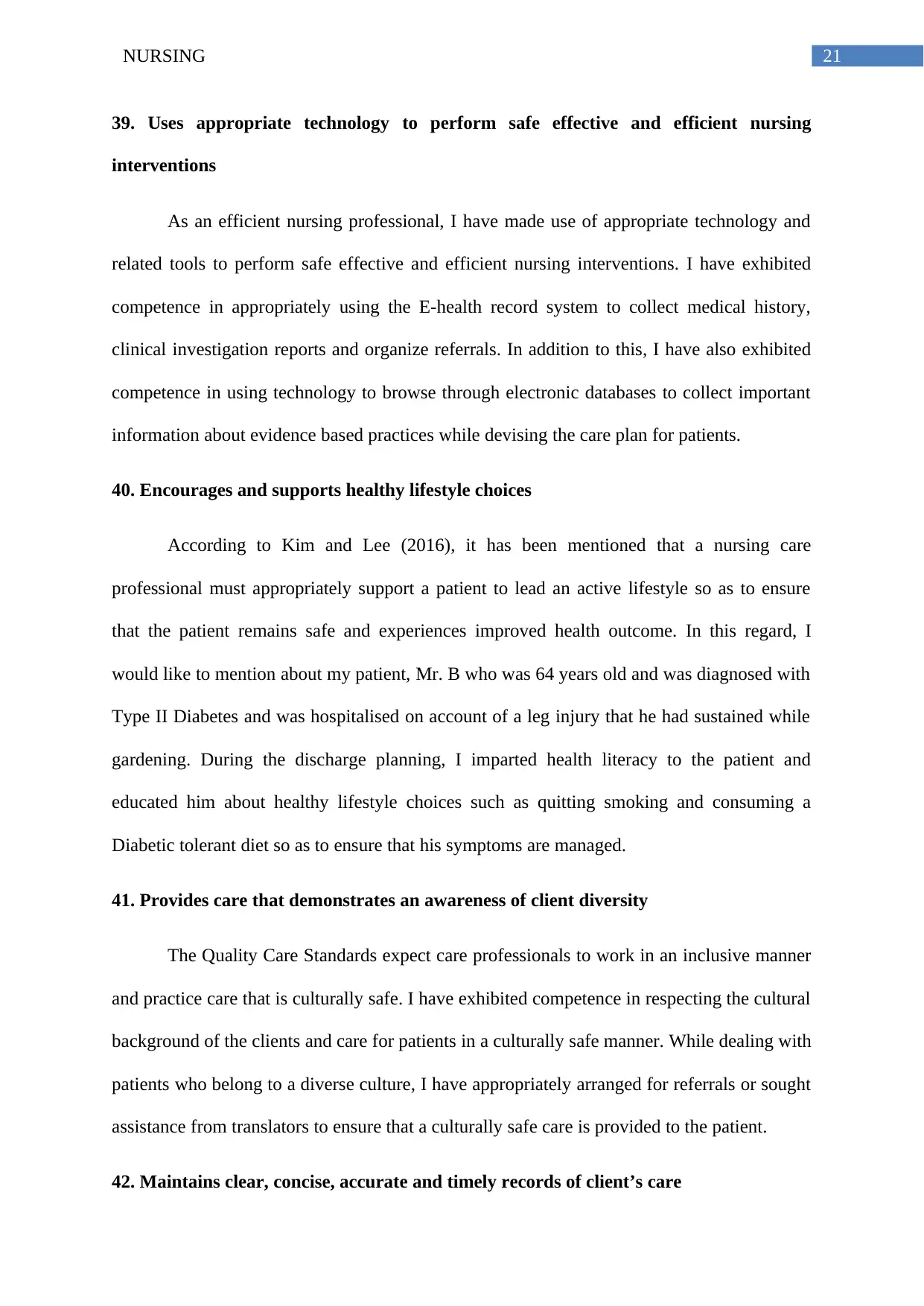
21NURSING
39. Uses appropriate technology to perform safe effective and efficient nursing
interventions
As an efficient nursing professional, I have made use of appropriate technology and
related tools to perform safe effective and efficient nursing interventions. I have exhibited
competence in appropriately using the E-health record system to collect medical history,
clinical investigation reports and organize referrals. In addition to this, I have also exhibited
competence in using technology to browse through electronic databases to collect important
information about evidence based practices while devising the care plan for patients.
40. Encourages and supports healthy lifestyle choices
According to Kim and Lee (2016), it has been mentioned that a nursing care
professional must appropriately support a patient to lead an active lifestyle so as to ensure
that the patient remains safe and experiences improved health outcome. In this regard, I
would like to mention about my patient, Mr. B who was 64 years old and was diagnosed with
Type II Diabetes and was hospitalised on account of a leg injury that he had sustained while
gardening. During the discharge planning, I imparted health literacy to the patient and
educated him about healthy lifestyle choices such as quitting smoking and consuming a
Diabetic tolerant diet so as to ensure that his symptoms are managed.
41. Provides care that demonstrates an awareness of client diversity
The Quality Care Standards expect care professionals to work in an inclusive manner
and practice care that is culturally safe. I have exhibited competence in respecting the cultural
background of the clients and care for patients in a culturally safe manner. While dealing with
patients who belong to a diverse culture, I have appropriately arranged for referrals or sought
assistance from translators to ensure that a culturally safe care is provided to the patient.
42. Maintains clear, concise, accurate and timely records of client’s care
39. Uses appropriate technology to perform safe effective and efficient nursing
interventions
As an efficient nursing professional, I have made use of appropriate technology and
related tools to perform safe effective and efficient nursing interventions. I have exhibited
competence in appropriately using the E-health record system to collect medical history,
clinical investigation reports and organize referrals. In addition to this, I have also exhibited
competence in using technology to browse through electronic databases to collect important
information about evidence based practices while devising the care plan for patients.
40. Encourages and supports healthy lifestyle choices
According to Kim and Lee (2016), it has been mentioned that a nursing care
professional must appropriately support a patient to lead an active lifestyle so as to ensure
that the patient remains safe and experiences improved health outcome. In this regard, I
would like to mention about my patient, Mr. B who was 64 years old and was diagnosed with
Type II Diabetes and was hospitalised on account of a leg injury that he had sustained while
gardening. During the discharge planning, I imparted health literacy to the patient and
educated him about healthy lifestyle choices such as quitting smoking and consuming a
Diabetic tolerant diet so as to ensure that his symptoms are managed.
41. Provides care that demonstrates an awareness of client diversity
The Quality Care Standards expect care professionals to work in an inclusive manner
and practice care that is culturally safe. I have exhibited competence in respecting the cultural
background of the clients and care for patients in a culturally safe manner. While dealing with
patients who belong to a diverse culture, I have appropriately arranged for referrals or sought
assistance from translators to ensure that a culturally safe care is provided to the patient.
42. Maintains clear, concise, accurate and timely records of client’s care
Secure Best Marks with AI Grader
Need help grading? Try our AI Grader for instant feedback on your assignments.
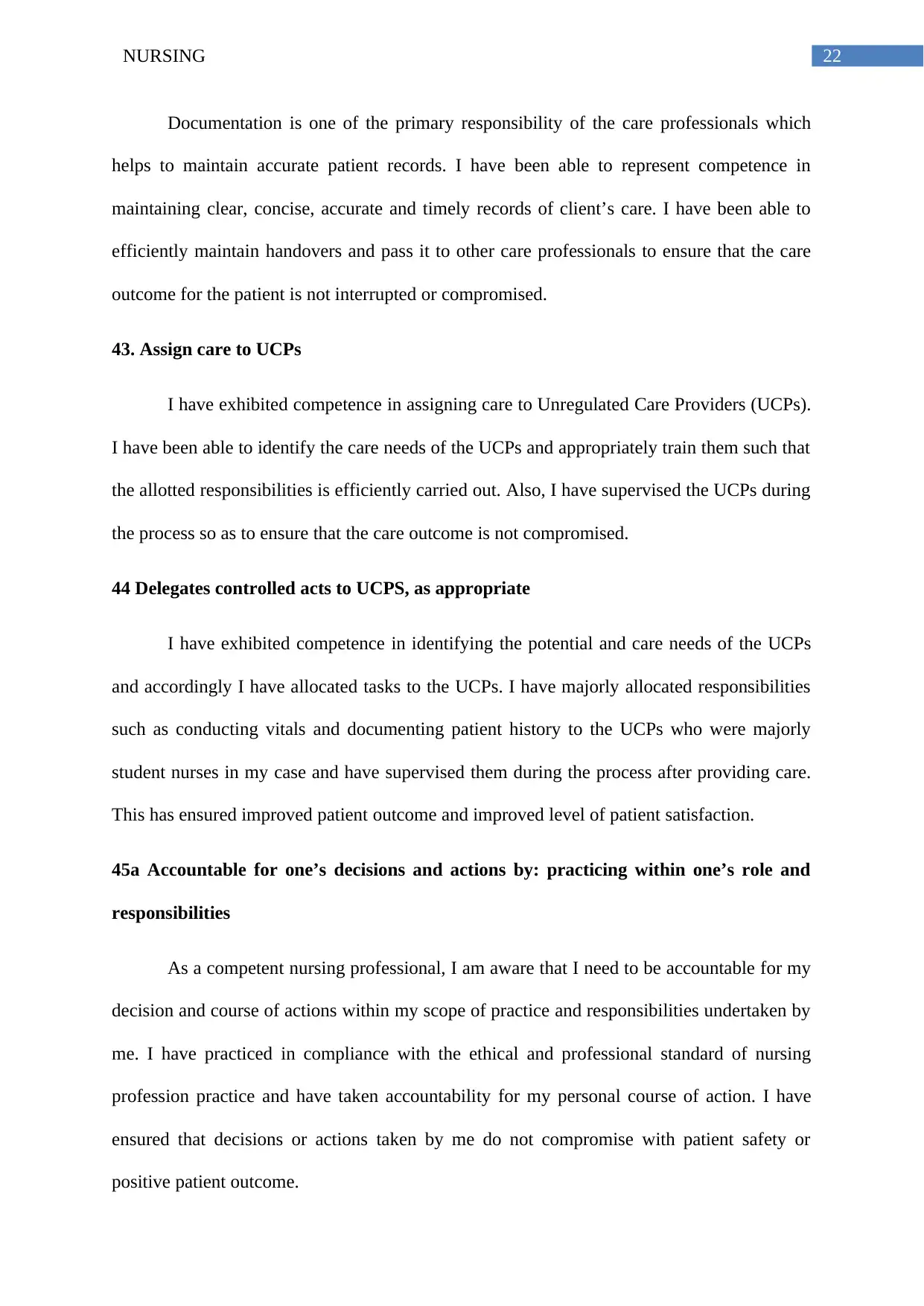
22NURSING
Documentation is one of the primary responsibility of the care professionals which
helps to maintain accurate patient records. I have been able to represent competence in
maintaining clear, concise, accurate and timely records of client’s care. I have been able to
efficiently maintain handovers and pass it to other care professionals to ensure that the care
outcome for the patient is not interrupted or compromised.
43. Assign care to UCPs
I have exhibited competence in assigning care to Unregulated Care Providers (UCPs).
I have been able to identify the care needs of the UCPs and appropriately train them such that
the allotted responsibilities is efficiently carried out. Also, I have supervised the UCPs during
the process so as to ensure that the care outcome is not compromised.
44 Delegates controlled acts to UCPS, as appropriate
I have exhibited competence in identifying the potential and care needs of the UCPs
and accordingly I have allocated tasks to the UCPs. I have majorly allocated responsibilities
such as conducting vitals and documenting patient history to the UCPs who were majorly
student nurses in my case and have supervised them during the process after providing care.
This has ensured improved patient outcome and improved level of patient satisfaction.
45a Accountable for one’s decisions and actions by: practicing within one’s role and
responsibilities
As a competent nursing professional, I am aware that I need to be accountable for my
decision and course of actions within my scope of practice and responsibilities undertaken by
me. I have practiced in compliance with the ethical and professional standard of nursing
profession practice and have taken accountability for my personal course of action. I have
ensured that decisions or actions taken by me do not compromise with patient safety or
positive patient outcome.
Documentation is one of the primary responsibility of the care professionals which
helps to maintain accurate patient records. I have been able to represent competence in
maintaining clear, concise, accurate and timely records of client’s care. I have been able to
efficiently maintain handovers and pass it to other care professionals to ensure that the care
outcome for the patient is not interrupted or compromised.
43. Assign care to UCPs
I have exhibited competence in assigning care to Unregulated Care Providers (UCPs).
I have been able to identify the care needs of the UCPs and appropriately train them such that
the allotted responsibilities is efficiently carried out. Also, I have supervised the UCPs during
the process so as to ensure that the care outcome is not compromised.
44 Delegates controlled acts to UCPS, as appropriate
I have exhibited competence in identifying the potential and care needs of the UCPs
and accordingly I have allocated tasks to the UCPs. I have majorly allocated responsibilities
such as conducting vitals and documenting patient history to the UCPs who were majorly
student nurses in my case and have supervised them during the process after providing care.
This has ensured improved patient outcome and improved level of patient satisfaction.
45a Accountable for one’s decisions and actions by: practicing within one’s role and
responsibilities
As a competent nursing professional, I am aware that I need to be accountable for my
decision and course of actions within my scope of practice and responsibilities undertaken by
me. I have practiced in compliance with the ethical and professional standard of nursing
profession practice and have taken accountability for my personal course of action. I have
ensured that decisions or actions taken by me do not compromise with patient safety or
positive patient outcome.
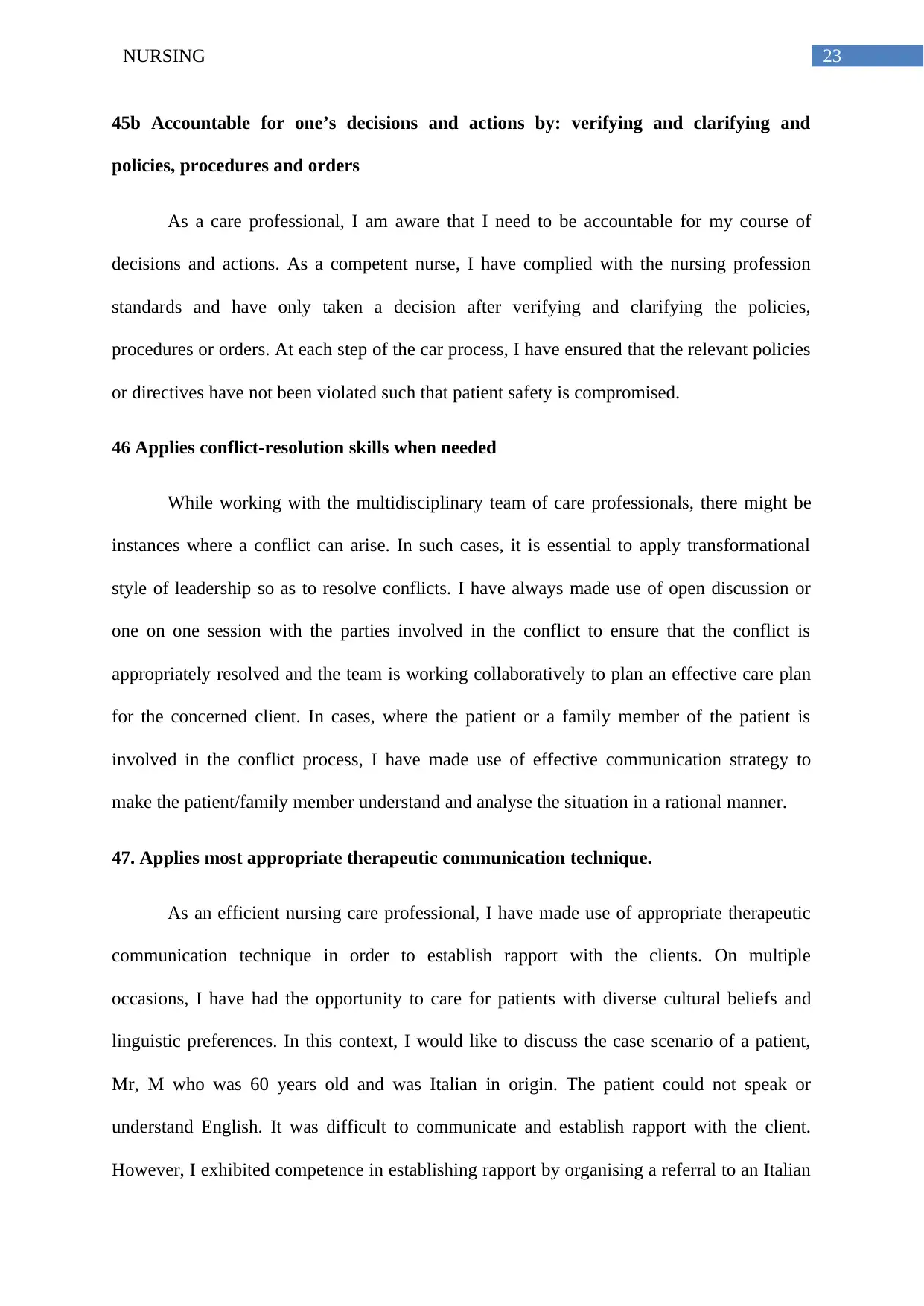
23NURSING
45b Accountable for one’s decisions and actions by: verifying and clarifying and
policies, procedures and orders
As a care professional, I am aware that I need to be accountable for my course of
decisions and actions. As a competent nurse, I have complied with the nursing profession
standards and have only taken a decision after verifying and clarifying the policies,
procedures or orders. At each step of the car process, I have ensured that the relevant policies
or directives have not been violated such that patient safety is compromised.
46 Applies conflict-resolution skills when needed
While working with the multidisciplinary team of care professionals, there might be
instances where a conflict can arise. In such cases, it is essential to apply transformational
style of leadership so as to resolve conflicts. I have always made use of open discussion or
one on one session with the parties involved in the conflict to ensure that the conflict is
appropriately resolved and the team is working collaboratively to plan an effective care plan
for the concerned client. In cases, where the patient or a family member of the patient is
involved in the conflict process, I have made use of effective communication strategy to
make the patient/family member understand and analyse the situation in a rational manner.
47. Applies most appropriate therapeutic communication technique.
As an efficient nursing care professional, I have made use of appropriate therapeutic
communication technique in order to establish rapport with the clients. On multiple
occasions, I have had the opportunity to care for patients with diverse cultural beliefs and
linguistic preferences. In this context, I would like to discuss the case scenario of a patient,
Mr, M who was 60 years old and was Italian in origin. The patient could not speak or
understand English. It was difficult to communicate and establish rapport with the client.
However, I exhibited competence in establishing rapport by organising a referral to an Italian
45b Accountable for one’s decisions and actions by: verifying and clarifying and
policies, procedures and orders
As a care professional, I am aware that I need to be accountable for my course of
decisions and actions. As a competent nurse, I have complied with the nursing profession
standards and have only taken a decision after verifying and clarifying the policies,
procedures or orders. At each step of the car process, I have ensured that the relevant policies
or directives have not been violated such that patient safety is compromised.
46 Applies conflict-resolution skills when needed
While working with the multidisciplinary team of care professionals, there might be
instances where a conflict can arise. In such cases, it is essential to apply transformational
style of leadership so as to resolve conflicts. I have always made use of open discussion or
one on one session with the parties involved in the conflict to ensure that the conflict is
appropriately resolved and the team is working collaboratively to plan an effective care plan
for the concerned client. In cases, where the patient or a family member of the patient is
involved in the conflict process, I have made use of effective communication strategy to
make the patient/family member understand and analyse the situation in a rational manner.
47. Applies most appropriate therapeutic communication technique.
As an efficient nursing care professional, I have made use of appropriate therapeutic
communication technique in order to establish rapport with the clients. On multiple
occasions, I have had the opportunity to care for patients with diverse cultural beliefs and
linguistic preferences. In this context, I would like to discuss the case scenario of a patient,
Mr, M who was 60 years old and was Italian in origin. The patient could not speak or
understand English. It was difficult to communicate and establish rapport with the client.
However, I exhibited competence in establishing rapport by organising a referral to an Italian
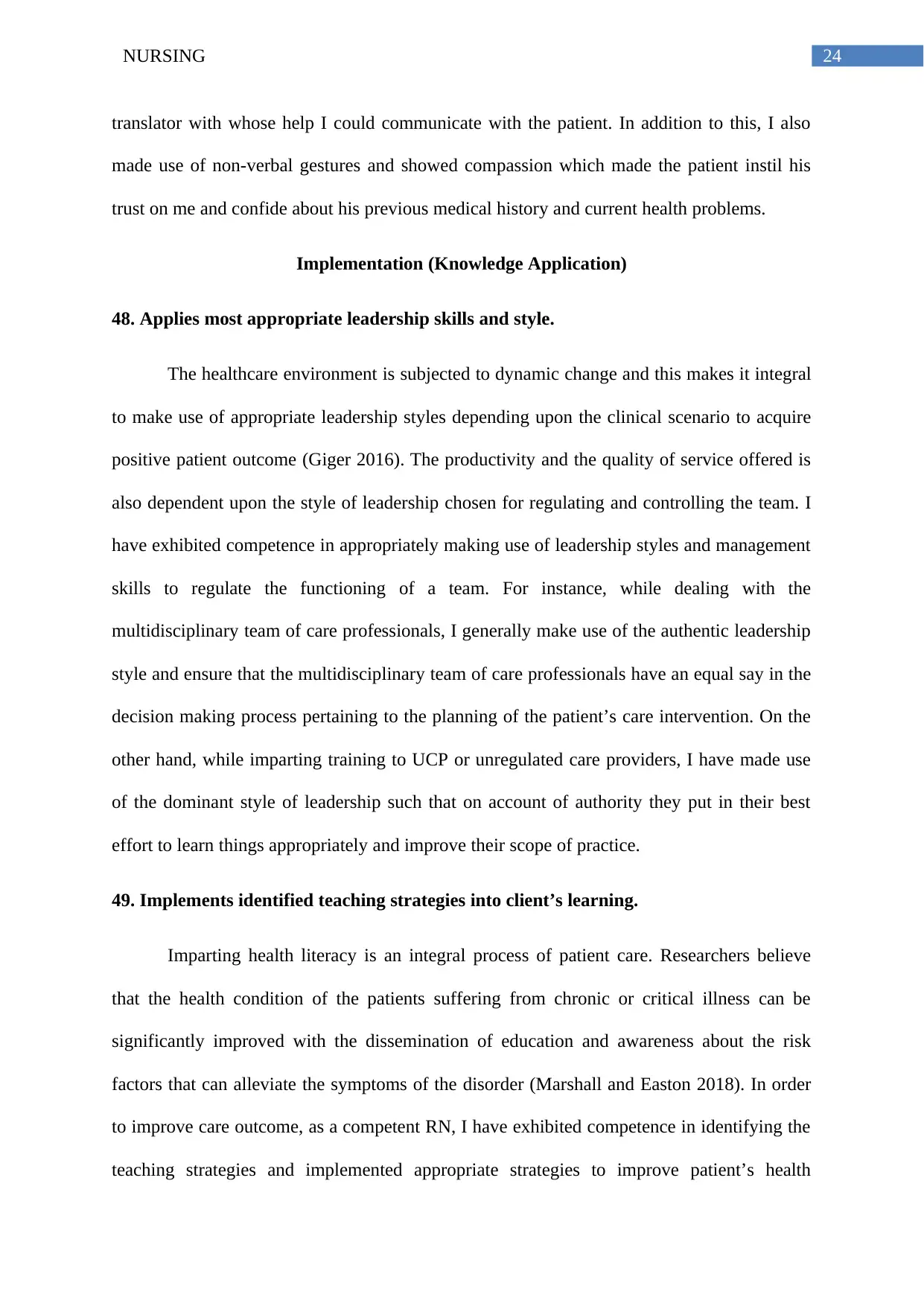
24NURSING
translator with whose help I could communicate with the patient. In addition to this, I also
made use of non-verbal gestures and showed compassion which made the patient instil his
trust on me and confide about his previous medical history and current health problems.
Implementation (Knowledge Application)
48. Applies most appropriate leadership skills and style.
The healthcare environment is subjected to dynamic change and this makes it integral
to make use of appropriate leadership styles depending upon the clinical scenario to acquire
positive patient outcome (Giger 2016). The productivity and the quality of service offered is
also dependent upon the style of leadership chosen for regulating and controlling the team. I
have exhibited competence in appropriately making use of leadership styles and management
skills to regulate the functioning of a team. For instance, while dealing with the
multidisciplinary team of care professionals, I generally make use of the authentic leadership
style and ensure that the multidisciplinary team of care professionals have an equal say in the
decision making process pertaining to the planning of the patient’s care intervention. On the
other hand, while imparting training to UCP or unregulated care providers, I have made use
of the dominant style of leadership such that on account of authority they put in their best
effort to learn things appropriately and improve their scope of practice.
49. Implements identified teaching strategies into client’s learning.
Imparting health literacy is an integral process of patient care. Researchers believe
that the health condition of the patients suffering from chronic or critical illness can be
significantly improved with the dissemination of education and awareness about the risk
factors that can alleviate the symptoms of the disorder (Marshall and Easton 2018). In order
to improve care outcome, as a competent RN, I have exhibited competence in identifying the
teaching strategies and implemented appropriate strategies to improve patient’s health
translator with whose help I could communicate with the patient. In addition to this, I also
made use of non-verbal gestures and showed compassion which made the patient instil his
trust on me and confide about his previous medical history and current health problems.
Implementation (Knowledge Application)
48. Applies most appropriate leadership skills and style.
The healthcare environment is subjected to dynamic change and this makes it integral
to make use of appropriate leadership styles depending upon the clinical scenario to acquire
positive patient outcome (Giger 2016). The productivity and the quality of service offered is
also dependent upon the style of leadership chosen for regulating and controlling the team. I
have exhibited competence in appropriately making use of leadership styles and management
skills to regulate the functioning of a team. For instance, while dealing with the
multidisciplinary team of care professionals, I generally make use of the authentic leadership
style and ensure that the multidisciplinary team of care professionals have an equal say in the
decision making process pertaining to the planning of the patient’s care intervention. On the
other hand, while imparting training to UCP or unregulated care providers, I have made use
of the dominant style of leadership such that on account of authority they put in their best
effort to learn things appropriately and improve their scope of practice.
49. Implements identified teaching strategies into client’s learning.
Imparting health literacy is an integral process of patient care. Researchers believe
that the health condition of the patients suffering from chronic or critical illness can be
significantly improved with the dissemination of education and awareness about the risk
factors that can alleviate the symptoms of the disorder (Marshall and Easton 2018). In order
to improve care outcome, as a competent RN, I have exhibited competence in identifying the
teaching strategies and implemented appropriate strategies to improve patient’s health
Paraphrase This Document
Need a fresh take? Get an instant paraphrase of this document with our AI Paraphraser
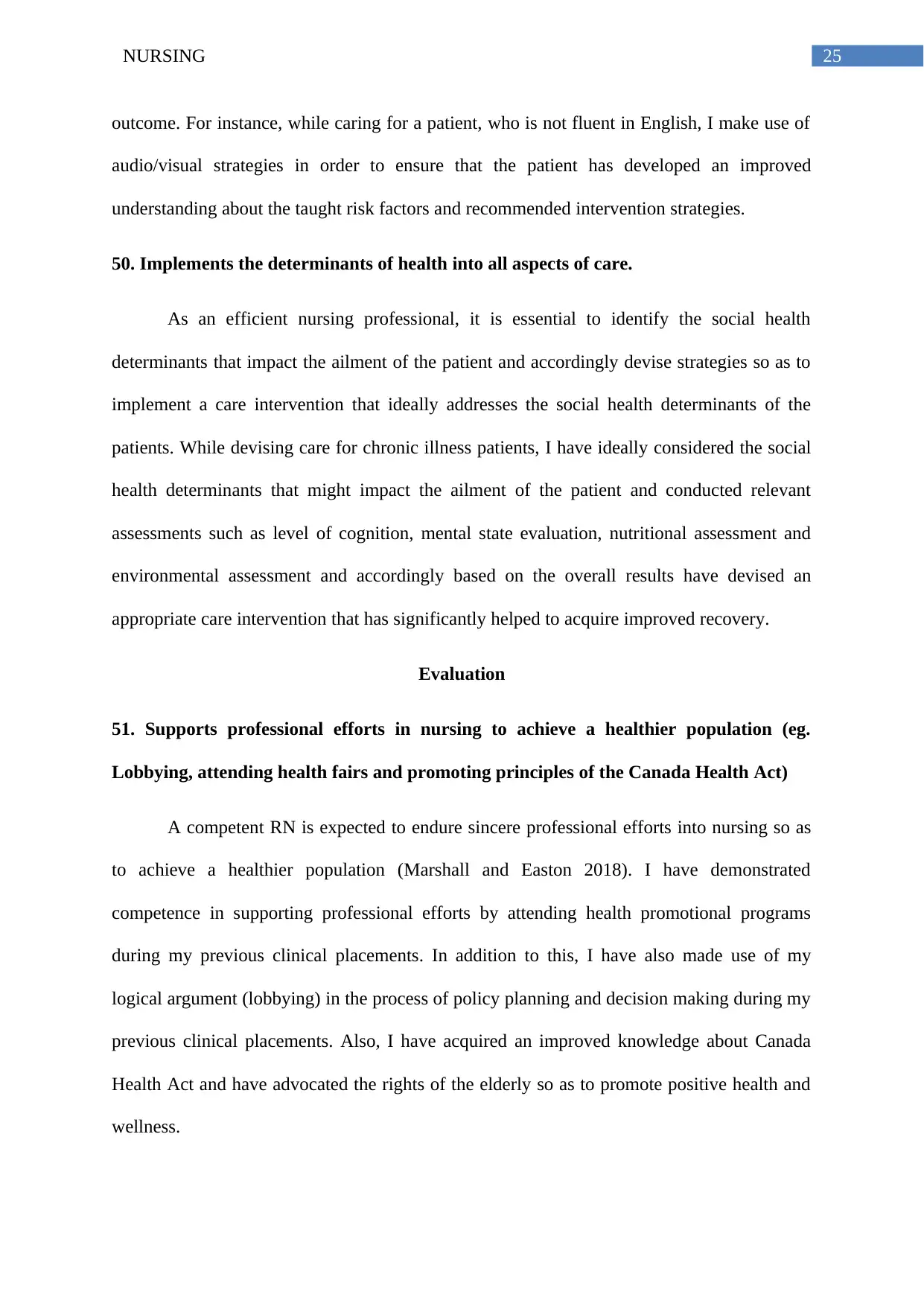
25NURSING
outcome. For instance, while caring for a patient, who is not fluent in English, I make use of
audio/visual strategies in order to ensure that the patient has developed an improved
understanding about the taught risk factors and recommended intervention strategies.
50. Implements the determinants of health into all aspects of care.
As an efficient nursing professional, it is essential to identify the social health
determinants that impact the ailment of the patient and accordingly devise strategies so as to
implement a care intervention that ideally addresses the social health determinants of the
patients. While devising care for chronic illness patients, I have ideally considered the social
health determinants that might impact the ailment of the patient and conducted relevant
assessments such as level of cognition, mental state evaluation, nutritional assessment and
environmental assessment and accordingly based on the overall results have devised an
appropriate care intervention that has significantly helped to acquire improved recovery.
Evaluation
51. Supports professional efforts in nursing to achieve a healthier population (eg.
Lobbying, attending health fairs and promoting principles of the Canada Health Act)
A competent RN is expected to endure sincere professional efforts into nursing so as
to achieve a healthier population (Marshall and Easton 2018). I have demonstrated
competence in supporting professional efforts by attending health promotional programs
during my previous clinical placements. In addition to this, I have also made use of my
logical argument (lobbying) in the process of policy planning and decision making during my
previous clinical placements. Also, I have acquired an improved knowledge about Canada
Health Act and have advocated the rights of the elderly so as to promote positive health and
wellness.
outcome. For instance, while caring for a patient, who is not fluent in English, I make use of
audio/visual strategies in order to ensure that the patient has developed an improved
understanding about the taught risk factors and recommended intervention strategies.
50. Implements the determinants of health into all aspects of care.
As an efficient nursing professional, it is essential to identify the social health
determinants that impact the ailment of the patient and accordingly devise strategies so as to
implement a care intervention that ideally addresses the social health determinants of the
patients. While devising care for chronic illness patients, I have ideally considered the social
health determinants that might impact the ailment of the patient and conducted relevant
assessments such as level of cognition, mental state evaluation, nutritional assessment and
environmental assessment and accordingly based on the overall results have devised an
appropriate care intervention that has significantly helped to acquire improved recovery.
Evaluation
51. Supports professional efforts in nursing to achieve a healthier population (eg.
Lobbying, attending health fairs and promoting principles of the Canada Health Act)
A competent RN is expected to endure sincere professional efforts into nursing so as
to achieve a healthier population (Marshall and Easton 2018). I have demonstrated
competence in supporting professional efforts by attending health promotional programs
during my previous clinical placements. In addition to this, I have also made use of my
logical argument (lobbying) in the process of policy planning and decision making during my
previous clinical placements. Also, I have acquired an improved knowledge about Canada
Health Act and have advocated the rights of the elderly so as to promote positive health and
wellness.
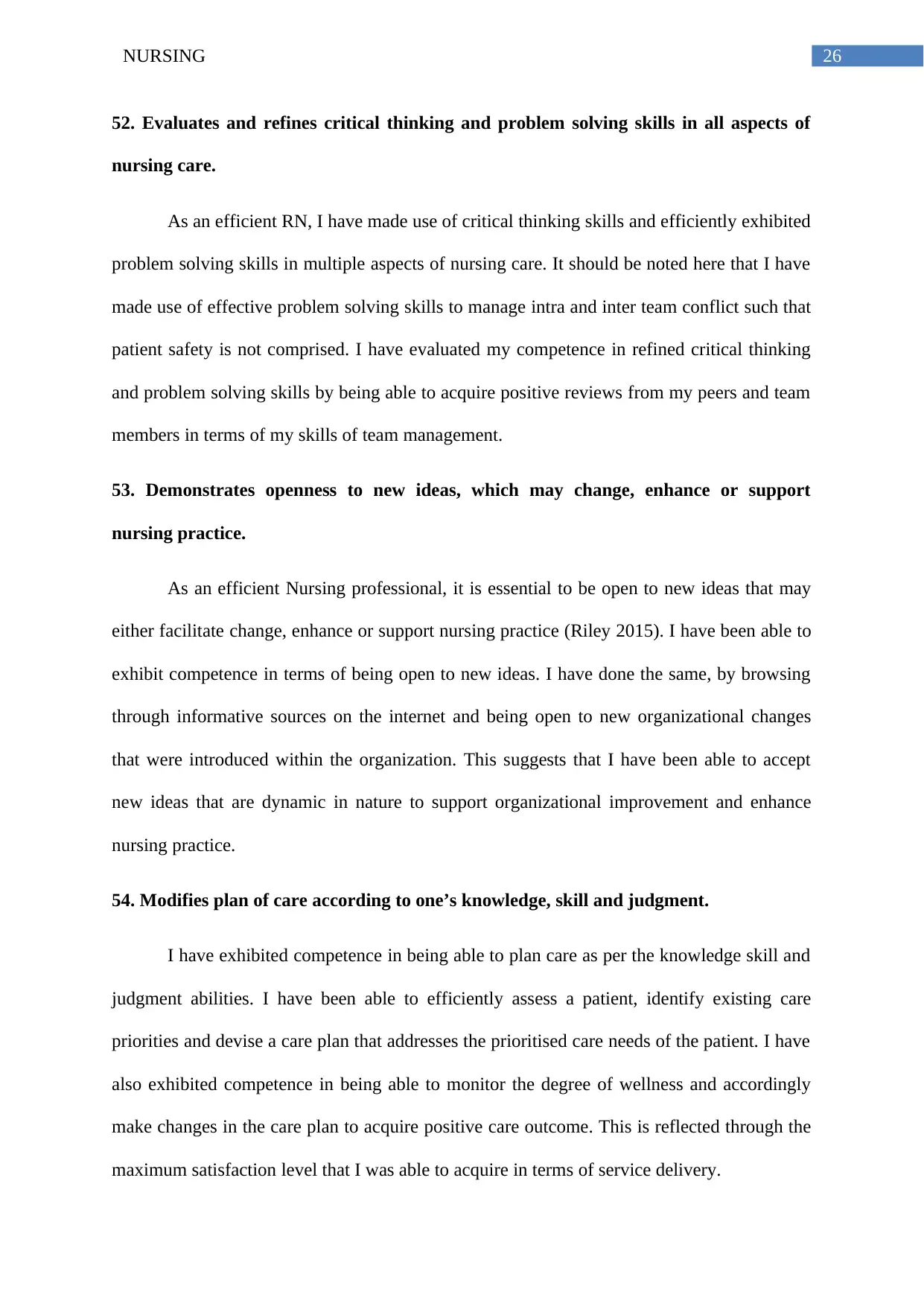
26NURSING
52. Evaluates and refines critical thinking and problem solving skills in all aspects of
nursing care.
As an efficient RN, I have made use of critical thinking skills and efficiently exhibited
problem solving skills in multiple aspects of nursing care. It should be noted here that I have
made use of effective problem solving skills to manage intra and inter team conflict such that
patient safety is not comprised. I have evaluated my competence in refined critical thinking
and problem solving skills by being able to acquire positive reviews from my peers and team
members in terms of my skills of team management.
53. Demonstrates openness to new ideas, which may change, enhance or support
nursing practice.
As an efficient Nursing professional, it is essential to be open to new ideas that may
either facilitate change, enhance or support nursing practice (Riley 2015). I have been able to
exhibit competence in terms of being open to new ideas. I have done the same, by browsing
through informative sources on the internet and being open to new organizational changes
that were introduced within the organization. This suggests that I have been able to accept
new ideas that are dynamic in nature to support organizational improvement and enhance
nursing practice.
54. Modifies plan of care according to one’s knowledge, skill and judgment.
I have exhibited competence in being able to plan care as per the knowledge skill and
judgment abilities. I have been able to efficiently assess a patient, identify existing care
priorities and devise a care plan that addresses the prioritised care needs of the patient. I have
also exhibited competence in being able to monitor the degree of wellness and accordingly
make changes in the care plan to acquire positive care outcome. This is reflected through the
maximum satisfaction level that I was able to acquire in terms of service delivery.
52. Evaluates and refines critical thinking and problem solving skills in all aspects of
nursing care.
As an efficient RN, I have made use of critical thinking skills and efficiently exhibited
problem solving skills in multiple aspects of nursing care. It should be noted here that I have
made use of effective problem solving skills to manage intra and inter team conflict such that
patient safety is not comprised. I have evaluated my competence in refined critical thinking
and problem solving skills by being able to acquire positive reviews from my peers and team
members in terms of my skills of team management.
53. Demonstrates openness to new ideas, which may change, enhance or support
nursing practice.
As an efficient Nursing professional, it is essential to be open to new ideas that may
either facilitate change, enhance or support nursing practice (Riley 2015). I have been able to
exhibit competence in terms of being open to new ideas. I have done the same, by browsing
through informative sources on the internet and being open to new organizational changes
that were introduced within the organization. This suggests that I have been able to accept
new ideas that are dynamic in nature to support organizational improvement and enhance
nursing practice.
54. Modifies plan of care according to one’s knowledge, skill and judgment.
I have exhibited competence in being able to plan care as per the knowledge skill and
judgment abilities. I have been able to efficiently assess a patient, identify existing care
priorities and devise a care plan that addresses the prioritised care needs of the patient. I have
also exhibited competence in being able to monitor the degree of wellness and accordingly
make changes in the care plan to acquire positive care outcome. This is reflected through the
maximum satisfaction level that I was able to acquire in terms of service delivery.
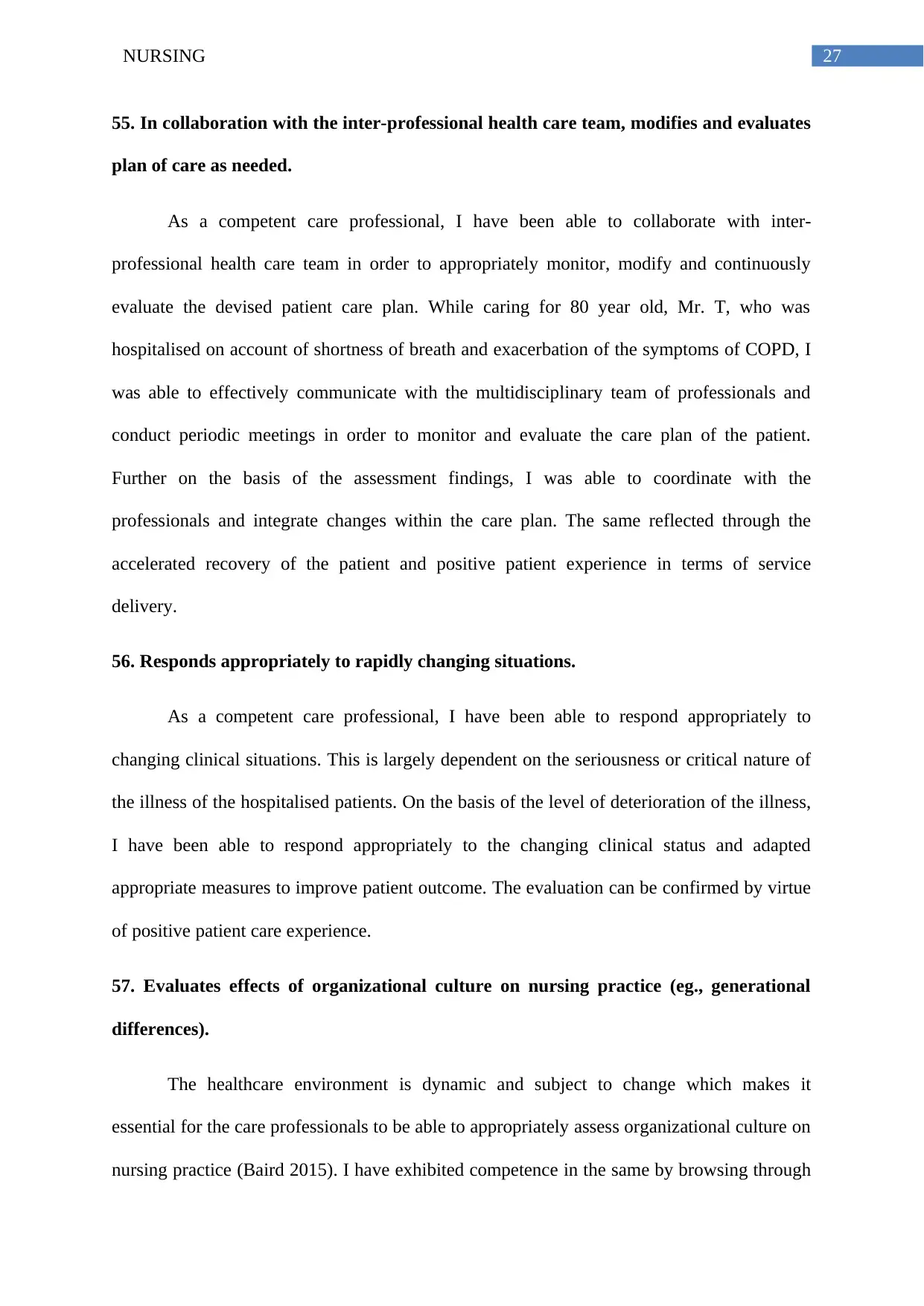
27NURSING
55. In collaboration with the inter-professional health care team, modifies and evaluates
plan of care as needed.
As a competent care professional, I have been able to collaborate with inter-
professional health care team in order to appropriately monitor, modify and continuously
evaluate the devised patient care plan. While caring for 80 year old, Mr. T, who was
hospitalised on account of shortness of breath and exacerbation of the symptoms of COPD, I
was able to effectively communicate with the multidisciplinary team of professionals and
conduct periodic meetings in order to monitor and evaluate the care plan of the patient.
Further on the basis of the assessment findings, I was able to coordinate with the
professionals and integrate changes within the care plan. The same reflected through the
accelerated recovery of the patient and positive patient experience in terms of service
delivery.
56. Responds appropriately to rapidly changing situations.
As a competent care professional, I have been able to respond appropriately to
changing clinical situations. This is largely dependent on the seriousness or critical nature of
the illness of the hospitalised patients. On the basis of the level of deterioration of the illness,
I have been able to respond appropriately to the changing clinical status and adapted
appropriate measures to improve patient outcome. The evaluation can be confirmed by virtue
of positive patient care experience.
57. Evaluates effects of organizational culture on nursing practice (eg., generational
differences).
The healthcare environment is dynamic and subject to change which makes it
essential for the care professionals to be able to appropriately assess organizational culture on
nursing practice (Baird 2015). I have exhibited competence in the same by browsing through
55. In collaboration with the inter-professional health care team, modifies and evaluates
plan of care as needed.
As a competent care professional, I have been able to collaborate with inter-
professional health care team in order to appropriately monitor, modify and continuously
evaluate the devised patient care plan. While caring for 80 year old, Mr. T, who was
hospitalised on account of shortness of breath and exacerbation of the symptoms of COPD, I
was able to effectively communicate with the multidisciplinary team of professionals and
conduct periodic meetings in order to monitor and evaluate the care plan of the patient.
Further on the basis of the assessment findings, I was able to coordinate with the
professionals and integrate changes within the care plan. The same reflected through the
accelerated recovery of the patient and positive patient experience in terms of service
delivery.
56. Responds appropriately to rapidly changing situations.
As a competent care professional, I have been able to respond appropriately to
changing clinical situations. This is largely dependent on the seriousness or critical nature of
the illness of the hospitalised patients. On the basis of the level of deterioration of the illness,
I have been able to respond appropriately to the changing clinical status and adapted
appropriate measures to improve patient outcome. The evaluation can be confirmed by virtue
of positive patient care experience.
57. Evaluates effects of organizational culture on nursing practice (eg., generational
differences).
The healthcare environment is dynamic and subject to change which makes it
essential for the care professionals to be able to appropriately assess organizational culture on
nursing practice (Baird 2015). I have exhibited competence in the same by browsing through
Secure Best Marks with AI Grader
Need help grading? Try our AI Grader for instant feedback on your assignments.
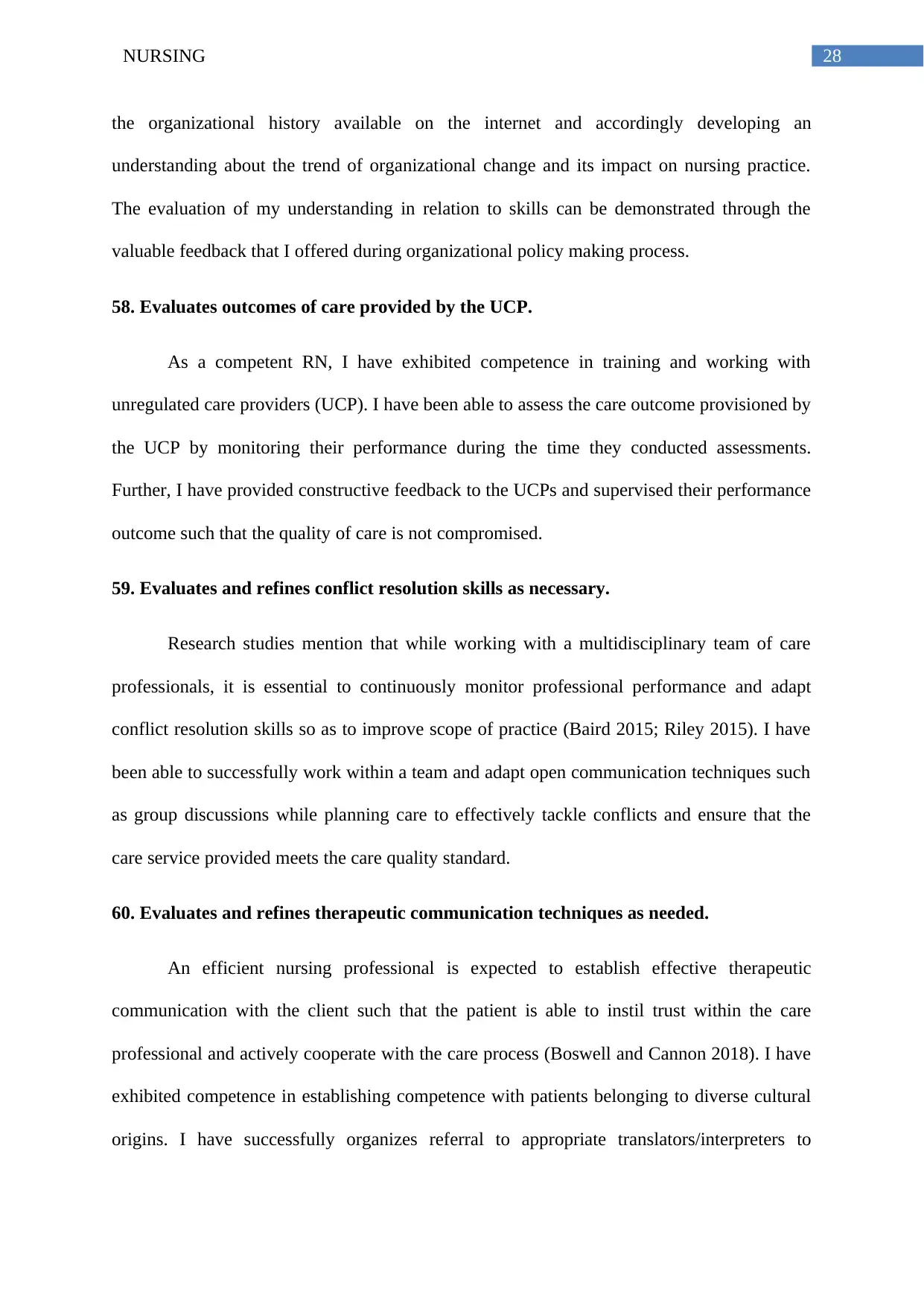
28NURSING
the organizational history available on the internet and accordingly developing an
understanding about the trend of organizational change and its impact on nursing practice.
The evaluation of my understanding in relation to skills can be demonstrated through the
valuable feedback that I offered during organizational policy making process.
58. Evaluates outcomes of care provided by the UCP.
As a competent RN, I have exhibited competence in training and working with
unregulated care providers (UCP). I have been able to assess the care outcome provisioned by
the UCP by monitoring their performance during the time they conducted assessments.
Further, I have provided constructive feedback to the UCPs and supervised their performance
outcome such that the quality of care is not compromised.
59. Evaluates and refines conflict resolution skills as necessary.
Research studies mention that while working with a multidisciplinary team of care
professionals, it is essential to continuously monitor professional performance and adapt
conflict resolution skills so as to improve scope of practice (Baird 2015; Riley 2015). I have
been able to successfully work within a team and adapt open communication techniques such
as group discussions while planning care to effectively tackle conflicts and ensure that the
care service provided meets the care quality standard.
60. Evaluates and refines therapeutic communication techniques as needed.
An efficient nursing professional is expected to establish effective therapeutic
communication with the client such that the patient is able to instil trust within the care
professional and actively cooperate with the care process (Boswell and Cannon 2018). I have
exhibited competence in establishing competence with patients belonging to diverse cultural
origins. I have successfully organizes referral to appropriate translators/interpreters to
the organizational history available on the internet and accordingly developing an
understanding about the trend of organizational change and its impact on nursing practice.
The evaluation of my understanding in relation to skills can be demonstrated through the
valuable feedback that I offered during organizational policy making process.
58. Evaluates outcomes of care provided by the UCP.
As a competent RN, I have exhibited competence in training and working with
unregulated care providers (UCP). I have been able to assess the care outcome provisioned by
the UCP by monitoring their performance during the time they conducted assessments.
Further, I have provided constructive feedback to the UCPs and supervised their performance
outcome such that the quality of care is not compromised.
59. Evaluates and refines conflict resolution skills as necessary.
Research studies mention that while working with a multidisciplinary team of care
professionals, it is essential to continuously monitor professional performance and adapt
conflict resolution skills so as to improve scope of practice (Baird 2015; Riley 2015). I have
been able to successfully work within a team and adapt open communication techniques such
as group discussions while planning care to effectively tackle conflicts and ensure that the
care service provided meets the care quality standard.
60. Evaluates and refines therapeutic communication techniques as needed.
An efficient nursing professional is expected to establish effective therapeutic
communication with the client such that the patient is able to instil trust within the care
professional and actively cooperate with the care process (Boswell and Cannon 2018). I have
exhibited competence in establishing competence with patients belonging to diverse cultural
origins. I have successfully organizes referral to appropriate translators/interpreters to
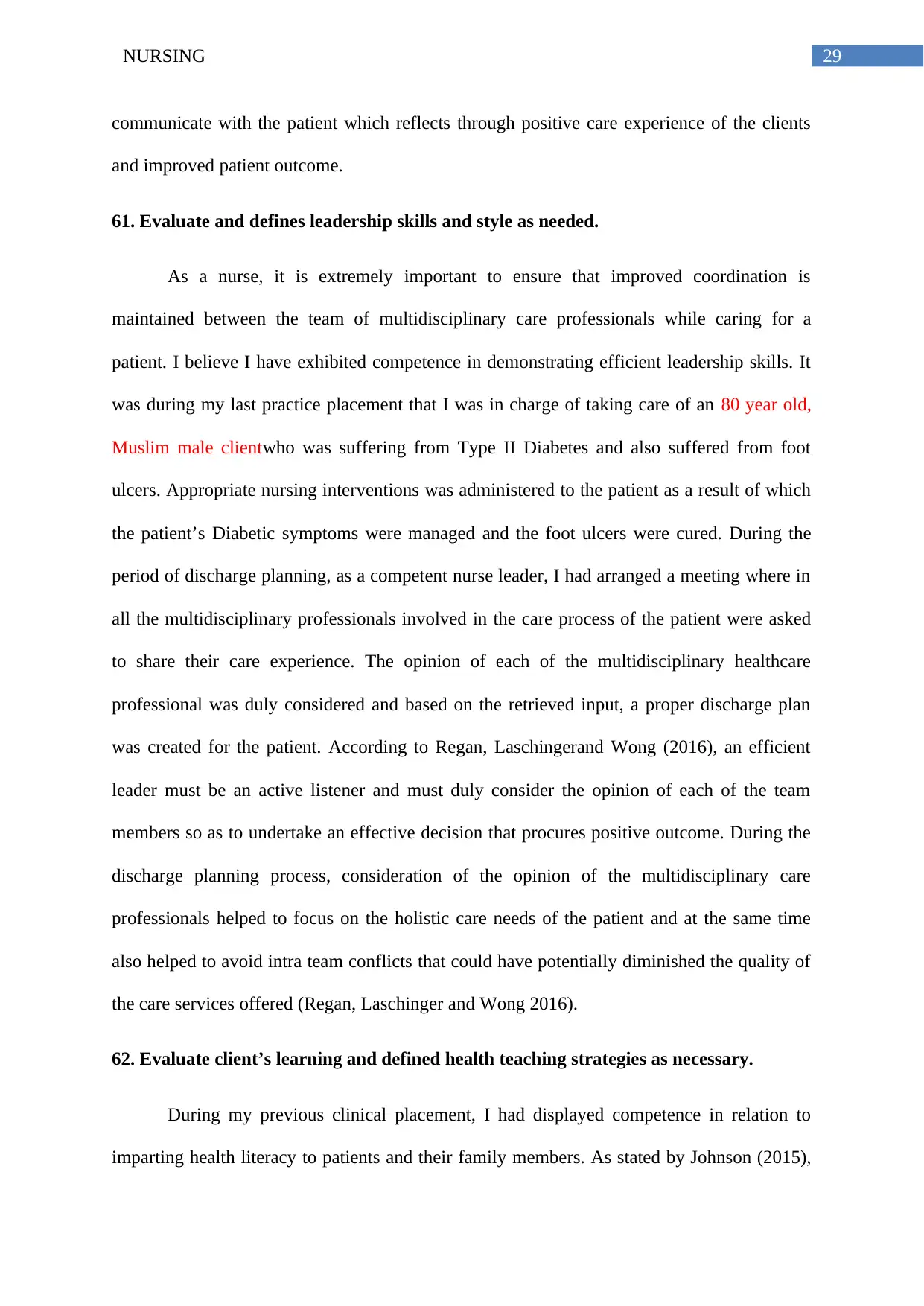
29NURSING
communicate with the patient which reflects through positive care experience of the clients
and improved patient outcome.
61. Evaluate and defines leadership skills and style as needed.
As a nurse, it is extremely important to ensure that improved coordination is
maintained between the team of multidisciplinary care professionals while caring for a
patient. I believe I have exhibited competence in demonstrating efficient leadership skills. It
was during my last practice placement that I was in charge of taking care of an 80 year old,
Muslim male clientwho was suffering from Type II Diabetes and also suffered from foot
ulcers. Appropriate nursing interventions was administered to the patient as a result of which
the patient’s Diabetic symptoms were managed and the foot ulcers were cured. During the
period of discharge planning, as a competent nurse leader, I had arranged a meeting where in
all the multidisciplinary professionals involved in the care process of the patient were asked
to share their care experience. The opinion of each of the multidisciplinary healthcare
professional was duly considered and based on the retrieved input, a proper discharge plan
was created for the patient. According to Regan, Laschingerand Wong (2016), an efficient
leader must be an active listener and must duly consider the opinion of each of the team
members so as to undertake an effective decision that procures positive outcome. During the
discharge planning process, consideration of the opinion of the multidisciplinary care
professionals helped to focus on the holistic care needs of the patient and at the same time
also helped to avoid intra team conflicts that could have potentially diminished the quality of
the care services offered (Regan, Laschinger and Wong 2016).
62. Evaluate client’s learning and defined health teaching strategies as necessary.
During my previous clinical placement, I had displayed competence in relation to
imparting health literacy to patients and their family members. As stated by Johnson (2015),
communicate with the patient which reflects through positive care experience of the clients
and improved patient outcome.
61. Evaluate and defines leadership skills and style as needed.
As a nurse, it is extremely important to ensure that improved coordination is
maintained between the team of multidisciplinary care professionals while caring for a
patient. I believe I have exhibited competence in demonstrating efficient leadership skills. It
was during my last practice placement that I was in charge of taking care of an 80 year old,
Muslim male clientwho was suffering from Type II Diabetes and also suffered from foot
ulcers. Appropriate nursing interventions was administered to the patient as a result of which
the patient’s Diabetic symptoms were managed and the foot ulcers were cured. During the
period of discharge planning, as a competent nurse leader, I had arranged a meeting where in
all the multidisciplinary professionals involved in the care process of the patient were asked
to share their care experience. The opinion of each of the multidisciplinary healthcare
professional was duly considered and based on the retrieved input, a proper discharge plan
was created for the patient. According to Regan, Laschingerand Wong (2016), an efficient
leader must be an active listener and must duly consider the opinion of each of the team
members so as to undertake an effective decision that procures positive outcome. During the
discharge planning process, consideration of the opinion of the multidisciplinary care
professionals helped to focus on the holistic care needs of the patient and at the same time
also helped to avoid intra team conflicts that could have potentially diminished the quality of
the care services offered (Regan, Laschinger and Wong 2016).
62. Evaluate client’s learning and defined health teaching strategies as necessary.
During my previous clinical placement, I had displayed competence in relation to
imparting health literacy to patients and their family members. As stated by Johnson (2015),
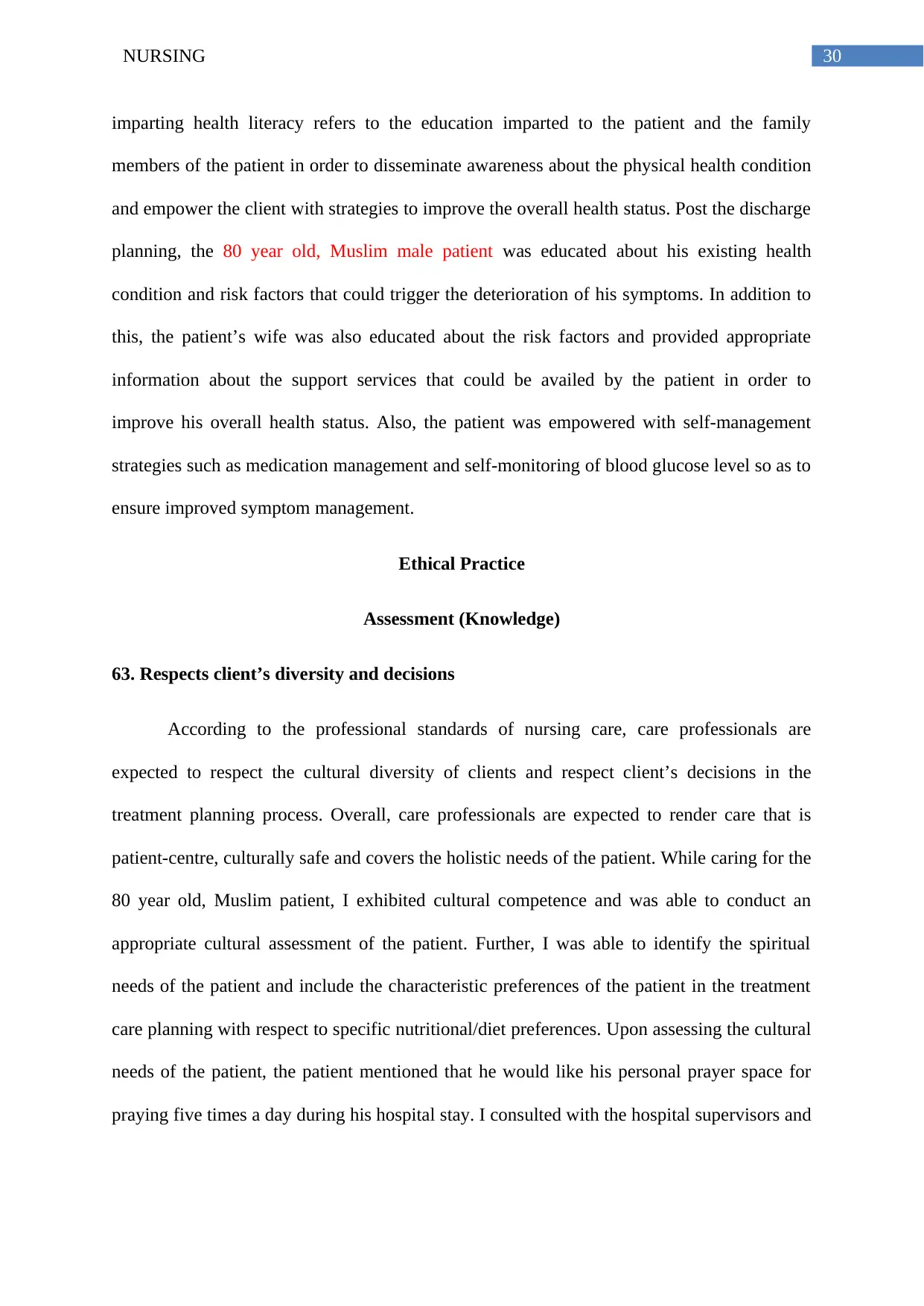
30NURSING
imparting health literacy refers to the education imparted to the patient and the family
members of the patient in order to disseminate awareness about the physical health condition
and empower the client with strategies to improve the overall health status. Post the discharge
planning, the 80 year old, Muslim male patient was educated about his existing health
condition and risk factors that could trigger the deterioration of his symptoms. In addition to
this, the patient’s wife was also educated about the risk factors and provided appropriate
information about the support services that could be availed by the patient in order to
improve his overall health status. Also, the patient was empowered with self-management
strategies such as medication management and self-monitoring of blood glucose level so as to
ensure improved symptom management.
Ethical Practice
Assessment (Knowledge)
63. Respects client’s diversity and decisions
According to the professional standards of nursing care, care professionals are
expected to respect the cultural diversity of clients and respect client’s decisions in the
treatment planning process. Overall, care professionals are expected to render care that is
patient-centre, culturally safe and covers the holistic needs of the patient. While caring for the
80 year old, Muslim patient, I exhibited cultural competence and was able to conduct an
appropriate cultural assessment of the patient. Further, I was able to identify the spiritual
needs of the patient and include the characteristic preferences of the patient in the treatment
care planning with respect to specific nutritional/diet preferences. Upon assessing the cultural
needs of the patient, the patient mentioned that he would like his personal prayer space for
praying five times a day during his hospital stay. I consulted with the hospital supervisors and
imparting health literacy refers to the education imparted to the patient and the family
members of the patient in order to disseminate awareness about the physical health condition
and empower the client with strategies to improve the overall health status. Post the discharge
planning, the 80 year old, Muslim male patient was educated about his existing health
condition and risk factors that could trigger the deterioration of his symptoms. In addition to
this, the patient’s wife was also educated about the risk factors and provided appropriate
information about the support services that could be availed by the patient in order to
improve his overall health status. Also, the patient was empowered with self-management
strategies such as medication management and self-monitoring of blood glucose level so as to
ensure improved symptom management.
Ethical Practice
Assessment (Knowledge)
63. Respects client’s diversity and decisions
According to the professional standards of nursing care, care professionals are
expected to respect the cultural diversity of clients and respect client’s decisions in the
treatment planning process. Overall, care professionals are expected to render care that is
patient-centre, culturally safe and covers the holistic needs of the patient. While caring for the
80 year old, Muslim patient, I exhibited cultural competence and was able to conduct an
appropriate cultural assessment of the patient. Further, I was able to identify the spiritual
needs of the patient and include the characteristic preferences of the patient in the treatment
care planning with respect to specific nutritional/diet preferences. Upon assessing the cultural
needs of the patient, the patient mentioned that he would like his personal prayer space for
praying five times a day during his hospital stay. I consulted with the hospital supervisors and
Paraphrase This Document
Need a fresh take? Get an instant paraphrase of this document with our AI Paraphraser
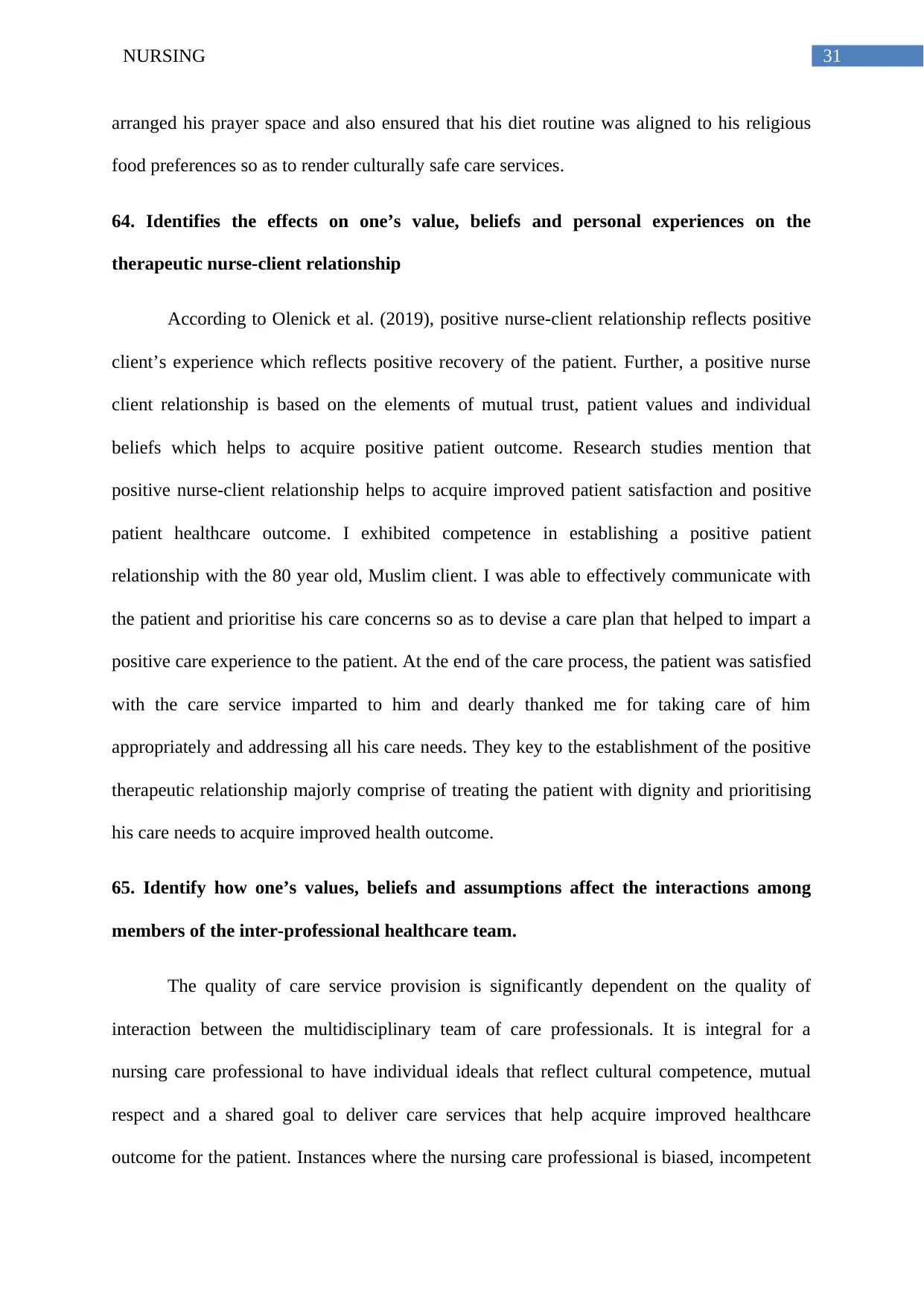
31NURSING
arranged his prayer space and also ensured that his diet routine was aligned to his religious
food preferences so as to render culturally safe care services.
64. Identifies the effects on one’s value, beliefs and personal experiences on the
therapeutic nurse-client relationship
According to Olenick et al. (2019), positive nurse-client relationship reflects positive
client’s experience which reflects positive recovery of the patient. Further, a positive nurse
client relationship is based on the elements of mutual trust, patient values and individual
beliefs which helps to acquire positive patient outcome. Research studies mention that
positive nurse-client relationship helps to acquire improved patient satisfaction and positive
patient healthcare outcome. I exhibited competence in establishing a positive patient
relationship with the 80 year old, Muslim client. I was able to effectively communicate with
the patient and prioritise his care concerns so as to devise a care plan that helped to impart a
positive care experience to the patient. At the end of the care process, the patient was satisfied
with the care service imparted to him and dearly thanked me for taking care of him
appropriately and addressing all his care needs. They key to the establishment of the positive
therapeutic relationship majorly comprise of treating the patient with dignity and prioritising
his care needs to acquire improved health outcome.
65. Identify how one’s values, beliefs and assumptions affect the interactions among
members of the inter-professional healthcare team.
The quality of care service provision is significantly dependent on the quality of
interaction between the multidisciplinary team of care professionals. It is integral for a
nursing care professional to have individual ideals that reflect cultural competence, mutual
respect and a shared goal to deliver care services that help acquire improved healthcare
outcome for the patient. Instances where the nursing care professional is biased, incompetent
arranged his prayer space and also ensured that his diet routine was aligned to his religious
food preferences so as to render culturally safe care services.
64. Identifies the effects on one’s value, beliefs and personal experiences on the
therapeutic nurse-client relationship
According to Olenick et al. (2019), positive nurse-client relationship reflects positive
client’s experience which reflects positive recovery of the patient. Further, a positive nurse
client relationship is based on the elements of mutual trust, patient values and individual
beliefs which helps to acquire positive patient outcome. Research studies mention that
positive nurse-client relationship helps to acquire improved patient satisfaction and positive
patient healthcare outcome. I exhibited competence in establishing a positive patient
relationship with the 80 year old, Muslim client. I was able to effectively communicate with
the patient and prioritise his care concerns so as to devise a care plan that helped to impart a
positive care experience to the patient. At the end of the care process, the patient was satisfied
with the care service imparted to him and dearly thanked me for taking care of him
appropriately and addressing all his care needs. They key to the establishment of the positive
therapeutic relationship majorly comprise of treating the patient with dignity and prioritising
his care needs to acquire improved health outcome.
65. Identify how one’s values, beliefs and assumptions affect the interactions among
members of the inter-professional healthcare team.
The quality of care service provision is significantly dependent on the quality of
interaction between the multidisciplinary team of care professionals. It is integral for a
nursing care professional to have individual ideals that reflect cultural competence, mutual
respect and a shared goal to deliver care services that help acquire improved healthcare
outcome for the patient. Instances where the nursing care professional is biased, incompetent
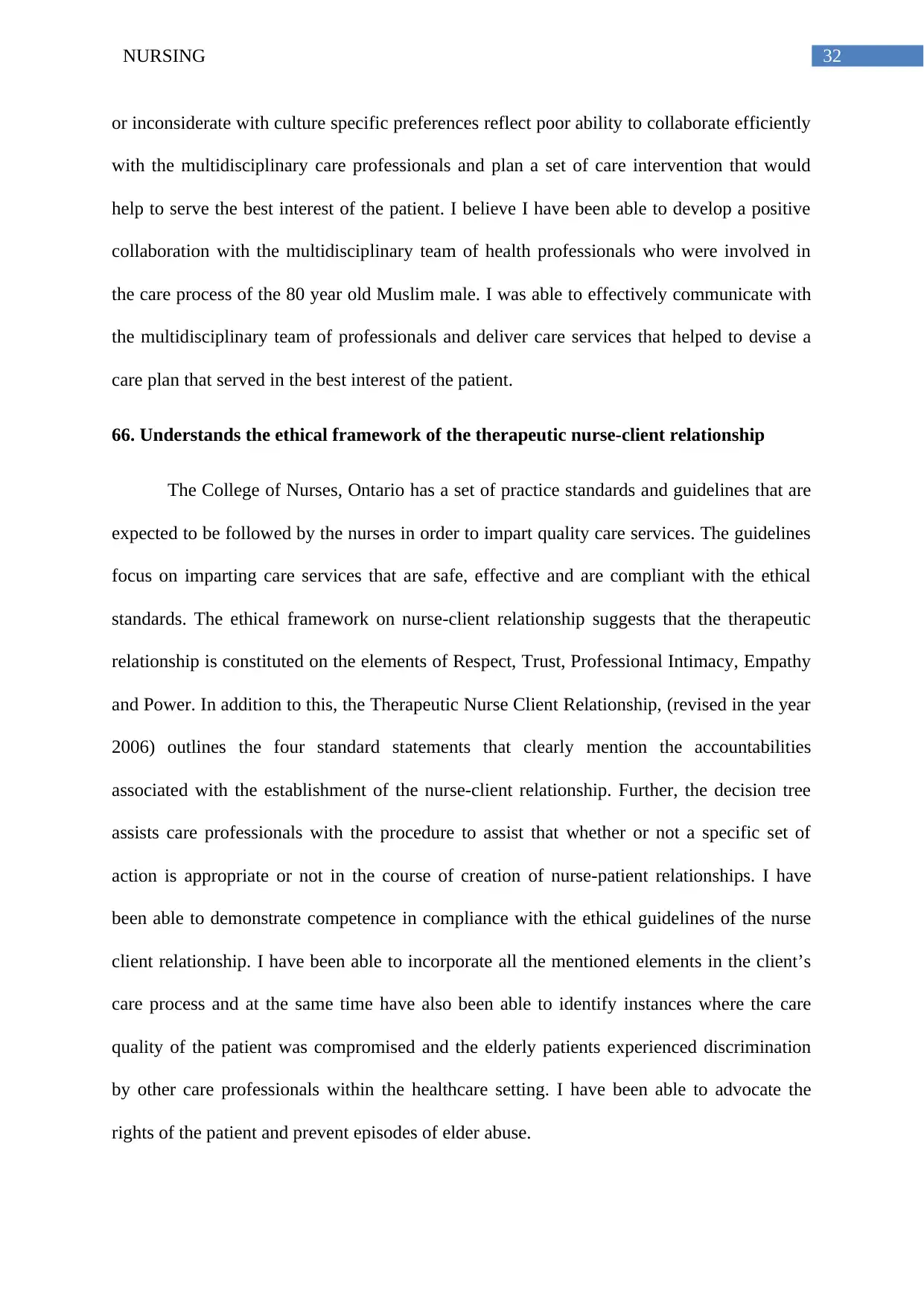
32NURSING
or inconsiderate with culture specific preferences reflect poor ability to collaborate efficiently
with the multidisciplinary care professionals and plan a set of care intervention that would
help to serve the best interest of the patient. I believe I have been able to develop a positive
collaboration with the multidisciplinary team of health professionals who were involved in
the care process of the 80 year old Muslim male. I was able to effectively communicate with
the multidisciplinary team of professionals and deliver care services that helped to devise a
care plan that served in the best interest of the patient.
66. Understands the ethical framework of the therapeutic nurse-client relationship
The College of Nurses, Ontario has a set of practice standards and guidelines that are
expected to be followed by the nurses in order to impart quality care services. The guidelines
focus on imparting care services that are safe, effective and are compliant with the ethical
standards. The ethical framework on nurse-client relationship suggests that the therapeutic
relationship is constituted on the elements of Respect, Trust, Professional Intimacy, Empathy
and Power. In addition to this, the Therapeutic Nurse Client Relationship, (revised in the year
2006) outlines the four standard statements that clearly mention the accountabilities
associated with the establishment of the nurse-client relationship. Further, the decision tree
assists care professionals with the procedure to assist that whether or not a specific set of
action is appropriate or not in the course of creation of nurse-patient relationships. I have
been able to demonstrate competence in compliance with the ethical guidelines of the nurse
client relationship. I have been able to incorporate all the mentioned elements in the client’s
care process and at the same time have also been able to identify instances where the care
quality of the patient was compromised and the elderly patients experienced discrimination
by other care professionals within the healthcare setting. I have been able to advocate the
rights of the patient and prevent episodes of elder abuse.
or inconsiderate with culture specific preferences reflect poor ability to collaborate efficiently
with the multidisciplinary care professionals and plan a set of care intervention that would
help to serve the best interest of the patient. I believe I have been able to develop a positive
collaboration with the multidisciplinary team of health professionals who were involved in
the care process of the 80 year old Muslim male. I was able to effectively communicate with
the multidisciplinary team of professionals and deliver care services that helped to devise a
care plan that served in the best interest of the patient.
66. Understands the ethical framework of the therapeutic nurse-client relationship
The College of Nurses, Ontario has a set of practice standards and guidelines that are
expected to be followed by the nurses in order to impart quality care services. The guidelines
focus on imparting care services that are safe, effective and are compliant with the ethical
standards. The ethical framework on nurse-client relationship suggests that the therapeutic
relationship is constituted on the elements of Respect, Trust, Professional Intimacy, Empathy
and Power. In addition to this, the Therapeutic Nurse Client Relationship, (revised in the year
2006) outlines the four standard statements that clearly mention the accountabilities
associated with the establishment of the nurse-client relationship. Further, the decision tree
assists care professionals with the procedure to assist that whether or not a specific set of
action is appropriate or not in the course of creation of nurse-patient relationships. I have
been able to demonstrate competence in compliance with the ethical guidelines of the nurse
client relationship. I have been able to incorporate all the mentioned elements in the client’s
care process and at the same time have also been able to identify instances where the care
quality of the patient was compromised and the elderly patients experienced discrimination
by other care professionals within the healthcare setting. I have been able to advocate the
rights of the patient and prevent episodes of elder abuse.
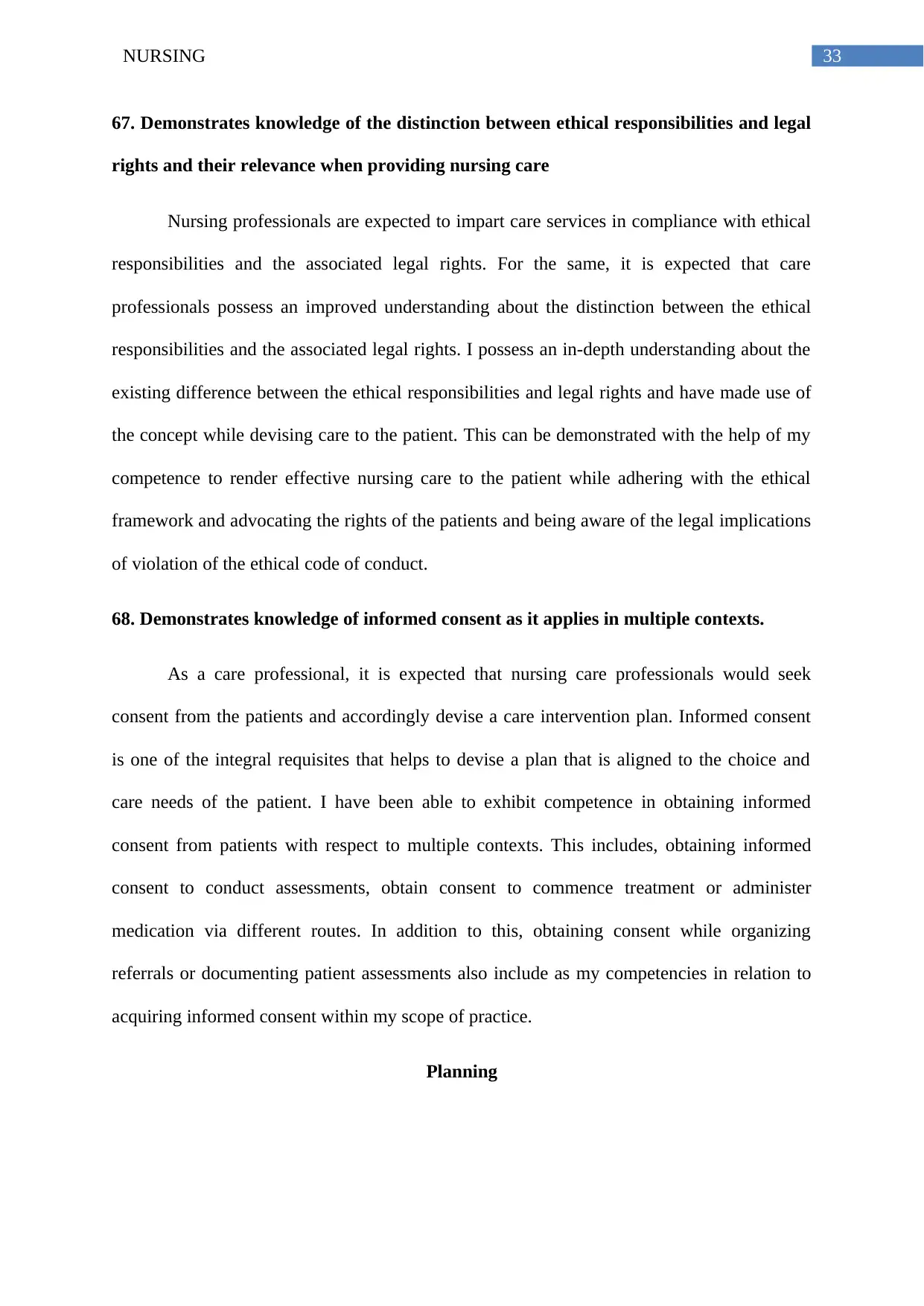
33NURSING
67. Demonstrates knowledge of the distinction between ethical responsibilities and legal
rights and their relevance when providing nursing care
Nursing professionals are expected to impart care services in compliance with ethical
responsibilities and the associated legal rights. For the same, it is expected that care
professionals possess an improved understanding about the distinction between the ethical
responsibilities and the associated legal rights. I possess an in-depth understanding about the
existing difference between the ethical responsibilities and legal rights and have made use of
the concept while devising care to the patient. This can be demonstrated with the help of my
competence to render effective nursing care to the patient while adhering with the ethical
framework and advocating the rights of the patients and being aware of the legal implications
of violation of the ethical code of conduct.
68. Demonstrates knowledge of informed consent as it applies in multiple contexts.
As a care professional, it is expected that nursing care professionals would seek
consent from the patients and accordingly devise a care intervention plan. Informed consent
is one of the integral requisites that helps to devise a plan that is aligned to the choice and
care needs of the patient. I have been able to exhibit competence in obtaining informed
consent from patients with respect to multiple contexts. This includes, obtaining informed
consent to conduct assessments, obtain consent to commence treatment or administer
medication via different routes. In addition to this, obtaining consent while organizing
referrals or documenting patient assessments also include as my competencies in relation to
acquiring informed consent within my scope of practice.
Planning
67. Demonstrates knowledge of the distinction between ethical responsibilities and legal
rights and their relevance when providing nursing care
Nursing professionals are expected to impart care services in compliance with ethical
responsibilities and the associated legal rights. For the same, it is expected that care
professionals possess an improved understanding about the distinction between the ethical
responsibilities and the associated legal rights. I possess an in-depth understanding about the
existing difference between the ethical responsibilities and legal rights and have made use of
the concept while devising care to the patient. This can be demonstrated with the help of my
competence to render effective nursing care to the patient while adhering with the ethical
framework and advocating the rights of the patients and being aware of the legal implications
of violation of the ethical code of conduct.
68. Demonstrates knowledge of informed consent as it applies in multiple contexts.
As a care professional, it is expected that nursing care professionals would seek
consent from the patients and accordingly devise a care intervention plan. Informed consent
is one of the integral requisites that helps to devise a plan that is aligned to the choice and
care needs of the patient. I have been able to exhibit competence in obtaining informed
consent from patients with respect to multiple contexts. This includes, obtaining informed
consent to conduct assessments, obtain consent to commence treatment or administer
medication via different routes. In addition to this, obtaining consent while organizing
referrals or documenting patient assessments also include as my competencies in relation to
acquiring informed consent within my scope of practice.
Planning
Secure Best Marks with AI Grader
Need help grading? Try our AI Grader for instant feedback on your assignments.
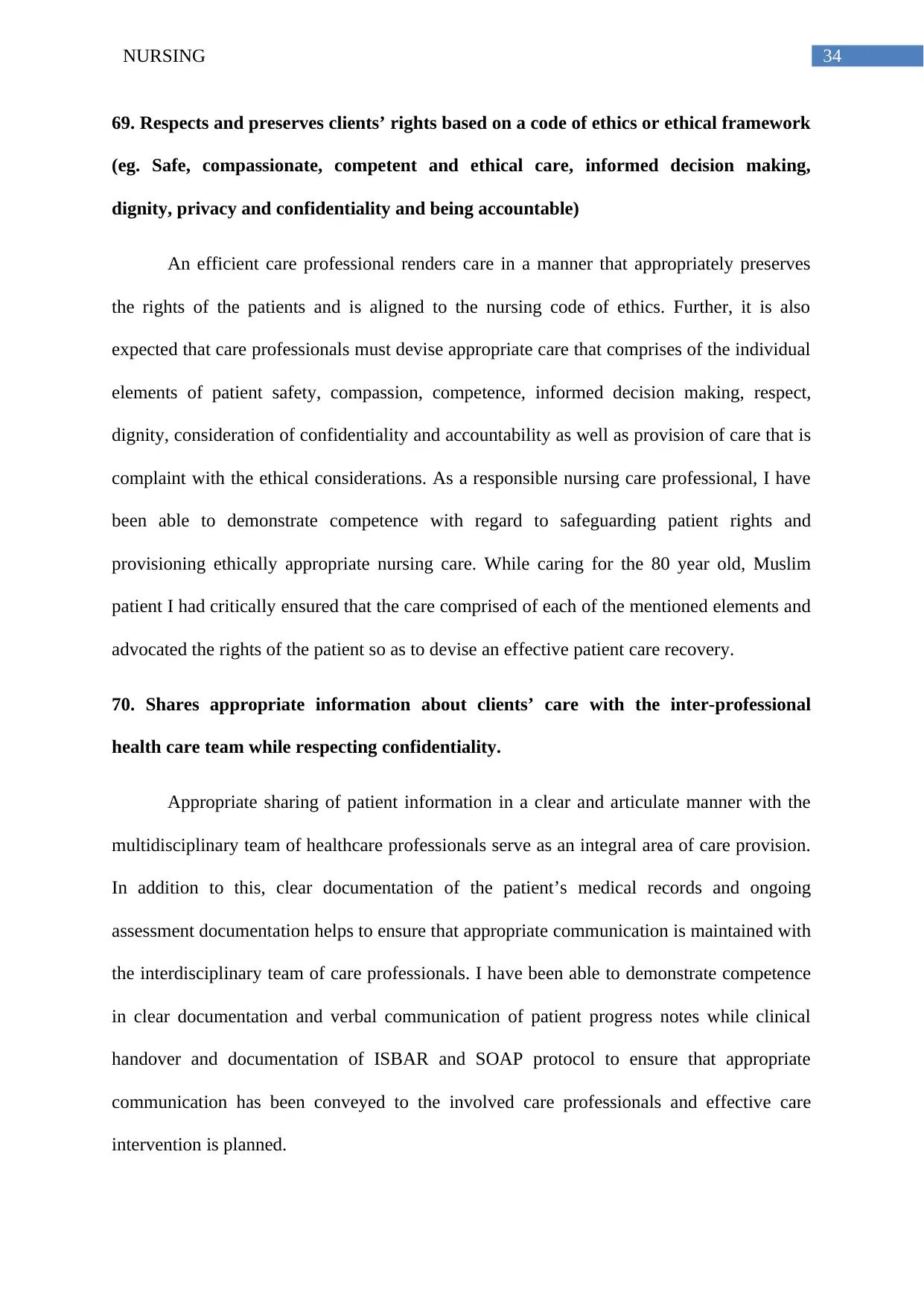
34NURSING
69. Respects and preserves clients’ rights based on a code of ethics or ethical framework
(eg. Safe, compassionate, competent and ethical care, informed decision making,
dignity, privacy and confidentiality and being accountable)
An efficient care professional renders care in a manner that appropriately preserves
the rights of the patients and is aligned to the nursing code of ethics. Further, it is also
expected that care professionals must devise appropriate care that comprises of the individual
elements of patient safety, compassion, competence, informed decision making, respect,
dignity, consideration of confidentiality and accountability as well as provision of care that is
complaint with the ethical considerations. As a responsible nursing care professional, I have
been able to demonstrate competence with regard to safeguarding patient rights and
provisioning ethically appropriate nursing care. While caring for the 80 year old, Muslim
patient I had critically ensured that the care comprised of each of the mentioned elements and
advocated the rights of the patient so as to devise an effective patient care recovery.
70. Shares appropriate information about clients’ care with the inter-professional
health care team while respecting confidentiality.
Appropriate sharing of patient information in a clear and articulate manner with the
multidisciplinary team of healthcare professionals serve as an integral area of care provision.
In addition to this, clear documentation of the patient’s medical records and ongoing
assessment documentation helps to ensure that appropriate communication is maintained with
the interdisciplinary team of care professionals. I have been able to demonstrate competence
in clear documentation and verbal communication of patient progress notes while clinical
handover and documentation of ISBAR and SOAP protocol to ensure that appropriate
communication has been conveyed to the involved care professionals and effective care
intervention is planned.
69. Respects and preserves clients’ rights based on a code of ethics or ethical framework
(eg. Safe, compassionate, competent and ethical care, informed decision making,
dignity, privacy and confidentiality and being accountable)
An efficient care professional renders care in a manner that appropriately preserves
the rights of the patients and is aligned to the nursing code of ethics. Further, it is also
expected that care professionals must devise appropriate care that comprises of the individual
elements of patient safety, compassion, competence, informed decision making, respect,
dignity, consideration of confidentiality and accountability as well as provision of care that is
complaint with the ethical considerations. As a responsible nursing care professional, I have
been able to demonstrate competence with regard to safeguarding patient rights and
provisioning ethically appropriate nursing care. While caring for the 80 year old, Muslim
patient I had critically ensured that the care comprised of each of the mentioned elements and
advocated the rights of the patient so as to devise an effective patient care recovery.
70. Shares appropriate information about clients’ care with the inter-professional
health care team while respecting confidentiality.
Appropriate sharing of patient information in a clear and articulate manner with the
multidisciplinary team of healthcare professionals serve as an integral area of care provision.
In addition to this, clear documentation of the patient’s medical records and ongoing
assessment documentation helps to ensure that appropriate communication is maintained with
the interdisciplinary team of care professionals. I have been able to demonstrate competence
in clear documentation and verbal communication of patient progress notes while clinical
handover and documentation of ISBAR and SOAP protocol to ensure that appropriate
communication has been conveyed to the involved care professionals and effective care
intervention is planned.
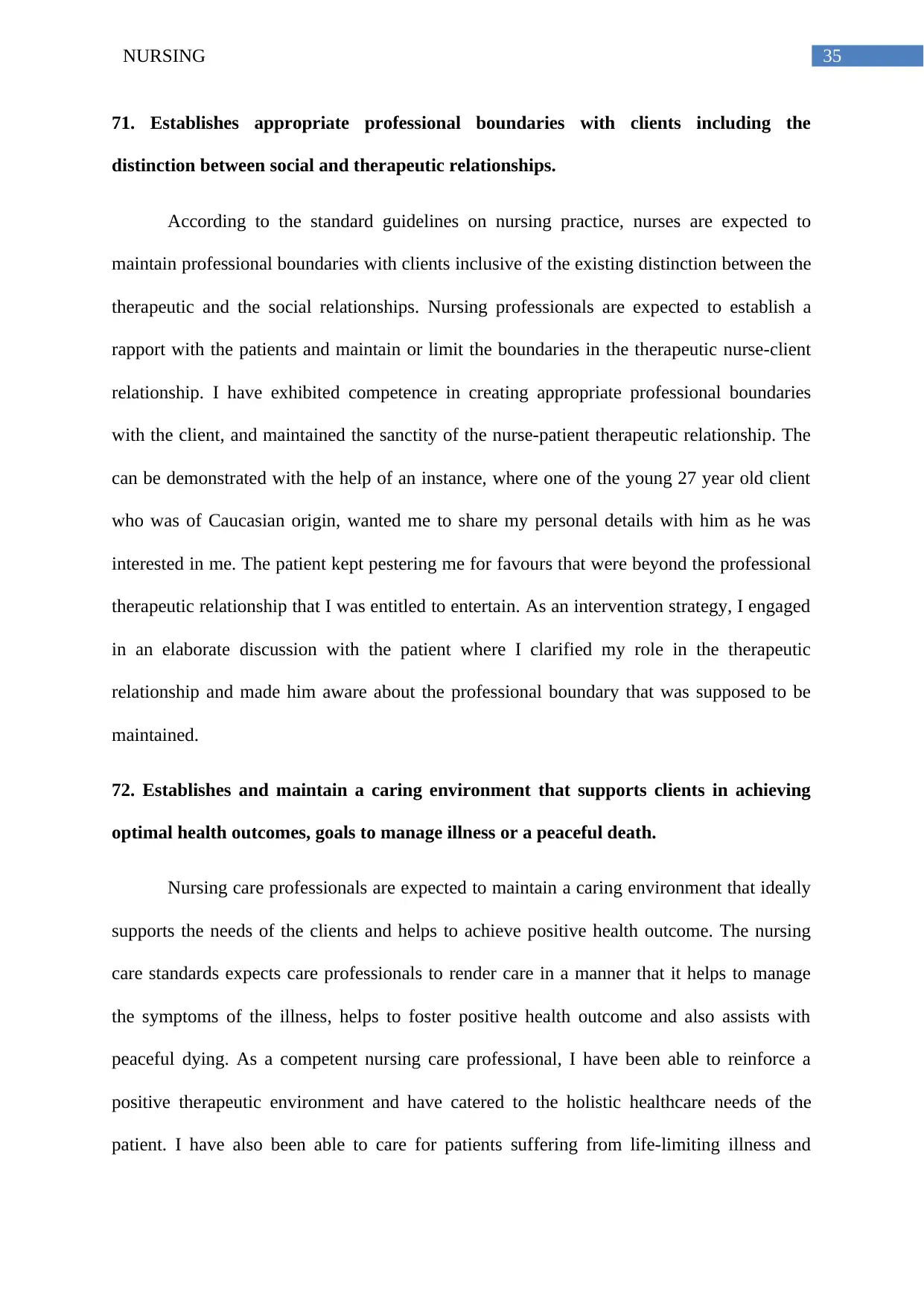
35NURSING
71. Establishes appropriate professional boundaries with clients including the
distinction between social and therapeutic relationships.
According to the standard guidelines on nursing practice, nurses are expected to
maintain professional boundaries with clients inclusive of the existing distinction between the
therapeutic and the social relationships. Nursing professionals are expected to establish a
rapport with the patients and maintain or limit the boundaries in the therapeutic nurse-client
relationship. I have exhibited competence in creating appropriate professional boundaries
with the client, and maintained the sanctity of the nurse-patient therapeutic relationship. The
can be demonstrated with the help of an instance, where one of the young 27 year old client
who was of Caucasian origin, wanted me to share my personal details with him as he was
interested in me. The patient kept pestering me for favours that were beyond the professional
therapeutic relationship that I was entitled to entertain. As an intervention strategy, I engaged
in an elaborate discussion with the patient where I clarified my role in the therapeutic
relationship and made him aware about the professional boundary that was supposed to be
maintained.
72. Establishes and maintain a caring environment that supports clients in achieving
optimal health outcomes, goals to manage illness or a peaceful death.
Nursing care professionals are expected to maintain a caring environment that ideally
supports the needs of the clients and helps to achieve positive health outcome. The nursing
care standards expects care professionals to render care in a manner that it helps to manage
the symptoms of the illness, helps to foster positive health outcome and also assists with
peaceful dying. As a competent nursing care professional, I have been able to reinforce a
positive therapeutic environment and have catered to the holistic healthcare needs of the
patient. I have also been able to care for patients suffering from life-limiting illness and
71. Establishes appropriate professional boundaries with clients including the
distinction between social and therapeutic relationships.
According to the standard guidelines on nursing practice, nurses are expected to
maintain professional boundaries with clients inclusive of the existing distinction between the
therapeutic and the social relationships. Nursing professionals are expected to establish a
rapport with the patients and maintain or limit the boundaries in the therapeutic nurse-client
relationship. I have exhibited competence in creating appropriate professional boundaries
with the client, and maintained the sanctity of the nurse-patient therapeutic relationship. The
can be demonstrated with the help of an instance, where one of the young 27 year old client
who was of Caucasian origin, wanted me to share my personal details with him as he was
interested in me. The patient kept pestering me for favours that were beyond the professional
therapeutic relationship that I was entitled to entertain. As an intervention strategy, I engaged
in an elaborate discussion with the patient where I clarified my role in the therapeutic
relationship and made him aware about the professional boundary that was supposed to be
maintained.
72. Establishes and maintain a caring environment that supports clients in achieving
optimal health outcomes, goals to manage illness or a peaceful death.
Nursing care professionals are expected to maintain a caring environment that ideally
supports the needs of the clients and helps to achieve positive health outcome. The nursing
care standards expects care professionals to render care in a manner that it helps to manage
the symptoms of the illness, helps to foster positive health outcome and also assists with
peaceful dying. As a competent nursing care professional, I have been able to reinforce a
positive therapeutic environment and have catered to the holistic healthcare needs of the
patient. I have also been able to care for patients suffering from life-limiting illness and
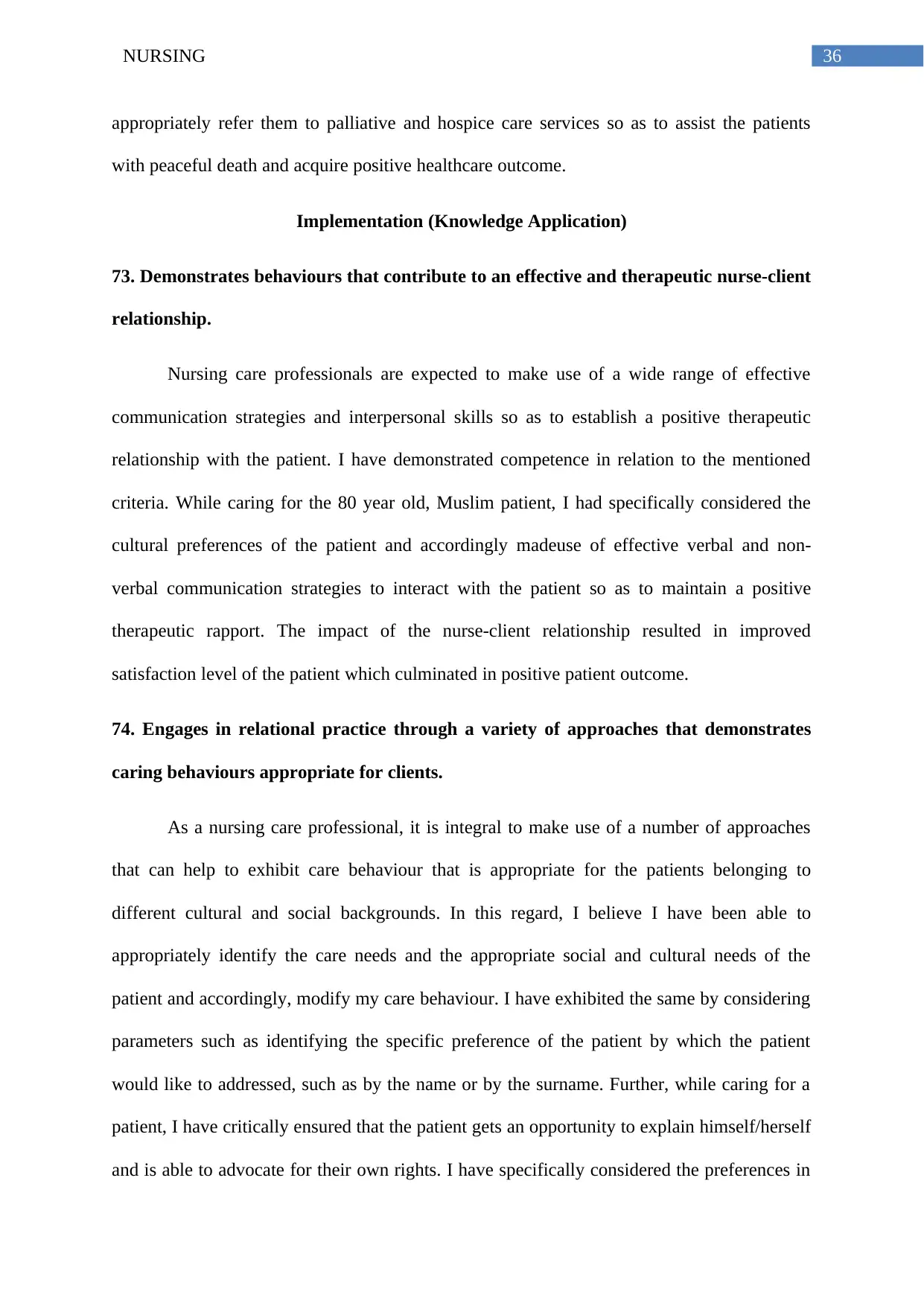
36NURSING
appropriately refer them to palliative and hospice care services so as to assist the patients
with peaceful death and acquire positive healthcare outcome.
Implementation (Knowledge Application)
73. Demonstrates behaviours that contribute to an effective and therapeutic nurse-client
relationship.
Nursing care professionals are expected to make use of a wide range of effective
communication strategies and interpersonal skills so as to establish a positive therapeutic
relationship with the patient. I have demonstrated competence in relation to the mentioned
criteria. While caring for the 80 year old, Muslim patient, I had specifically considered the
cultural preferences of the patient and accordingly madeuse of effective verbal and non-
verbal communication strategies to interact with the patient so as to maintain a positive
therapeutic rapport. The impact of the nurse-client relationship resulted in improved
satisfaction level of the patient which culminated in positive patient outcome.
74. Engages in relational practice through a variety of approaches that demonstrates
caring behaviours appropriate for clients.
As a nursing care professional, it is integral to make use of a number of approaches
that can help to exhibit care behaviour that is appropriate for the patients belonging to
different cultural and social backgrounds. In this regard, I believe I have been able to
appropriately identify the care needs and the appropriate social and cultural needs of the
patient and accordingly, modify my care behaviour. I have exhibited the same by considering
parameters such as identifying the specific preference of the patient by which the patient
would like to addressed, such as by the name or by the surname. Further, while caring for a
patient, I have critically ensured that the patient gets an opportunity to explain himself/herself
and is able to advocate for their own rights. I have specifically considered the preferences in
appropriately refer them to palliative and hospice care services so as to assist the patients
with peaceful death and acquire positive healthcare outcome.
Implementation (Knowledge Application)
73. Demonstrates behaviours that contribute to an effective and therapeutic nurse-client
relationship.
Nursing care professionals are expected to make use of a wide range of effective
communication strategies and interpersonal skills so as to establish a positive therapeutic
relationship with the patient. I have demonstrated competence in relation to the mentioned
criteria. While caring for the 80 year old, Muslim patient, I had specifically considered the
cultural preferences of the patient and accordingly madeuse of effective verbal and non-
verbal communication strategies to interact with the patient so as to maintain a positive
therapeutic rapport. The impact of the nurse-client relationship resulted in improved
satisfaction level of the patient which culminated in positive patient outcome.
74. Engages in relational practice through a variety of approaches that demonstrates
caring behaviours appropriate for clients.
As a nursing care professional, it is integral to make use of a number of approaches
that can help to exhibit care behaviour that is appropriate for the patients belonging to
different cultural and social backgrounds. In this regard, I believe I have been able to
appropriately identify the care needs and the appropriate social and cultural needs of the
patient and accordingly, modify my care behaviour. I have exhibited the same by considering
parameters such as identifying the specific preference of the patient by which the patient
would like to addressed, such as by the name or by the surname. Further, while caring for a
patient, I have critically ensured that the patient gets an opportunity to explain himself/herself
and is able to advocate for their own rights. I have specifically considered the preferences in
Paraphrase This Document
Need a fresh take? Get an instant paraphrase of this document with our AI Paraphraser
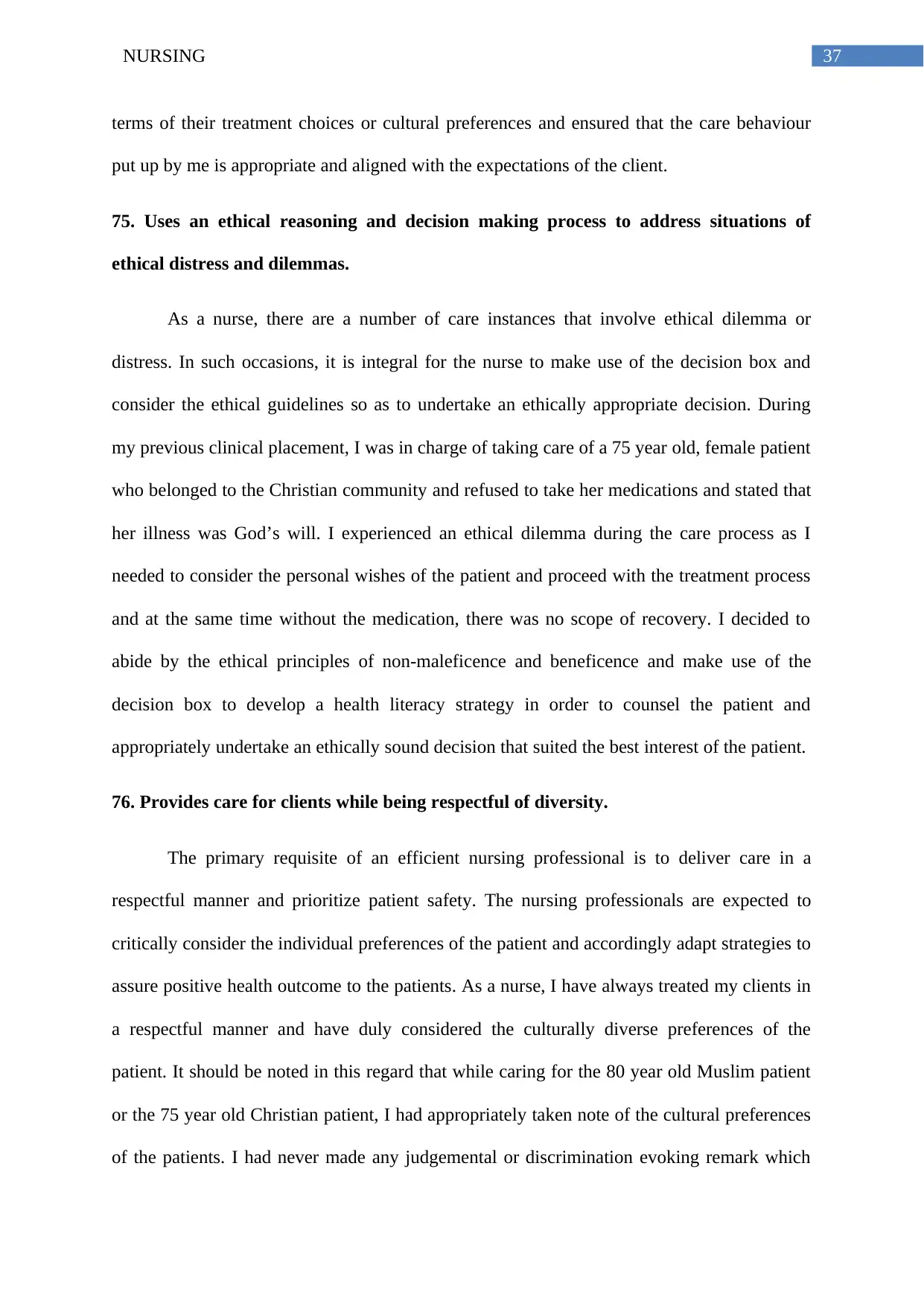
37NURSING
terms of their treatment choices or cultural preferences and ensured that the care behaviour
put up by me is appropriate and aligned with the expectations of the client.
75. Uses an ethical reasoning and decision making process to address situations of
ethical distress and dilemmas.
As a nurse, there are a number of care instances that involve ethical dilemma or
distress. In such occasions, it is integral for the nurse to make use of the decision box and
consider the ethical guidelines so as to undertake an ethically appropriate decision. During
my previous clinical placement, I was in charge of taking care of a 75 year old, female patient
who belonged to the Christian community and refused to take her medications and stated that
her illness was God’s will. I experienced an ethical dilemma during the care process as I
needed to consider the personal wishes of the patient and proceed with the treatment process
and at the same time without the medication, there was no scope of recovery. I decided to
abide by the ethical principles of non-maleficence and beneficence and make use of the
decision box to develop a health literacy strategy in order to counsel the patient and
appropriately undertake an ethically sound decision that suited the best interest of the patient.
76. Provides care for clients while being respectful of diversity.
The primary requisite of an efficient nursing professional is to deliver care in a
respectful manner and prioritize patient safety. The nursing professionals are expected to
critically consider the individual preferences of the patient and accordingly adapt strategies to
assure positive health outcome to the patients. As a nurse, I have always treated my clients in
a respectful manner and have duly considered the culturally diverse preferences of the
patient. It should be noted in this regard that while caring for the 80 year old Muslim patient
or the 75 year old Christian patient, I had appropriately taken note of the cultural preferences
of the patients. I had never made any judgemental or discrimination evoking remark which
terms of their treatment choices or cultural preferences and ensured that the care behaviour
put up by me is appropriate and aligned with the expectations of the client.
75. Uses an ethical reasoning and decision making process to address situations of
ethical distress and dilemmas.
As a nurse, there are a number of care instances that involve ethical dilemma or
distress. In such occasions, it is integral for the nurse to make use of the decision box and
consider the ethical guidelines so as to undertake an ethically appropriate decision. During
my previous clinical placement, I was in charge of taking care of a 75 year old, female patient
who belonged to the Christian community and refused to take her medications and stated that
her illness was God’s will. I experienced an ethical dilemma during the care process as I
needed to consider the personal wishes of the patient and proceed with the treatment process
and at the same time without the medication, there was no scope of recovery. I decided to
abide by the ethical principles of non-maleficence and beneficence and make use of the
decision box to develop a health literacy strategy in order to counsel the patient and
appropriately undertake an ethically sound decision that suited the best interest of the patient.
76. Provides care for clients while being respectful of diversity.
The primary requisite of an efficient nursing professional is to deliver care in a
respectful manner and prioritize patient safety. The nursing professionals are expected to
critically consider the individual preferences of the patient and accordingly adapt strategies to
assure positive health outcome to the patients. As a nurse, I have always treated my clients in
a respectful manner and have duly considered the culturally diverse preferences of the
patient. It should be noted in this regard that while caring for the 80 year old Muslim patient
or the 75 year old Christian patient, I had appropriately taken note of the cultural preferences
of the patients. I had never made any judgemental or discrimination evoking remark which
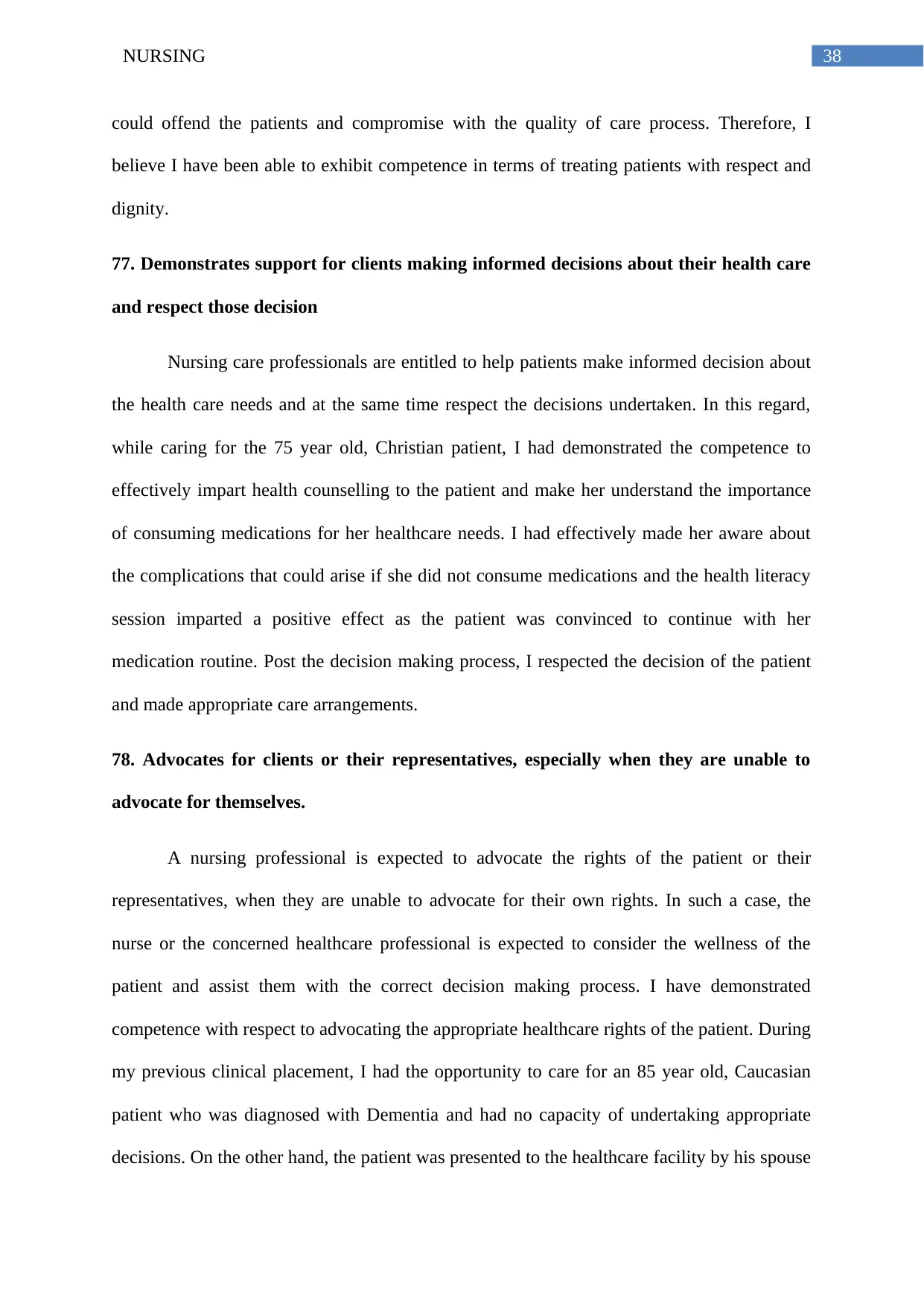
38NURSING
could offend the patients and compromise with the quality of care process. Therefore, I
believe I have been able to exhibit competence in terms of treating patients with respect and
dignity.
77. Demonstrates support for clients making informed decisions about their health care
and respect those decision
Nursing care professionals are entitled to help patients make informed decision about
the health care needs and at the same time respect the decisions undertaken. In this regard,
while caring for the 75 year old, Christian patient, I had demonstrated the competence to
effectively impart health counselling to the patient and make her understand the importance
of consuming medications for her healthcare needs. I had effectively made her aware about
the complications that could arise if she did not consume medications and the health literacy
session imparted a positive effect as the patient was convinced to continue with her
medication routine. Post the decision making process, I respected the decision of the patient
and made appropriate care arrangements.
78. Advocates for clients or their representatives, especially when they are unable to
advocate for themselves.
A nursing professional is expected to advocate the rights of the patient or their
representatives, when they are unable to advocate for their own rights. In such a case, the
nurse or the concerned healthcare professional is expected to consider the wellness of the
patient and assist them with the correct decision making process. I have demonstrated
competence with respect to advocating the appropriate healthcare rights of the patient. During
my previous clinical placement, I had the opportunity to care for an 85 year old, Caucasian
patient who was diagnosed with Dementia and had no capacity of undertaking appropriate
decisions. On the other hand, the patient was presented to the healthcare facility by his spouse
could offend the patients and compromise with the quality of care process. Therefore, I
believe I have been able to exhibit competence in terms of treating patients with respect and
dignity.
77. Demonstrates support for clients making informed decisions about their health care
and respect those decision
Nursing care professionals are entitled to help patients make informed decision about
the health care needs and at the same time respect the decisions undertaken. In this regard,
while caring for the 75 year old, Christian patient, I had demonstrated the competence to
effectively impart health counselling to the patient and make her understand the importance
of consuming medications for her healthcare needs. I had effectively made her aware about
the complications that could arise if she did not consume medications and the health literacy
session imparted a positive effect as the patient was convinced to continue with her
medication routine. Post the decision making process, I respected the decision of the patient
and made appropriate care arrangements.
78. Advocates for clients or their representatives, especially when they are unable to
advocate for themselves.
A nursing professional is expected to advocate the rights of the patient or their
representatives, when they are unable to advocate for their own rights. In such a case, the
nurse or the concerned healthcare professional is expected to consider the wellness of the
patient and assist them with the correct decision making process. I have demonstrated
competence with respect to advocating the appropriate healthcare rights of the patient. During
my previous clinical placement, I had the opportunity to care for an 85 year old, Caucasian
patient who was diagnosed with Dementia and had no capacity of undertaking appropriate
decisions. On the other hand, the patient was presented to the healthcare facility by his spouse
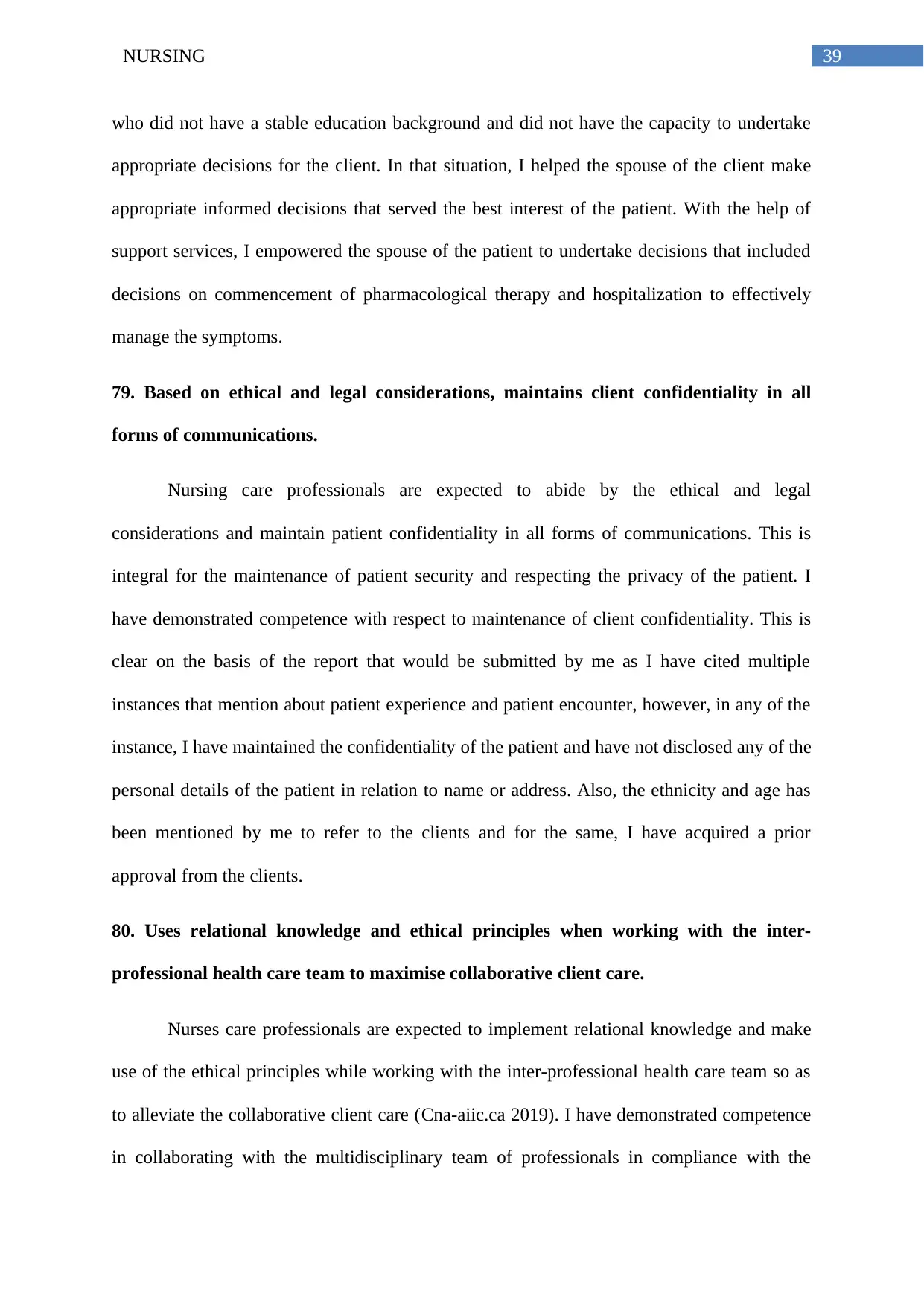
39NURSING
who did not have a stable education background and did not have the capacity to undertake
appropriate decisions for the client. In that situation, I helped the spouse of the client make
appropriate informed decisions that served the best interest of the patient. With the help of
support services, I empowered the spouse of the patient to undertake decisions that included
decisions on commencement of pharmacological therapy and hospitalization to effectively
manage the symptoms.
79. Based on ethical and legal considerations, maintains client confidentiality in all
forms of communications.
Nursing care professionals are expected to abide by the ethical and legal
considerations and maintain patient confidentiality in all forms of communications. This is
integral for the maintenance of patient security and respecting the privacy of the patient. I
have demonstrated competence with respect to maintenance of client confidentiality. This is
clear on the basis of the report that would be submitted by me as I have cited multiple
instances that mention about patient experience and patient encounter, however, in any of the
instance, I have maintained the confidentiality of the patient and have not disclosed any of the
personal details of the patient in relation to name or address. Also, the ethnicity and age has
been mentioned by me to refer to the clients and for the same, I have acquired a prior
approval from the clients.
80. Uses relational knowledge and ethical principles when working with the inter-
professional health care team to maximise collaborative client care.
Nurses care professionals are expected to implement relational knowledge and make
use of the ethical principles while working with the inter-professional health care team so as
to alleviate the collaborative client care (Cna-aiic.ca 2019). I have demonstrated competence
in collaborating with the multidisciplinary team of professionals in compliance with the
who did not have a stable education background and did not have the capacity to undertake
appropriate decisions for the client. In that situation, I helped the spouse of the client make
appropriate informed decisions that served the best interest of the patient. With the help of
support services, I empowered the spouse of the patient to undertake decisions that included
decisions on commencement of pharmacological therapy and hospitalization to effectively
manage the symptoms.
79. Based on ethical and legal considerations, maintains client confidentiality in all
forms of communications.
Nursing care professionals are expected to abide by the ethical and legal
considerations and maintain patient confidentiality in all forms of communications. This is
integral for the maintenance of patient security and respecting the privacy of the patient. I
have demonstrated competence with respect to maintenance of client confidentiality. This is
clear on the basis of the report that would be submitted by me as I have cited multiple
instances that mention about patient experience and patient encounter, however, in any of the
instance, I have maintained the confidentiality of the patient and have not disclosed any of the
personal details of the patient in relation to name or address. Also, the ethnicity and age has
been mentioned by me to refer to the clients and for the same, I have acquired a prior
approval from the clients.
80. Uses relational knowledge and ethical principles when working with the inter-
professional health care team to maximise collaborative client care.
Nurses care professionals are expected to implement relational knowledge and make
use of the ethical principles while working with the inter-professional health care team so as
to alleviate the collaborative client care (Cna-aiic.ca 2019). I have demonstrated competence
in collaborating with the multidisciplinary team of professionals in compliance with the
Secure Best Marks with AI Grader
Need help grading? Try our AI Grader for instant feedback on your assignments.
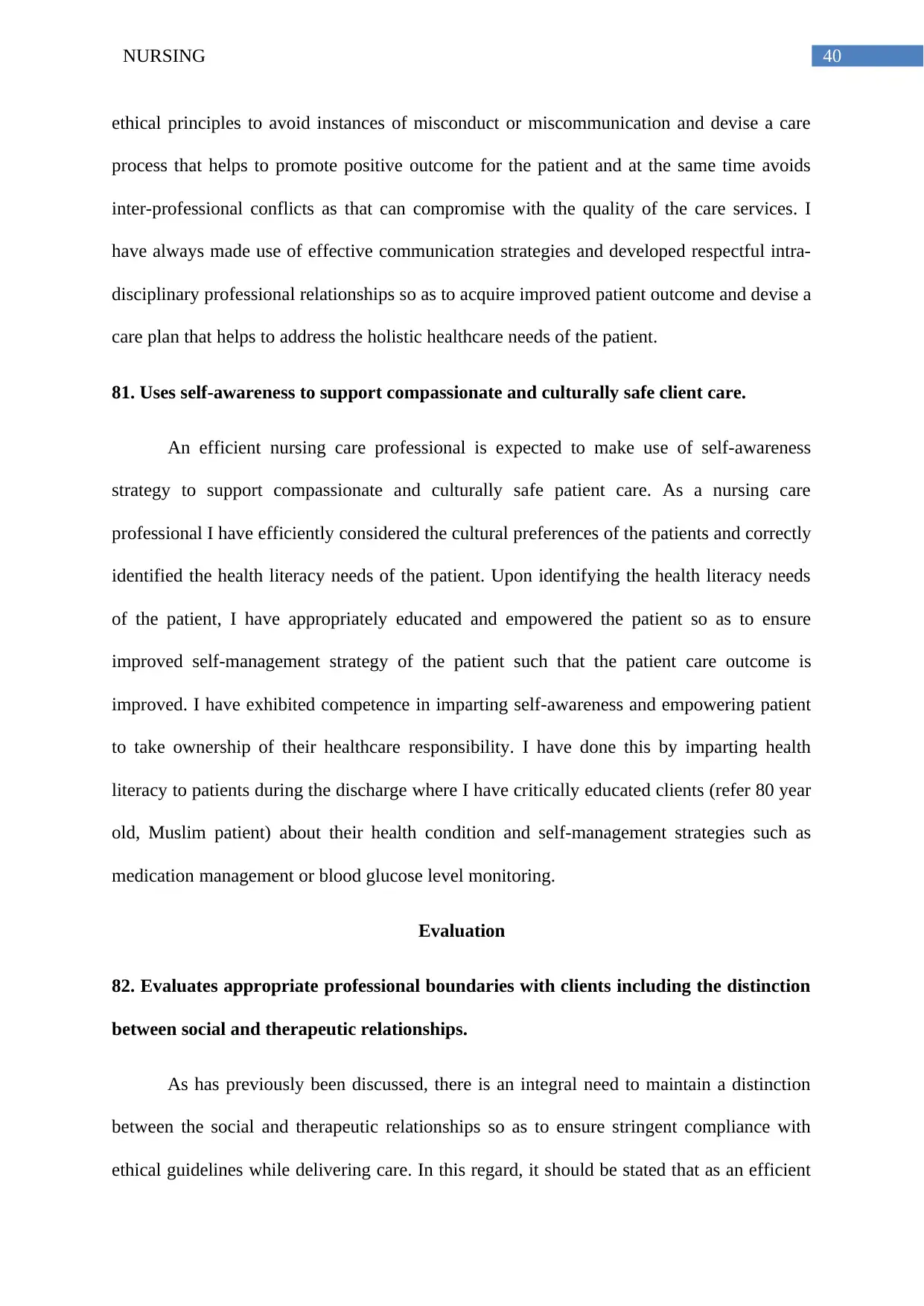
40NURSING
ethical principles to avoid instances of misconduct or miscommunication and devise a care
process that helps to promote positive outcome for the patient and at the same time avoids
inter-professional conflicts as that can compromise with the quality of the care services. I
have always made use of effective communication strategies and developed respectful intra-
disciplinary professional relationships so as to acquire improved patient outcome and devise a
care plan that helps to address the holistic healthcare needs of the patient.
81. Uses self-awareness to support compassionate and culturally safe client care.
An efficient nursing care professional is expected to make use of self-awareness
strategy to support compassionate and culturally safe patient care. As a nursing care
professional I have efficiently considered the cultural preferences of the patients and correctly
identified the health literacy needs of the patient. Upon identifying the health literacy needs
of the patient, I have appropriately educated and empowered the patient so as to ensure
improved self-management strategy of the patient such that the patient care outcome is
improved. I have exhibited competence in imparting self-awareness and empowering patient
to take ownership of their healthcare responsibility. I have done this by imparting health
literacy to patients during the discharge where I have critically educated clients (refer 80 year
old, Muslim patient) about their health condition and self-management strategies such as
medication management or blood glucose level monitoring.
Evaluation
82. Evaluates appropriate professional boundaries with clients including the distinction
between social and therapeutic relationships.
As has previously been discussed, there is an integral need to maintain a distinction
between the social and therapeutic relationships so as to ensure stringent compliance with
ethical guidelines while delivering care. In this regard, it should be stated that as an efficient
ethical principles to avoid instances of misconduct or miscommunication and devise a care
process that helps to promote positive outcome for the patient and at the same time avoids
inter-professional conflicts as that can compromise with the quality of the care services. I
have always made use of effective communication strategies and developed respectful intra-
disciplinary professional relationships so as to acquire improved patient outcome and devise a
care plan that helps to address the holistic healthcare needs of the patient.
81. Uses self-awareness to support compassionate and culturally safe client care.
An efficient nursing care professional is expected to make use of self-awareness
strategy to support compassionate and culturally safe patient care. As a nursing care
professional I have efficiently considered the cultural preferences of the patients and correctly
identified the health literacy needs of the patient. Upon identifying the health literacy needs
of the patient, I have appropriately educated and empowered the patient so as to ensure
improved self-management strategy of the patient such that the patient care outcome is
improved. I have exhibited competence in imparting self-awareness and empowering patient
to take ownership of their healthcare responsibility. I have done this by imparting health
literacy to patients during the discharge where I have critically educated clients (refer 80 year
old, Muslim patient) about their health condition and self-management strategies such as
medication management or blood glucose level monitoring.
Evaluation
82. Evaluates appropriate professional boundaries with clients including the distinction
between social and therapeutic relationships.
As has previously been discussed, there is an integral need to maintain a distinction
between the social and therapeutic relationships so as to ensure stringent compliance with
ethical guidelines while delivering care. In this regard, it should be stated that as an efficient
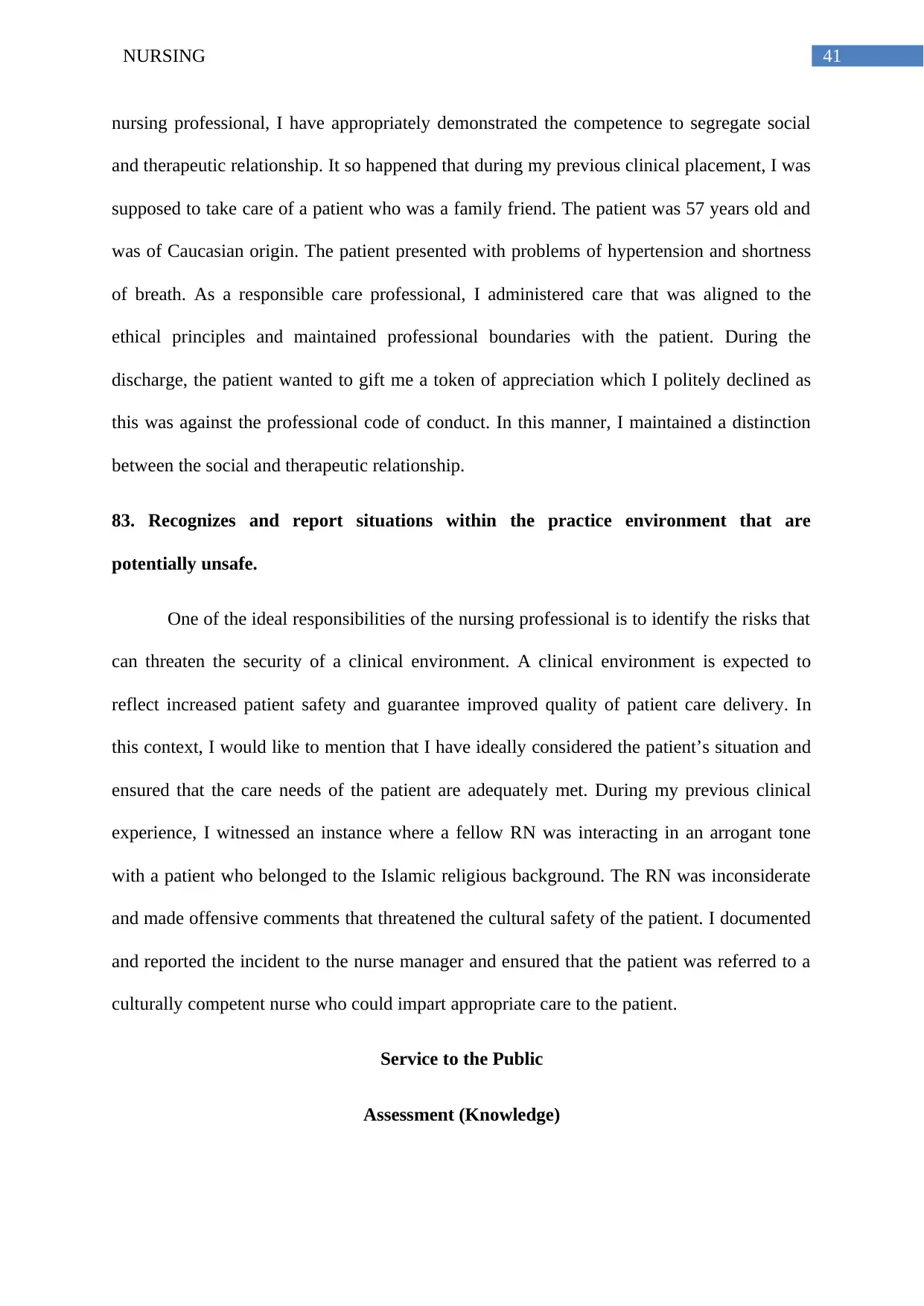
41NURSING
nursing professional, I have appropriately demonstrated the competence to segregate social
and therapeutic relationship. It so happened that during my previous clinical placement, I was
supposed to take care of a patient who was a family friend. The patient was 57 years old and
was of Caucasian origin. The patient presented with problems of hypertension and shortness
of breath. As a responsible care professional, I administered care that was aligned to the
ethical principles and maintained professional boundaries with the patient. During the
discharge, the patient wanted to gift me a token of appreciation which I politely declined as
this was against the professional code of conduct. In this manner, I maintained a distinction
between the social and therapeutic relationship.
83. Recognizes and report situations within the practice environment that are
potentially unsafe.
One of the ideal responsibilities of the nursing professional is to identify the risks that
can threaten the security of a clinical environment. A clinical environment is expected to
reflect increased patient safety and guarantee improved quality of patient care delivery. In
this context, I would like to mention that I have ideally considered the patient’s situation and
ensured that the care needs of the patient are adequately met. During my previous clinical
experience, I witnessed an instance where a fellow RN was interacting in an arrogant tone
with a patient who belonged to the Islamic religious background. The RN was inconsiderate
and made offensive comments that threatened the cultural safety of the patient. I documented
and reported the incident to the nurse manager and ensured that the patient was referred to a
culturally competent nurse who could impart appropriate care to the patient.
Service to the Public
Assessment (Knowledge)
nursing professional, I have appropriately demonstrated the competence to segregate social
and therapeutic relationship. It so happened that during my previous clinical placement, I was
supposed to take care of a patient who was a family friend. The patient was 57 years old and
was of Caucasian origin. The patient presented with problems of hypertension and shortness
of breath. As a responsible care professional, I administered care that was aligned to the
ethical principles and maintained professional boundaries with the patient. During the
discharge, the patient wanted to gift me a token of appreciation which I politely declined as
this was against the professional code of conduct. In this manner, I maintained a distinction
between the social and therapeutic relationship.
83. Recognizes and report situations within the practice environment that are
potentially unsafe.
One of the ideal responsibilities of the nursing professional is to identify the risks that
can threaten the security of a clinical environment. A clinical environment is expected to
reflect increased patient safety and guarantee improved quality of patient care delivery. In
this context, I would like to mention that I have ideally considered the patient’s situation and
ensured that the care needs of the patient are adequately met. During my previous clinical
experience, I witnessed an instance where a fellow RN was interacting in an arrogant tone
with a patient who belonged to the Islamic religious background. The RN was inconsiderate
and made offensive comments that threatened the cultural safety of the patient. I documented
and reported the incident to the nurse manager and ensured that the patient was referred to a
culturally competent nurse who could impart appropriate care to the patient.
Service to the Public
Assessment (Knowledge)
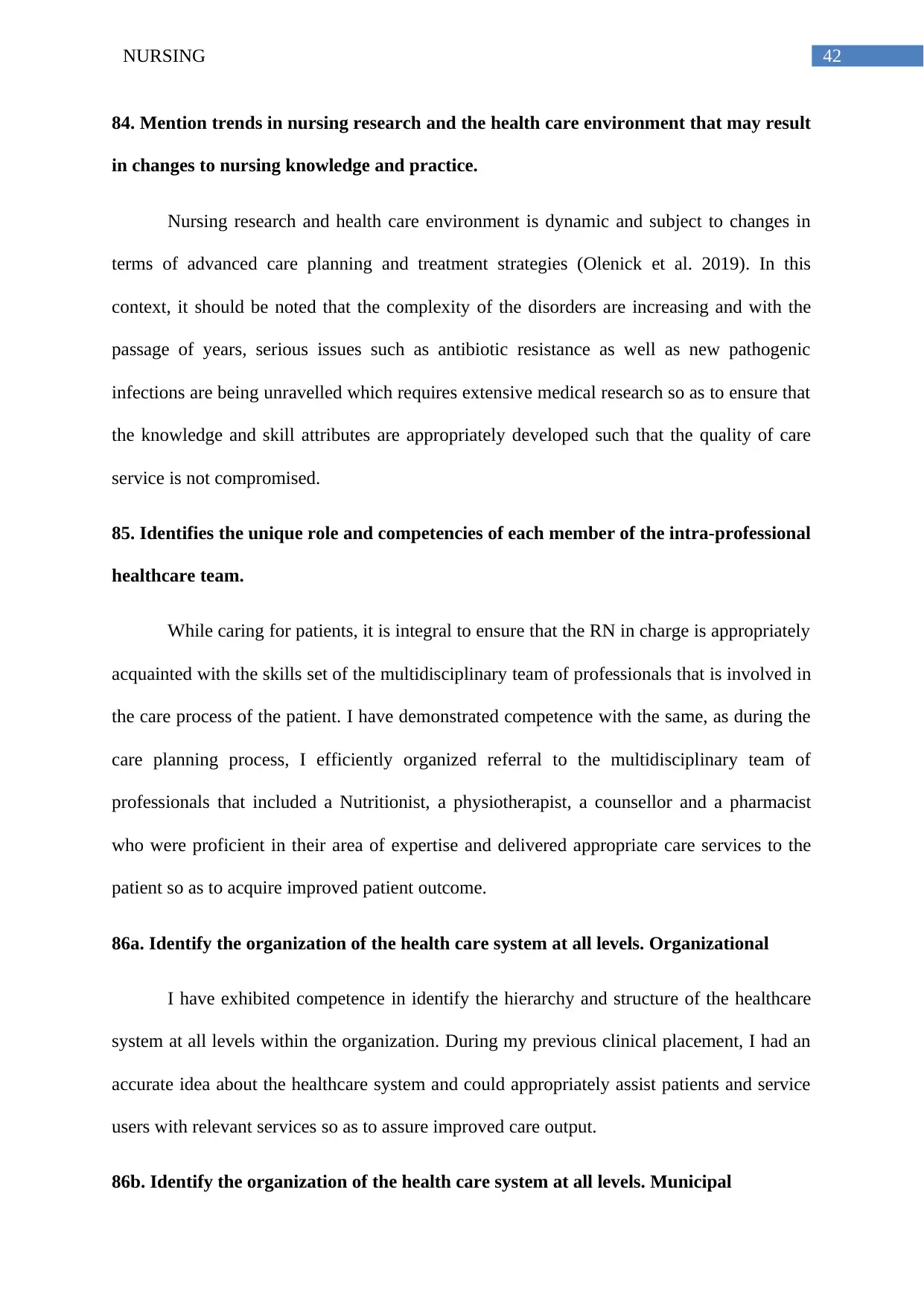
42NURSING
84. Mention trends in nursing research and the health care environment that may result
in changes to nursing knowledge and practice.
Nursing research and health care environment is dynamic and subject to changes in
terms of advanced care planning and treatment strategies (Olenick et al. 2019). In this
context, it should be noted that the complexity of the disorders are increasing and with the
passage of years, serious issues such as antibiotic resistance as well as new pathogenic
infections are being unravelled which requires extensive medical research so as to ensure that
the knowledge and skill attributes are appropriately developed such that the quality of care
service is not compromised.
85. Identifies the unique role and competencies of each member of the intra-professional
healthcare team.
While caring for patients, it is integral to ensure that the RN in charge is appropriately
acquainted with the skills set of the multidisciplinary team of professionals that is involved in
the care process of the patient. I have demonstrated competence with the same, as during the
care planning process, I efficiently organized referral to the multidisciplinary team of
professionals that included a Nutritionist, a physiotherapist, a counsellor and a pharmacist
who were proficient in their area of expertise and delivered appropriate care services to the
patient so as to acquire improved patient outcome.
86a. Identify the organization of the health care system at all levels. Organizational
I have exhibited competence in identify the hierarchy and structure of the healthcare
system at all levels within the organization. During my previous clinical placement, I had an
accurate idea about the healthcare system and could appropriately assist patients and service
users with relevant services so as to assure improved care output.
86b. Identify the organization of the health care system at all levels. Municipal
84. Mention trends in nursing research and the health care environment that may result
in changes to nursing knowledge and practice.
Nursing research and health care environment is dynamic and subject to changes in
terms of advanced care planning and treatment strategies (Olenick et al. 2019). In this
context, it should be noted that the complexity of the disorders are increasing and with the
passage of years, serious issues such as antibiotic resistance as well as new pathogenic
infections are being unravelled which requires extensive medical research so as to ensure that
the knowledge and skill attributes are appropriately developed such that the quality of care
service is not compromised.
85. Identifies the unique role and competencies of each member of the intra-professional
healthcare team.
While caring for patients, it is integral to ensure that the RN in charge is appropriately
acquainted with the skills set of the multidisciplinary team of professionals that is involved in
the care process of the patient. I have demonstrated competence with the same, as during the
care planning process, I efficiently organized referral to the multidisciplinary team of
professionals that included a Nutritionist, a physiotherapist, a counsellor and a pharmacist
who were proficient in their area of expertise and delivered appropriate care services to the
patient so as to acquire improved patient outcome.
86a. Identify the organization of the health care system at all levels. Organizational
I have exhibited competence in identify the hierarchy and structure of the healthcare
system at all levels within the organization. During my previous clinical placement, I had an
accurate idea about the healthcare system and could appropriately assist patients and service
users with relevant services so as to assure improved care output.
86b. Identify the organization of the health care system at all levels. Municipal
Paraphrase This Document
Need a fresh take? Get an instant paraphrase of this document with our AI Paraphraser
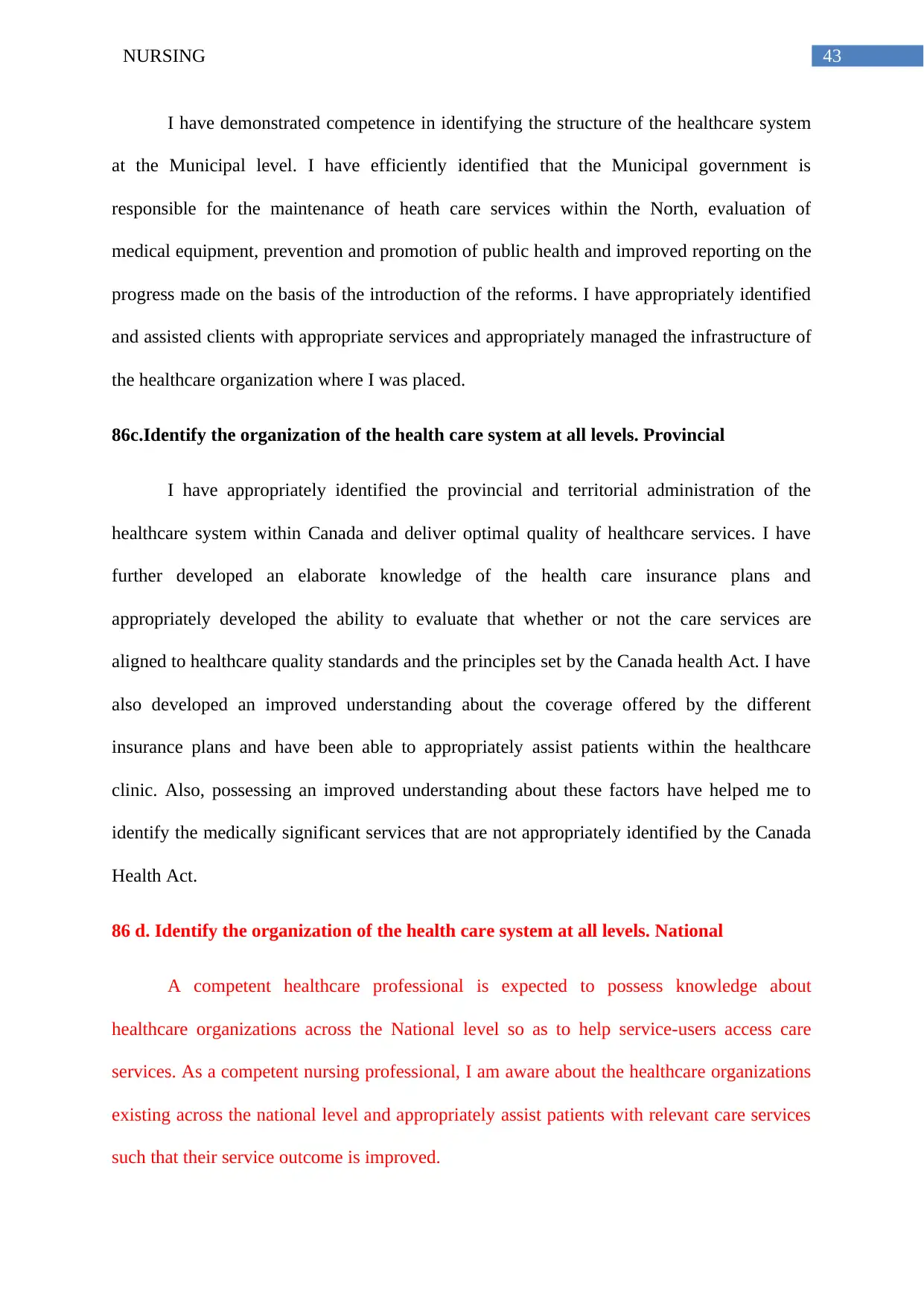
43NURSING
I have demonstrated competence in identifying the structure of the healthcare system
at the Municipal level. I have efficiently identified that the Municipal government is
responsible for the maintenance of heath care services within the North, evaluation of
medical equipment, prevention and promotion of public health and improved reporting on the
progress made on the basis of the introduction of the reforms. I have appropriately identified
and assisted clients with appropriate services and appropriately managed the infrastructure of
the healthcare organization where I was placed.
86c.Identify the organization of the health care system at all levels. Provincial
I have appropriately identified the provincial and territorial administration of the
healthcare system within Canada and deliver optimal quality of healthcare services. I have
further developed an elaborate knowledge of the health care insurance plans and
appropriately developed the ability to evaluate that whether or not the care services are
aligned to healthcare quality standards and the principles set by the Canada health Act. I have
also developed an improved understanding about the coverage offered by the different
insurance plans and have been able to appropriately assist patients within the healthcare
clinic. Also, possessing an improved understanding about these factors have helped me to
identify the medically significant services that are not appropriately identified by the Canada
Health Act.
86 d. Identify the organization of the health care system at all levels. National
A competent healthcare professional is expected to possess knowledge about
healthcare organizations across the National level so as to help service-users access care
services. As a competent nursing professional, I am aware about the healthcare organizations
existing across the national level and appropriately assist patients with relevant care services
such that their service outcome is improved.
I have demonstrated competence in identifying the structure of the healthcare system
at the Municipal level. I have efficiently identified that the Municipal government is
responsible for the maintenance of heath care services within the North, evaluation of
medical equipment, prevention and promotion of public health and improved reporting on the
progress made on the basis of the introduction of the reforms. I have appropriately identified
and assisted clients with appropriate services and appropriately managed the infrastructure of
the healthcare organization where I was placed.
86c.Identify the organization of the health care system at all levels. Provincial
I have appropriately identified the provincial and territorial administration of the
healthcare system within Canada and deliver optimal quality of healthcare services. I have
further developed an elaborate knowledge of the health care insurance plans and
appropriately developed the ability to evaluate that whether or not the care services are
aligned to healthcare quality standards and the principles set by the Canada health Act. I have
also developed an improved understanding about the coverage offered by the different
insurance plans and have been able to appropriately assist patients within the healthcare
clinic. Also, possessing an improved understanding about these factors have helped me to
identify the medically significant services that are not appropriately identified by the Canada
Health Act.
86 d. Identify the organization of the health care system at all levels. National
A competent healthcare professional is expected to possess knowledge about
healthcare organizations across the National level so as to help service-users access care
services. As a competent nursing professional, I am aware about the healthcare organizations
existing across the national level and appropriately assist patients with relevant care services
such that their service outcome is improved.
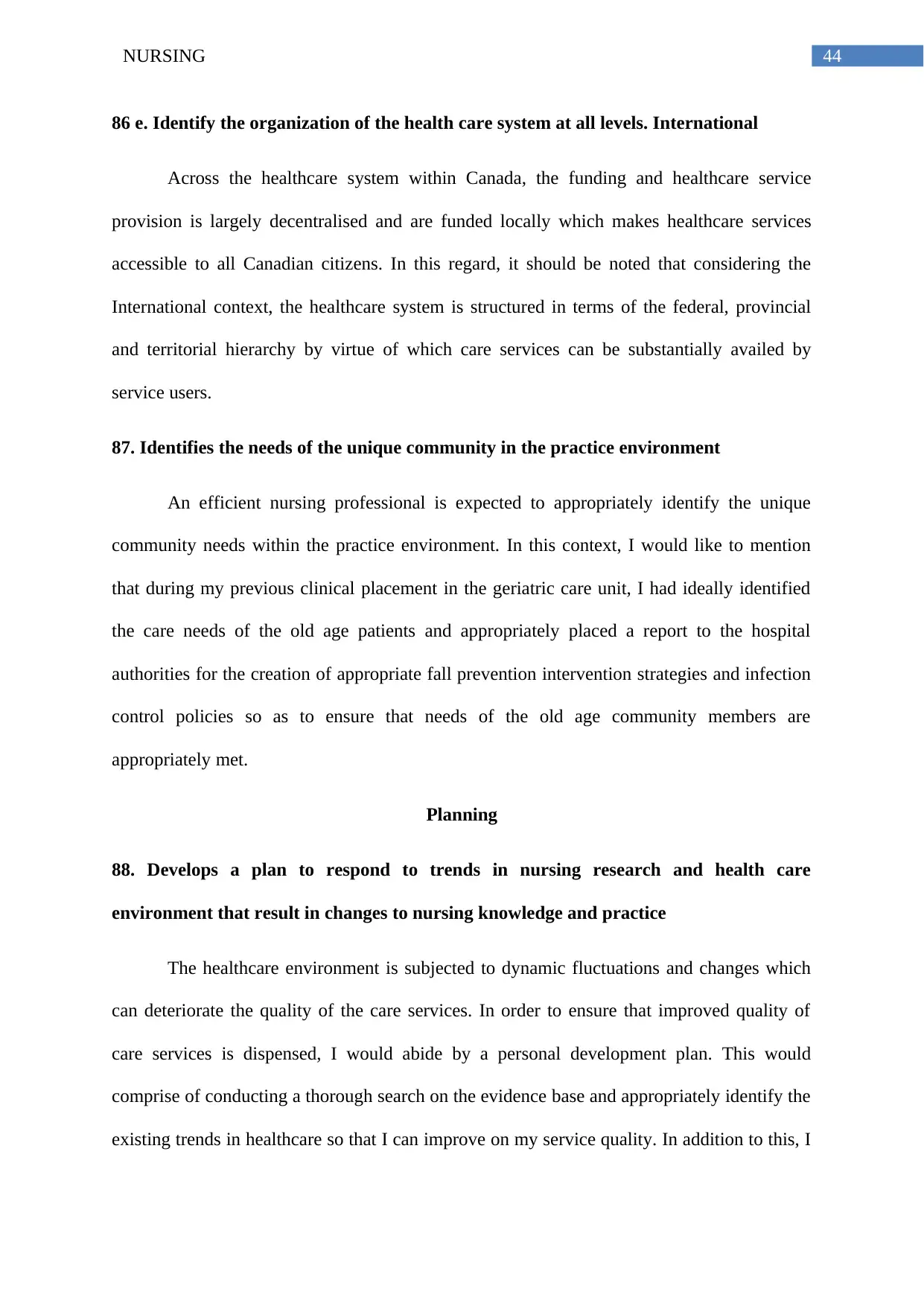
44NURSING
86 e. Identify the organization of the health care system at all levels. International
Across the healthcare system within Canada, the funding and healthcare service
provision is largely decentralised and are funded locally which makes healthcare services
accessible to all Canadian citizens. In this regard, it should be noted that considering the
International context, the healthcare system is structured in terms of the federal, provincial
and territorial hierarchy by virtue of which care services can be substantially availed by
service users.
87. Identifies the needs of the unique community in the practice environment
An efficient nursing professional is expected to appropriately identify the unique
community needs within the practice environment. In this context, I would like to mention
that during my previous clinical placement in the geriatric care unit, I had ideally identified
the care needs of the old age patients and appropriately placed a report to the hospital
authorities for the creation of appropriate fall prevention intervention strategies and infection
control policies so as to ensure that needs of the old age community members are
appropriately met.
Planning
88. Develops a plan to respond to trends in nursing research and health care
environment that result in changes to nursing knowledge and practice
The healthcare environment is subjected to dynamic fluctuations and changes which
can deteriorate the quality of the care services. In order to ensure that improved quality of
care services is dispensed, I would abide by a personal development plan. This would
comprise of conducting a thorough search on the evidence base and appropriately identify the
existing trends in healthcare so that I can improve on my service quality. In addition to this, I
86 e. Identify the organization of the health care system at all levels. International
Across the healthcare system within Canada, the funding and healthcare service
provision is largely decentralised and are funded locally which makes healthcare services
accessible to all Canadian citizens. In this regard, it should be noted that considering the
International context, the healthcare system is structured in terms of the federal, provincial
and territorial hierarchy by virtue of which care services can be substantially availed by
service users.
87. Identifies the needs of the unique community in the practice environment
An efficient nursing professional is expected to appropriately identify the unique
community needs within the practice environment. In this context, I would like to mention
that during my previous clinical placement in the geriatric care unit, I had ideally identified
the care needs of the old age patients and appropriately placed a report to the hospital
authorities for the creation of appropriate fall prevention intervention strategies and infection
control policies so as to ensure that needs of the old age community members are
appropriately met.
Planning
88. Develops a plan to respond to trends in nursing research and health care
environment that result in changes to nursing knowledge and practice
The healthcare environment is subjected to dynamic fluctuations and changes which
can deteriorate the quality of the care services. In order to ensure that improved quality of
care services is dispensed, I would abide by a personal development plan. This would
comprise of conducting a thorough search on the evidence base and appropriately identify the
existing trends in healthcare so that I can improve on my service quality. In addition to this, I
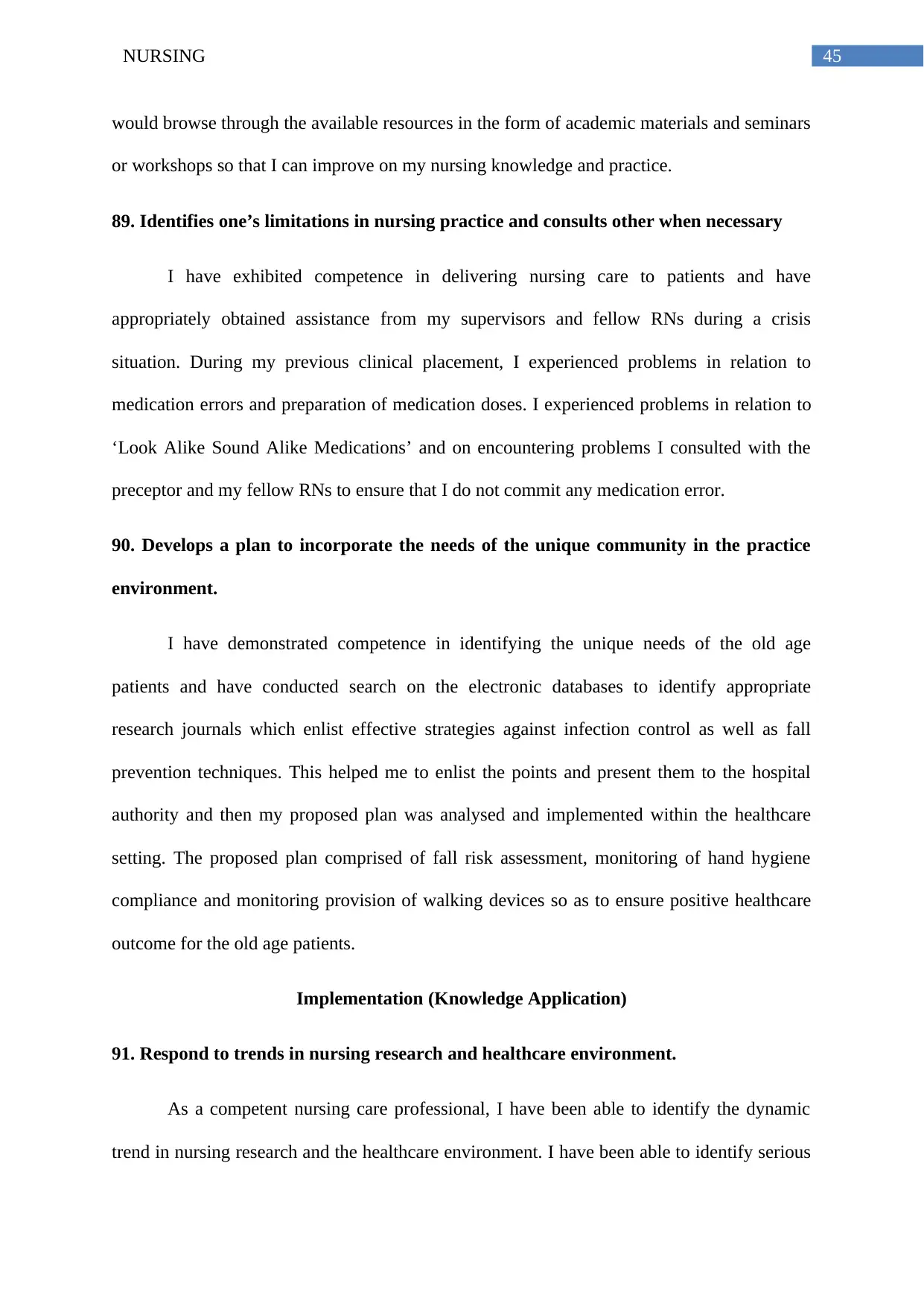
45NURSING
would browse through the available resources in the form of academic materials and seminars
or workshops so that I can improve on my nursing knowledge and practice.
89. Identifies one’s limitations in nursing practice and consults other when necessary
I have exhibited competence in delivering nursing care to patients and have
appropriately obtained assistance from my supervisors and fellow RNs during a crisis
situation. During my previous clinical placement, I experienced problems in relation to
medication errors and preparation of medication doses. I experienced problems in relation to
‘Look Alike Sound Alike Medications’ and on encountering problems I consulted with the
preceptor and my fellow RNs to ensure that I do not commit any medication error.
90. Develops a plan to incorporate the needs of the unique community in the practice
environment.
I have demonstrated competence in identifying the unique needs of the old age
patients and have conducted search on the electronic databases to identify appropriate
research journals which enlist effective strategies against infection control as well as fall
prevention techniques. This helped me to enlist the points and present them to the hospital
authority and then my proposed plan was analysed and implemented within the healthcare
setting. The proposed plan comprised of fall risk assessment, monitoring of hand hygiene
compliance and monitoring provision of walking devices so as to ensure positive healthcare
outcome for the old age patients.
Implementation (Knowledge Application)
91. Respond to trends in nursing research and healthcare environment.
As a competent nursing care professional, I have been able to identify the dynamic
trend in nursing research and the healthcare environment. I have been able to identify serious
would browse through the available resources in the form of academic materials and seminars
or workshops so that I can improve on my nursing knowledge and practice.
89. Identifies one’s limitations in nursing practice and consults other when necessary
I have exhibited competence in delivering nursing care to patients and have
appropriately obtained assistance from my supervisors and fellow RNs during a crisis
situation. During my previous clinical placement, I experienced problems in relation to
medication errors and preparation of medication doses. I experienced problems in relation to
‘Look Alike Sound Alike Medications’ and on encountering problems I consulted with the
preceptor and my fellow RNs to ensure that I do not commit any medication error.
90. Develops a plan to incorporate the needs of the unique community in the practice
environment.
I have demonstrated competence in identifying the unique needs of the old age
patients and have conducted search on the electronic databases to identify appropriate
research journals which enlist effective strategies against infection control as well as fall
prevention techniques. This helped me to enlist the points and present them to the hospital
authority and then my proposed plan was analysed and implemented within the healthcare
setting. The proposed plan comprised of fall risk assessment, monitoring of hand hygiene
compliance and monitoring provision of walking devices so as to ensure positive healthcare
outcome for the old age patients.
Implementation (Knowledge Application)
91. Respond to trends in nursing research and healthcare environment.
As a competent nursing care professional, I have been able to identify the dynamic
trend in nursing research and the healthcare environment. I have been able to identify serious
Secure Best Marks with AI Grader
Need help grading? Try our AI Grader for instant feedback on your assignments.
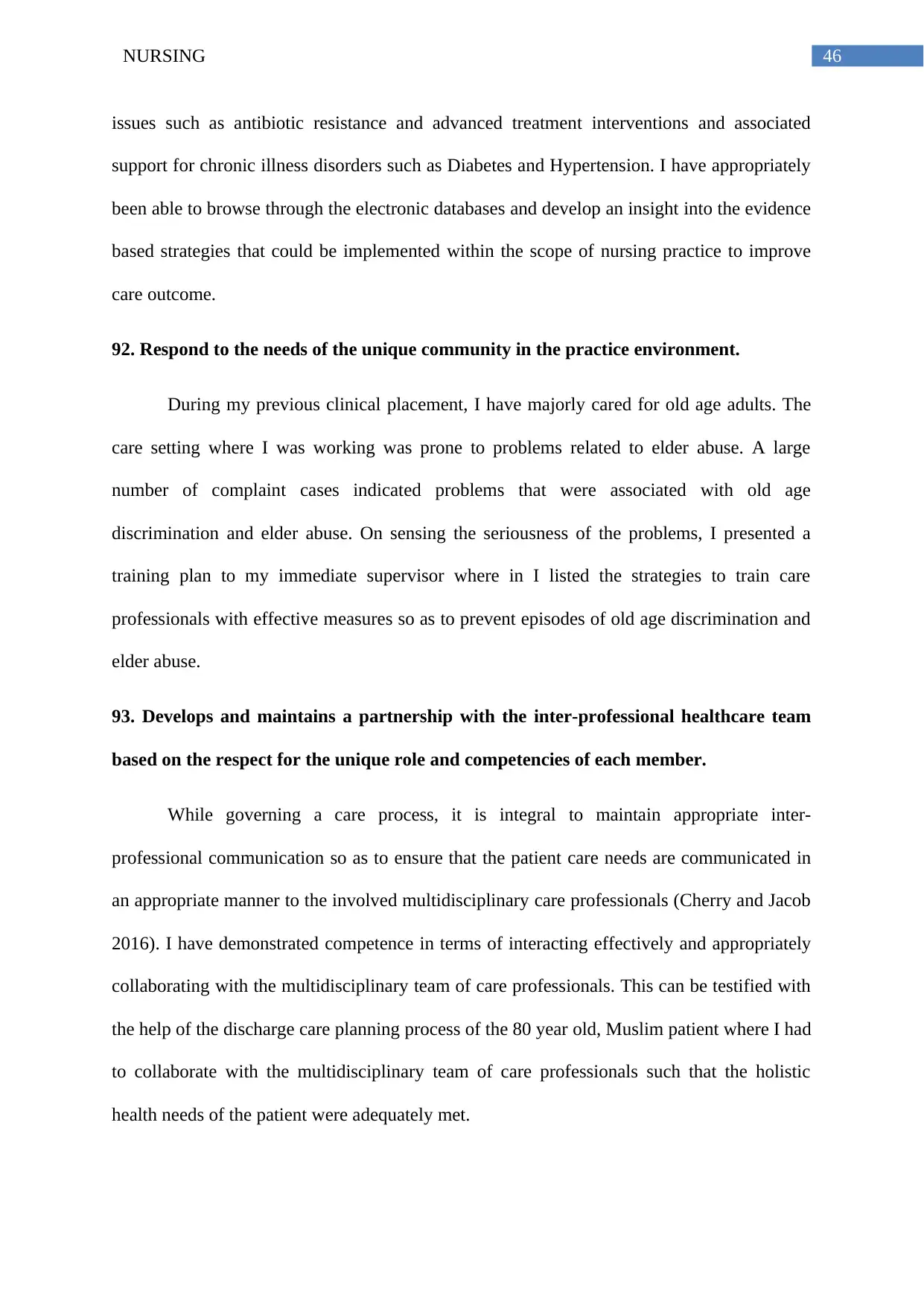
46NURSING
issues such as antibiotic resistance and advanced treatment interventions and associated
support for chronic illness disorders such as Diabetes and Hypertension. I have appropriately
been able to browse through the electronic databases and develop an insight into the evidence
based strategies that could be implemented within the scope of nursing practice to improve
care outcome.
92. Respond to the needs of the unique community in the practice environment.
During my previous clinical placement, I have majorly cared for old age adults. The
care setting where I was working was prone to problems related to elder abuse. A large
number of complaint cases indicated problems that were associated with old age
discrimination and elder abuse. On sensing the seriousness of the problems, I presented a
training plan to my immediate supervisor where in I listed the strategies to train care
professionals with effective measures so as to prevent episodes of old age discrimination and
elder abuse.
93. Develops and maintains a partnership with the inter-professional healthcare team
based on the respect for the unique role and competencies of each member.
While governing a care process, it is integral to maintain appropriate inter-
professional communication so as to ensure that the patient care needs are communicated in
an appropriate manner to the involved multidisciplinary care professionals (Cherry and Jacob
2016). I have demonstrated competence in terms of interacting effectively and appropriately
collaborating with the multidisciplinary team of care professionals. This can be testified with
the help of the discharge care planning process of the 80 year old, Muslim patient where I had
to collaborate with the multidisciplinary team of care professionals such that the holistic
health needs of the patient were adequately met.
issues such as antibiotic resistance and advanced treatment interventions and associated
support for chronic illness disorders such as Diabetes and Hypertension. I have appropriately
been able to browse through the electronic databases and develop an insight into the evidence
based strategies that could be implemented within the scope of nursing practice to improve
care outcome.
92. Respond to the needs of the unique community in the practice environment.
During my previous clinical placement, I have majorly cared for old age adults. The
care setting where I was working was prone to problems related to elder abuse. A large
number of complaint cases indicated problems that were associated with old age
discrimination and elder abuse. On sensing the seriousness of the problems, I presented a
training plan to my immediate supervisor where in I listed the strategies to train care
professionals with effective measures so as to prevent episodes of old age discrimination and
elder abuse.
93. Develops and maintains a partnership with the inter-professional healthcare team
based on the respect for the unique role and competencies of each member.
While governing a care process, it is integral to maintain appropriate inter-
professional communication so as to ensure that the patient care needs are communicated in
an appropriate manner to the involved multidisciplinary care professionals (Cherry and Jacob
2016). I have demonstrated competence in terms of interacting effectively and appropriately
collaborating with the multidisciplinary team of care professionals. This can be testified with
the help of the discharge care planning process of the 80 year old, Muslim patient where I had
to collaborate with the multidisciplinary team of care professionals such that the holistic
health needs of the patient were adequately met.
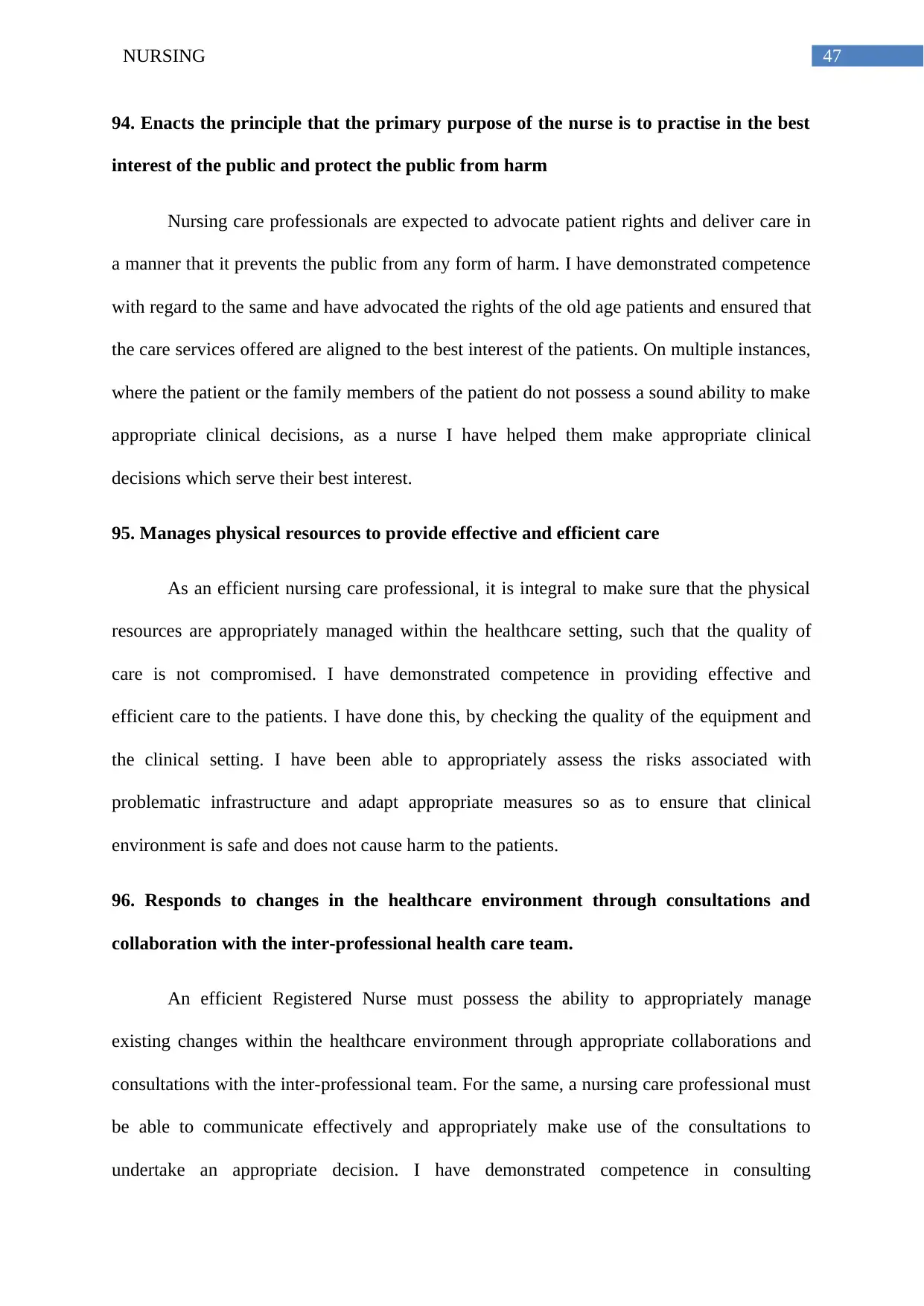
47NURSING
94. Enacts the principle that the primary purpose of the nurse is to practise in the best
interest of the public and protect the public from harm
Nursing care professionals are expected to advocate patient rights and deliver care in
a manner that it prevents the public from any form of harm. I have demonstrated competence
with regard to the same and have advocated the rights of the old age patients and ensured that
the care services offered are aligned to the best interest of the patients. On multiple instances,
where the patient or the family members of the patient do not possess a sound ability to make
appropriate clinical decisions, as a nurse I have helped them make appropriate clinical
decisions which serve their best interest.
95. Manages physical resources to provide effective and efficient care
As an efficient nursing care professional, it is integral to make sure that the physical
resources are appropriately managed within the healthcare setting, such that the quality of
care is not compromised. I have demonstrated competence in providing effective and
efficient care to the patients. I have done this, by checking the quality of the equipment and
the clinical setting. I have been able to appropriately assess the risks associated with
problematic infrastructure and adapt appropriate measures so as to ensure that clinical
environment is safe and does not cause harm to the patients.
96. Responds to changes in the healthcare environment through consultations and
collaboration with the inter-professional health care team.
An efficient Registered Nurse must possess the ability to appropriately manage
existing changes within the healthcare environment through appropriate collaborations and
consultations with the inter-professional team. For the same, a nursing care professional must
be able to communicate effectively and appropriately make use of the consultations to
undertake an appropriate decision. I have demonstrated competence in consulting
94. Enacts the principle that the primary purpose of the nurse is to practise in the best
interest of the public and protect the public from harm
Nursing care professionals are expected to advocate patient rights and deliver care in
a manner that it prevents the public from any form of harm. I have demonstrated competence
with regard to the same and have advocated the rights of the old age patients and ensured that
the care services offered are aligned to the best interest of the patients. On multiple instances,
where the patient or the family members of the patient do not possess a sound ability to make
appropriate clinical decisions, as a nurse I have helped them make appropriate clinical
decisions which serve their best interest.
95. Manages physical resources to provide effective and efficient care
As an efficient nursing care professional, it is integral to make sure that the physical
resources are appropriately managed within the healthcare setting, such that the quality of
care is not compromised. I have demonstrated competence in providing effective and
efficient care to the patients. I have done this, by checking the quality of the equipment and
the clinical setting. I have been able to appropriately assess the risks associated with
problematic infrastructure and adapt appropriate measures so as to ensure that clinical
environment is safe and does not cause harm to the patients.
96. Responds to changes in the healthcare environment through consultations and
collaboration with the inter-professional health care team.
An efficient Registered Nurse must possess the ability to appropriately manage
existing changes within the healthcare environment through appropriate collaborations and
consultations with the inter-professional team. For the same, a nursing care professional must
be able to communicate effectively and appropriately make use of the consultations to
undertake an appropriate decision. I have demonstrated competence in consulting
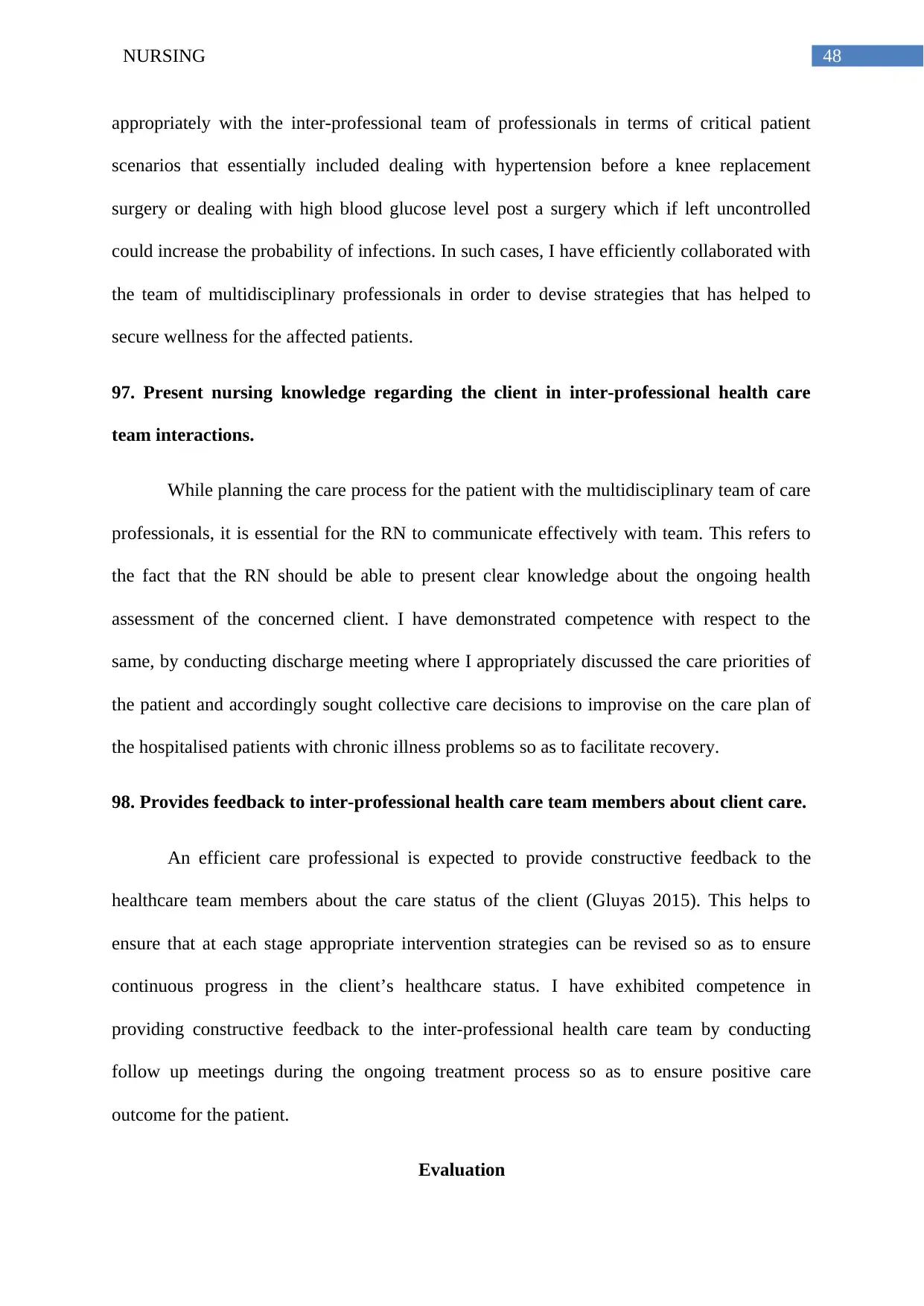
48NURSING
appropriately with the inter-professional team of professionals in terms of critical patient
scenarios that essentially included dealing with hypertension before a knee replacement
surgery or dealing with high blood glucose level post a surgery which if left uncontrolled
could increase the probability of infections. In such cases, I have efficiently collaborated with
the team of multidisciplinary professionals in order to devise strategies that has helped to
secure wellness for the affected patients.
97. Present nursing knowledge regarding the client in inter-professional health care
team interactions.
While planning the care process for the patient with the multidisciplinary team of care
professionals, it is essential for the RN to communicate effectively with team. This refers to
the fact that the RN should be able to present clear knowledge about the ongoing health
assessment of the concerned client. I have demonstrated competence with respect to the
same, by conducting discharge meeting where I appropriately discussed the care priorities of
the patient and accordingly sought collective care decisions to improvise on the care plan of
the hospitalised patients with chronic illness problems so as to facilitate recovery.
98. Provides feedback to inter-professional health care team members about client care.
An efficient care professional is expected to provide constructive feedback to the
healthcare team members about the care status of the client (Gluyas 2015). This helps to
ensure that at each stage appropriate intervention strategies can be revised so as to ensure
continuous progress in the client’s healthcare status. I have exhibited competence in
providing constructive feedback to the inter-professional health care team by conducting
follow up meetings during the ongoing treatment process so as to ensure positive care
outcome for the patient.
Evaluation
appropriately with the inter-professional team of professionals in terms of critical patient
scenarios that essentially included dealing with hypertension before a knee replacement
surgery or dealing with high blood glucose level post a surgery which if left uncontrolled
could increase the probability of infections. In such cases, I have efficiently collaborated with
the team of multidisciplinary professionals in order to devise strategies that has helped to
secure wellness for the affected patients.
97. Present nursing knowledge regarding the client in inter-professional health care
team interactions.
While planning the care process for the patient with the multidisciplinary team of care
professionals, it is essential for the RN to communicate effectively with team. This refers to
the fact that the RN should be able to present clear knowledge about the ongoing health
assessment of the concerned client. I have demonstrated competence with respect to the
same, by conducting discharge meeting where I appropriately discussed the care priorities of
the patient and accordingly sought collective care decisions to improvise on the care plan of
the hospitalised patients with chronic illness problems so as to facilitate recovery.
98. Provides feedback to inter-professional health care team members about client care.
An efficient care professional is expected to provide constructive feedback to the
healthcare team members about the care status of the client (Gluyas 2015). This helps to
ensure that at each stage appropriate intervention strategies can be revised so as to ensure
continuous progress in the client’s healthcare status. I have exhibited competence in
providing constructive feedback to the inter-professional health care team by conducting
follow up meetings during the ongoing treatment process so as to ensure positive care
outcome for the patient.
Evaluation
Paraphrase This Document
Need a fresh take? Get an instant paraphrase of this document with our AI Paraphraser
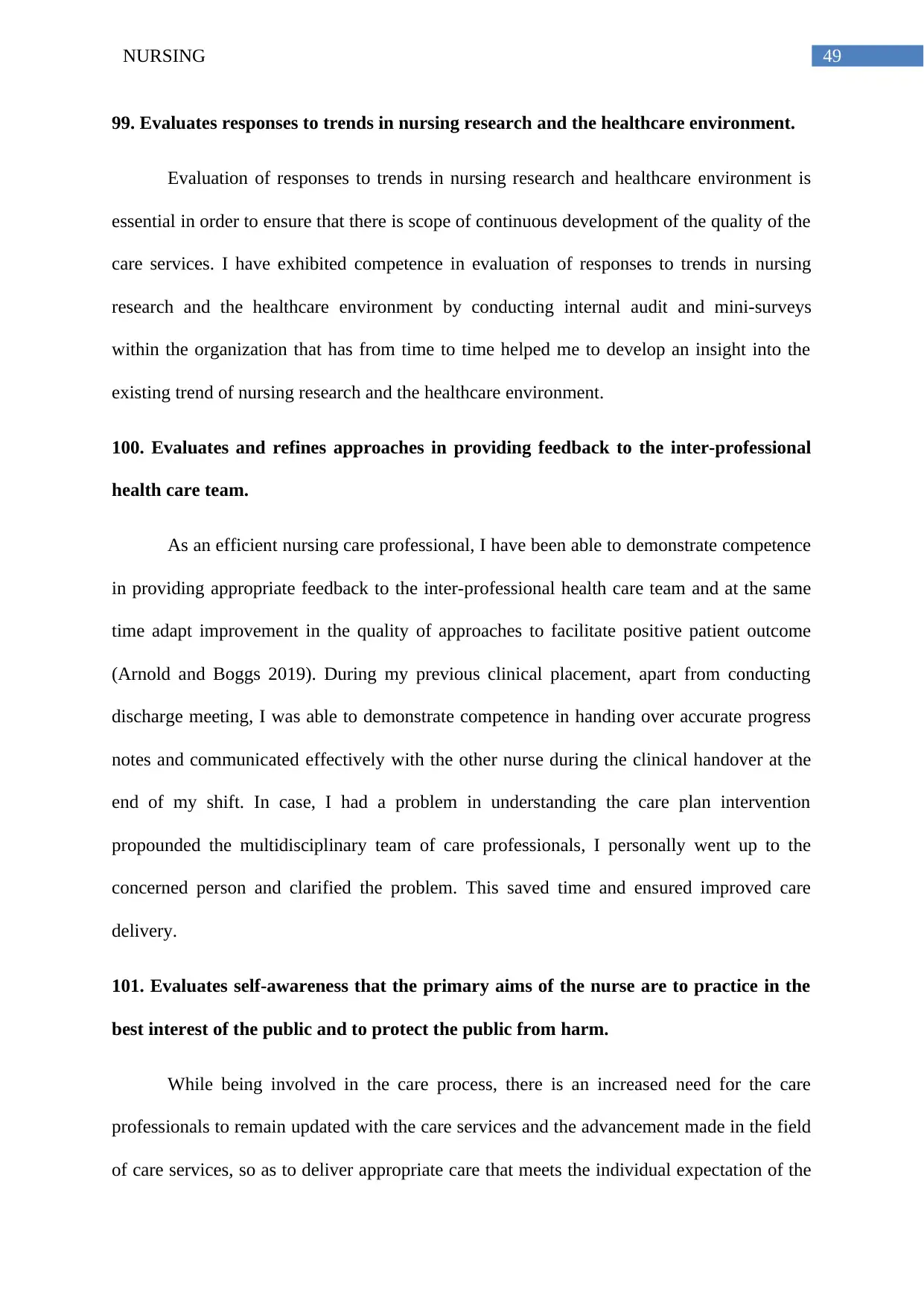
49NURSING
99. Evaluates responses to trends in nursing research and the healthcare environment.
Evaluation of responses to trends in nursing research and healthcare environment is
essential in order to ensure that there is scope of continuous development of the quality of the
care services. I have exhibited competence in evaluation of responses to trends in nursing
research and the healthcare environment by conducting internal audit and mini-surveys
within the organization that has from time to time helped me to develop an insight into the
existing trend of nursing research and the healthcare environment.
100. Evaluates and refines approaches in providing feedback to the inter-professional
health care team.
As an efficient nursing care professional, I have been able to demonstrate competence
in providing appropriate feedback to the inter-professional health care team and at the same
time adapt improvement in the quality of approaches to facilitate positive patient outcome
(Arnold and Boggs 2019). During my previous clinical placement, apart from conducting
discharge meeting, I was able to demonstrate competence in handing over accurate progress
notes and communicated effectively with the other nurse during the clinical handover at the
end of my shift. In case, I had a problem in understanding the care plan intervention
propounded the multidisciplinary team of care professionals, I personally went up to the
concerned person and clarified the problem. This saved time and ensured improved care
delivery.
101. Evaluates self-awareness that the primary aims of the nurse are to practice in the
best interest of the public and to protect the public from harm.
While being involved in the care process, there is an increased need for the care
professionals to remain updated with the care services and the advancement made in the field
of care services, so as to deliver appropriate care that meets the individual expectation of the
99. Evaluates responses to trends in nursing research and the healthcare environment.
Evaluation of responses to trends in nursing research and healthcare environment is
essential in order to ensure that there is scope of continuous development of the quality of the
care services. I have exhibited competence in evaluation of responses to trends in nursing
research and the healthcare environment by conducting internal audit and mini-surveys
within the organization that has from time to time helped me to develop an insight into the
existing trend of nursing research and the healthcare environment.
100. Evaluates and refines approaches in providing feedback to the inter-professional
health care team.
As an efficient nursing care professional, I have been able to demonstrate competence
in providing appropriate feedback to the inter-professional health care team and at the same
time adapt improvement in the quality of approaches to facilitate positive patient outcome
(Arnold and Boggs 2019). During my previous clinical placement, apart from conducting
discharge meeting, I was able to demonstrate competence in handing over accurate progress
notes and communicated effectively with the other nurse during the clinical handover at the
end of my shift. In case, I had a problem in understanding the care plan intervention
propounded the multidisciplinary team of care professionals, I personally went up to the
concerned person and clarified the problem. This saved time and ensured improved care
delivery.
101. Evaluates self-awareness that the primary aims of the nurse are to practice in the
best interest of the public and to protect the public from harm.
While being involved in the care process, there is an increased need for the care
professionals to remain updated with the care services and the advancement made in the field
of care services, so as to deliver appropriate care that meets the individual expectation of the
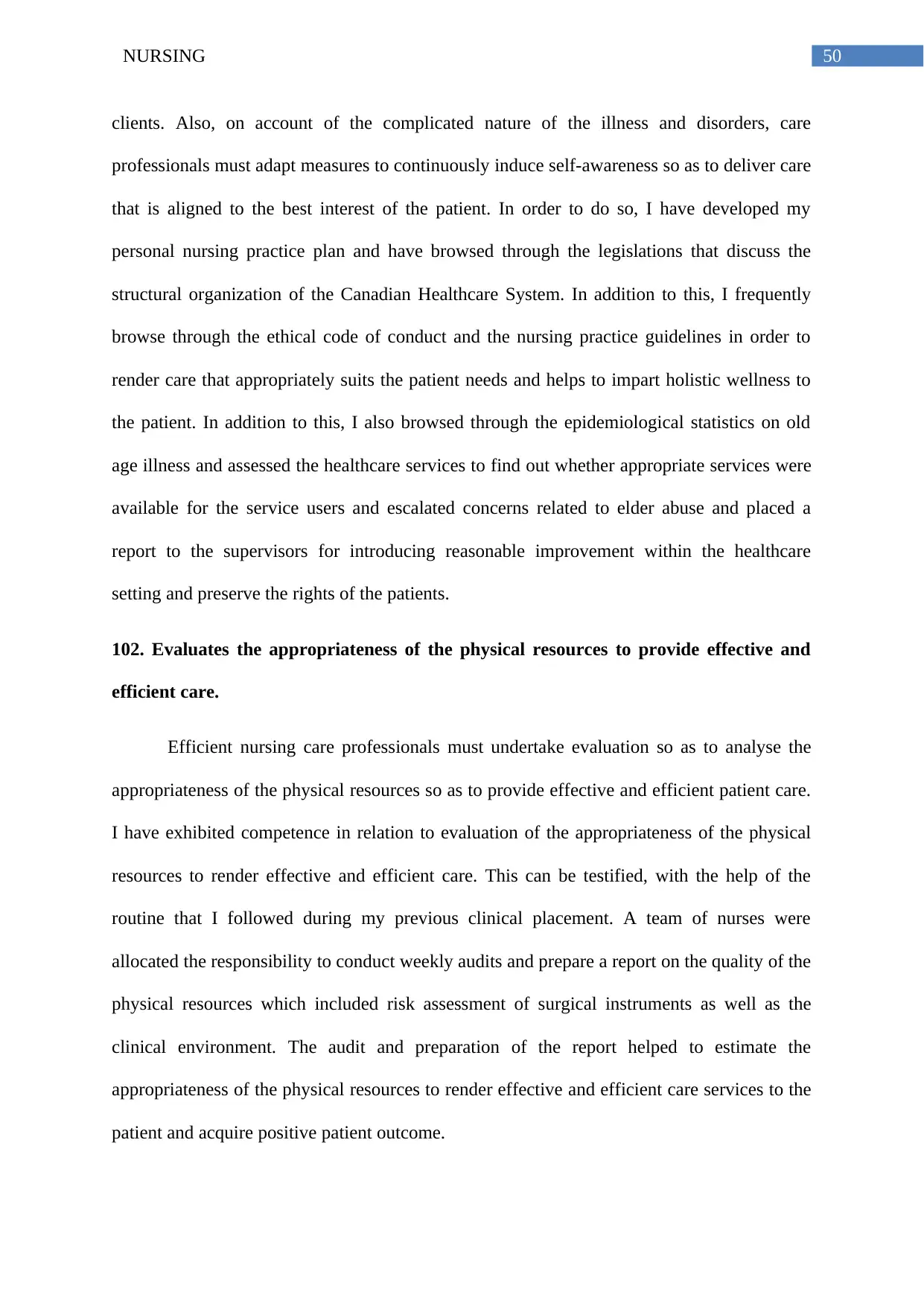
50NURSING
clients. Also, on account of the complicated nature of the illness and disorders, care
professionals must adapt measures to continuously induce self-awareness so as to deliver care
that is aligned to the best interest of the patient. In order to do so, I have developed my
personal nursing practice plan and have browsed through the legislations that discuss the
structural organization of the Canadian Healthcare System. In addition to this, I frequently
browse through the ethical code of conduct and the nursing practice guidelines in order to
render care that appropriately suits the patient needs and helps to impart holistic wellness to
the patient. In addition to this, I also browsed through the epidemiological statistics on old
age illness and assessed the healthcare services to find out whether appropriate services were
available for the service users and escalated concerns related to elder abuse and placed a
report to the supervisors for introducing reasonable improvement within the healthcare
setting and preserve the rights of the patients.
102. Evaluates the appropriateness of the physical resources to provide effective and
efficient care.
Efficient nursing care professionals must undertake evaluation so as to analyse the
appropriateness of the physical resources so as to provide effective and efficient patient care.
I have exhibited competence in relation to evaluation of the appropriateness of the physical
resources to render effective and efficient care. This can be testified, with the help of the
routine that I followed during my previous clinical placement. A team of nurses were
allocated the responsibility to conduct weekly audits and prepare a report on the quality of the
physical resources which included risk assessment of surgical instruments as well as the
clinical environment. The audit and preparation of the report helped to estimate the
appropriateness of the physical resources to render effective and efficient care services to the
patient and acquire positive patient outcome.
clients. Also, on account of the complicated nature of the illness and disorders, care
professionals must adapt measures to continuously induce self-awareness so as to deliver care
that is aligned to the best interest of the patient. In order to do so, I have developed my
personal nursing practice plan and have browsed through the legislations that discuss the
structural organization of the Canadian Healthcare System. In addition to this, I frequently
browse through the ethical code of conduct and the nursing practice guidelines in order to
render care that appropriately suits the patient needs and helps to impart holistic wellness to
the patient. In addition to this, I also browsed through the epidemiological statistics on old
age illness and assessed the healthcare services to find out whether appropriate services were
available for the service users and escalated concerns related to elder abuse and placed a
report to the supervisors for introducing reasonable improvement within the healthcare
setting and preserve the rights of the patients.
102. Evaluates the appropriateness of the physical resources to provide effective and
efficient care.
Efficient nursing care professionals must undertake evaluation so as to analyse the
appropriateness of the physical resources so as to provide effective and efficient patient care.
I have exhibited competence in relation to evaluation of the appropriateness of the physical
resources to render effective and efficient care. This can be testified, with the help of the
routine that I followed during my previous clinical placement. A team of nurses were
allocated the responsibility to conduct weekly audits and prepare a report on the quality of the
physical resources which included risk assessment of surgical instruments as well as the
clinical environment. The audit and preparation of the report helped to estimate the
appropriateness of the physical resources to render effective and efficient care services to the
patient and acquire positive patient outcome.
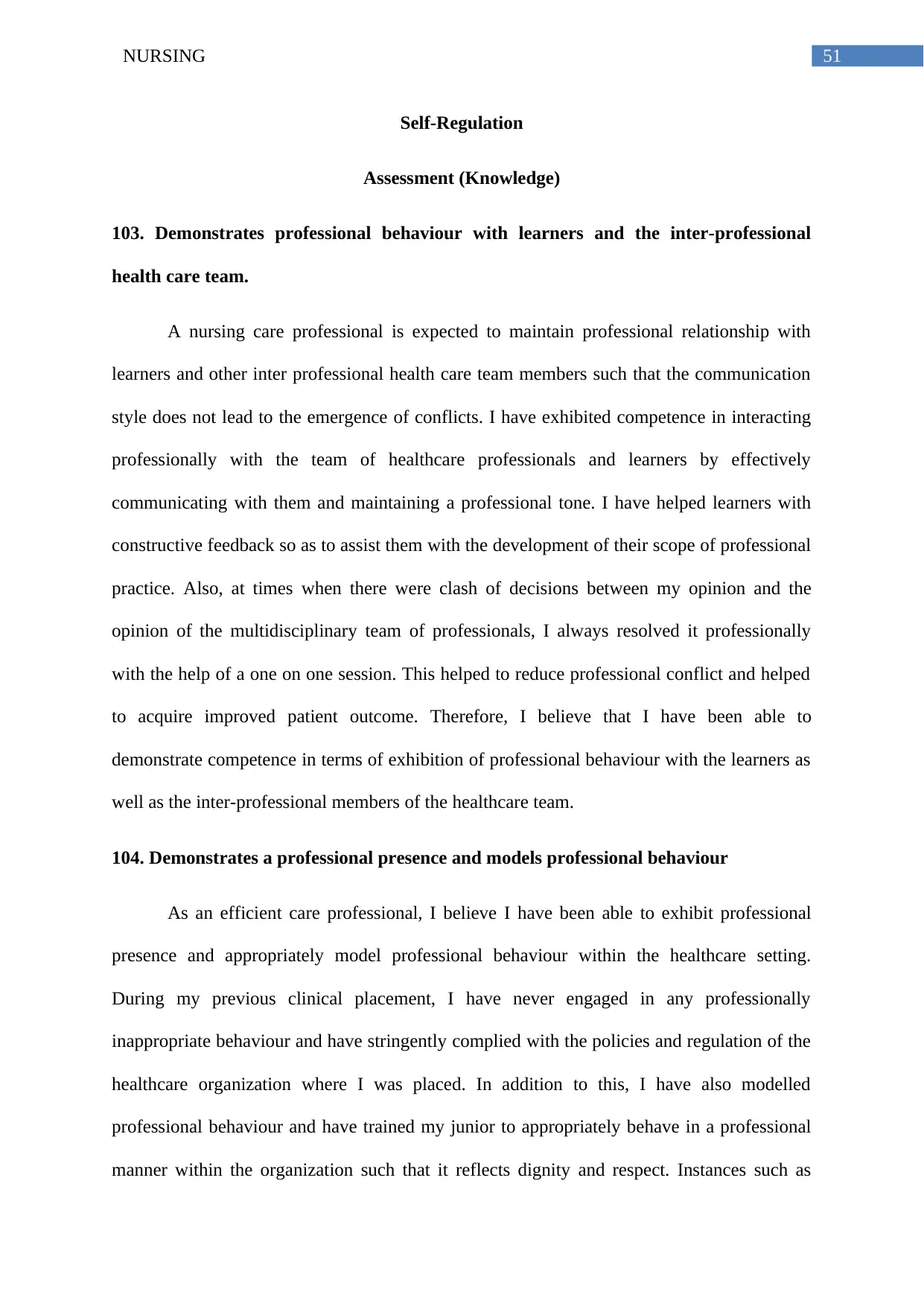
51NURSING
Self-Regulation
Assessment (Knowledge)
103. Demonstrates professional behaviour with learners and the inter-professional
health care team.
A nursing care professional is expected to maintain professional relationship with
learners and other inter professional health care team members such that the communication
style does not lead to the emergence of conflicts. I have exhibited competence in interacting
professionally with the team of healthcare professionals and learners by effectively
communicating with them and maintaining a professional tone. I have helped learners with
constructive feedback so as to assist them with the development of their scope of professional
practice. Also, at times when there were clash of decisions between my opinion and the
opinion of the multidisciplinary team of professionals, I always resolved it professionally
with the help of a one on one session. This helped to reduce professional conflict and helped
to acquire improved patient outcome. Therefore, I believe that I have been able to
demonstrate competence in terms of exhibition of professional behaviour with the learners as
well as the inter-professional members of the healthcare team.
104. Demonstrates a professional presence and models professional behaviour
As an efficient care professional, I believe I have been able to exhibit professional
presence and appropriately model professional behaviour within the healthcare setting.
During my previous clinical placement, I have never engaged in any professionally
inappropriate behaviour and have stringently complied with the policies and regulation of the
healthcare organization where I was placed. In addition to this, I have also modelled
professional behaviour and have trained my junior to appropriately behave in a professional
manner within the organization such that it reflects dignity and respect. Instances such as
Self-Regulation
Assessment (Knowledge)
103. Demonstrates professional behaviour with learners and the inter-professional
health care team.
A nursing care professional is expected to maintain professional relationship with
learners and other inter professional health care team members such that the communication
style does not lead to the emergence of conflicts. I have exhibited competence in interacting
professionally with the team of healthcare professionals and learners by effectively
communicating with them and maintaining a professional tone. I have helped learners with
constructive feedback so as to assist them with the development of their scope of professional
practice. Also, at times when there were clash of decisions between my opinion and the
opinion of the multidisciplinary team of professionals, I always resolved it professionally
with the help of a one on one session. This helped to reduce professional conflict and helped
to acquire improved patient outcome. Therefore, I believe that I have been able to
demonstrate competence in terms of exhibition of professional behaviour with the learners as
well as the inter-professional members of the healthcare team.
104. Demonstrates a professional presence and models professional behaviour
As an efficient care professional, I believe I have been able to exhibit professional
presence and appropriately model professional behaviour within the healthcare setting.
During my previous clinical placement, I have never engaged in any professionally
inappropriate behaviour and have stringently complied with the policies and regulation of the
healthcare organization where I was placed. In addition to this, I have also modelled
professional behaviour and have trained my junior to appropriately behave in a professional
manner within the organization such that it reflects dignity and respect. Instances such as
Secure Best Marks with AI Grader
Need help grading? Try our AI Grader for instant feedback on your assignments.
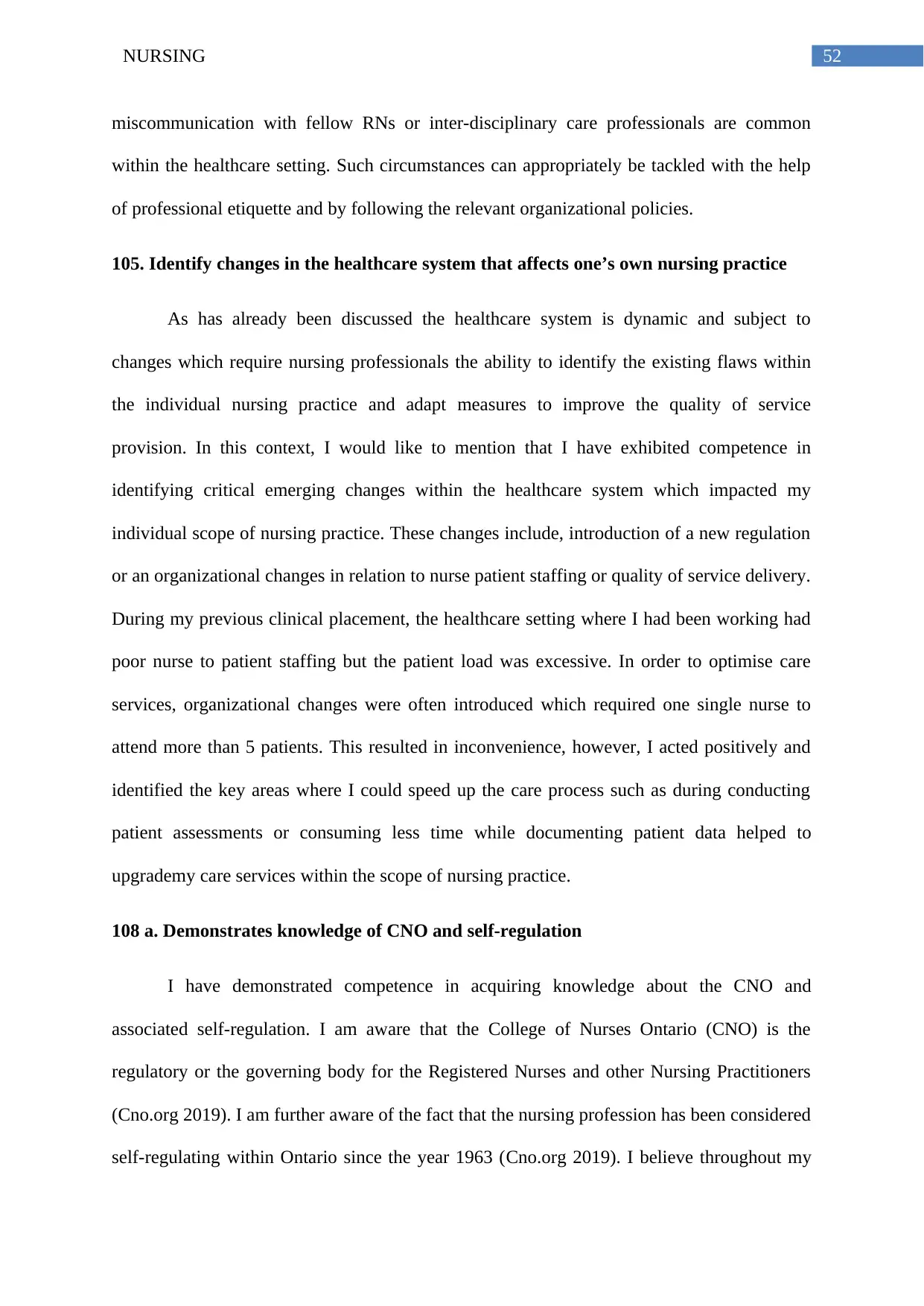
52NURSING
miscommunication with fellow RNs or inter-disciplinary care professionals are common
within the healthcare setting. Such circumstances can appropriately be tackled with the help
of professional etiquette and by following the relevant organizational policies.
105. Identify changes in the healthcare system that affects one’s own nursing practice
As has already been discussed the healthcare system is dynamic and subject to
changes which require nursing professionals the ability to identify the existing flaws within
the individual nursing practice and adapt measures to improve the quality of service
provision. In this context, I would like to mention that I have exhibited competence in
identifying critical emerging changes within the healthcare system which impacted my
individual scope of nursing practice. These changes include, introduction of a new regulation
or an organizational changes in relation to nurse patient staffing or quality of service delivery.
During my previous clinical placement, the healthcare setting where I had been working had
poor nurse to patient staffing but the patient load was excessive. In order to optimise care
services, organizational changes were often introduced which required one single nurse to
attend more than 5 patients. This resulted in inconvenience, however, I acted positively and
identified the key areas where I could speed up the care process such as during conducting
patient assessments or consuming less time while documenting patient data helped to
upgrademy care services within the scope of nursing practice.
108 a. Demonstrates knowledge of CNO and self-regulation
I have demonstrated competence in acquiring knowledge about the CNO and
associated self-regulation. I am aware that the College of Nurses Ontario (CNO) is the
regulatory or the governing body for the Registered Nurses and other Nursing Practitioners
(Cno.org 2019). I am further aware of the fact that the nursing profession has been considered
self-regulating within Ontario since the year 1963 (Cno.org 2019). I believe throughout my
miscommunication with fellow RNs or inter-disciplinary care professionals are common
within the healthcare setting. Such circumstances can appropriately be tackled with the help
of professional etiquette and by following the relevant organizational policies.
105. Identify changes in the healthcare system that affects one’s own nursing practice
As has already been discussed the healthcare system is dynamic and subject to
changes which require nursing professionals the ability to identify the existing flaws within
the individual nursing practice and adapt measures to improve the quality of service
provision. In this context, I would like to mention that I have exhibited competence in
identifying critical emerging changes within the healthcare system which impacted my
individual scope of nursing practice. These changes include, introduction of a new regulation
or an organizational changes in relation to nurse patient staffing or quality of service delivery.
During my previous clinical placement, the healthcare setting where I had been working had
poor nurse to patient staffing but the patient load was excessive. In order to optimise care
services, organizational changes were often introduced which required one single nurse to
attend more than 5 patients. This resulted in inconvenience, however, I acted positively and
identified the key areas where I could speed up the care process such as during conducting
patient assessments or consuming less time while documenting patient data helped to
upgrademy care services within the scope of nursing practice.
108 a. Demonstrates knowledge of CNO and self-regulation
I have demonstrated competence in acquiring knowledge about the CNO and
associated self-regulation. I am aware that the College of Nurses Ontario (CNO) is the
regulatory or the governing body for the Registered Nurses and other Nursing Practitioners
(Cno.org 2019). I am further aware of the fact that the nursing profession has been considered
self-regulating within Ontario since the year 1963 (Cno.org 2019). I believe throughout my
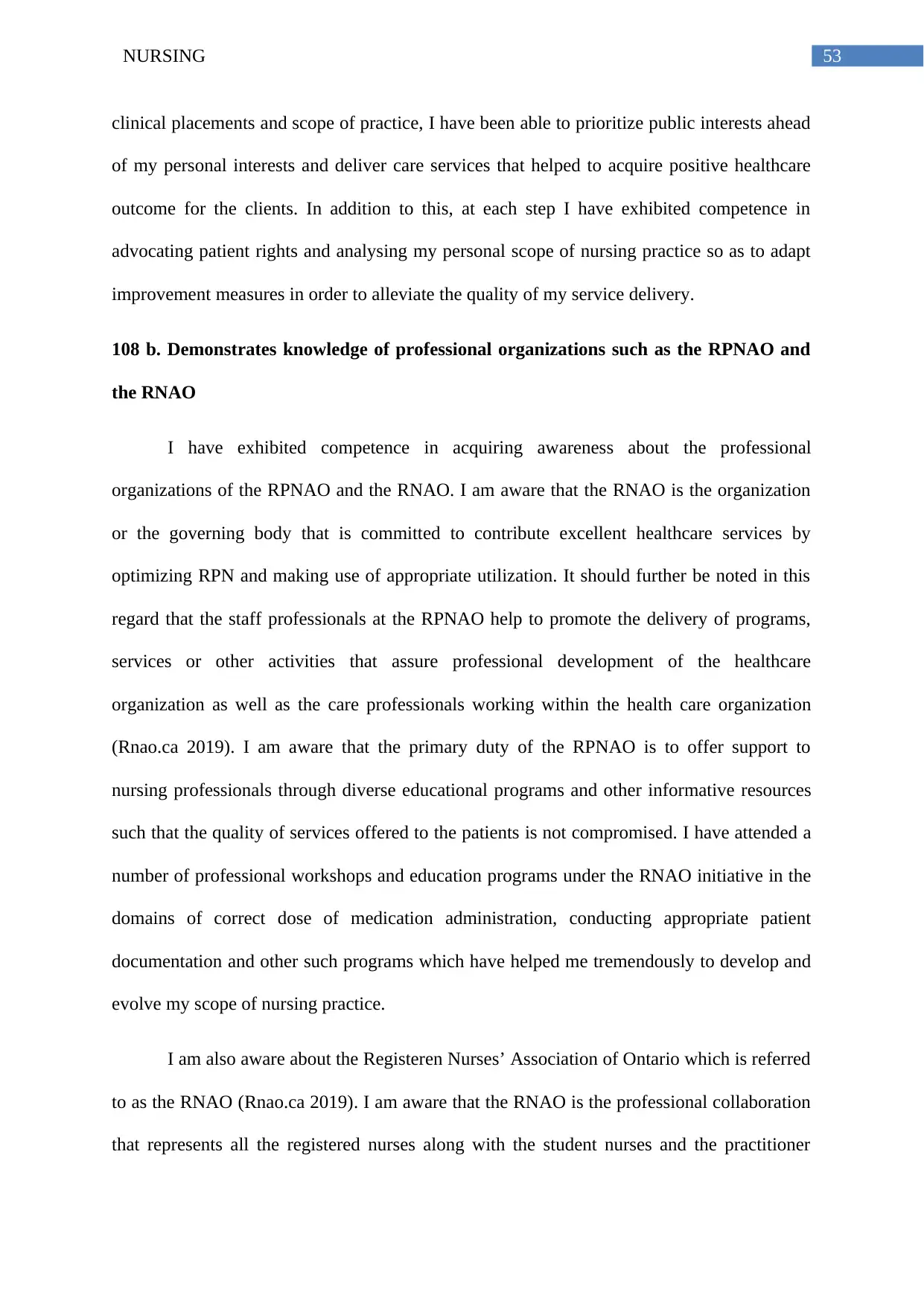
53NURSING
clinical placements and scope of practice, I have been able to prioritize public interests ahead
of my personal interests and deliver care services that helped to acquire positive healthcare
outcome for the clients. In addition to this, at each step I have exhibited competence in
advocating patient rights and analysing my personal scope of nursing practice so as to adapt
improvement measures in order to alleviate the quality of my service delivery.
108 b. Demonstrates knowledge of professional organizations such as the RPNAO and
the RNAO
I have exhibited competence in acquiring awareness about the professional
organizations of the RPNAO and the RNAO. I am aware that the RNAO is the organization
or the governing body that is committed to contribute excellent healthcare services by
optimizing RPN and making use of appropriate utilization. It should further be noted in this
regard that the staff professionals at the RPNAO help to promote the delivery of programs,
services or other activities that assure professional development of the healthcare
organization as well as the care professionals working within the health care organization
(Rnao.ca 2019). I am aware that the primary duty of the RPNAO is to offer support to
nursing professionals through diverse educational programs and other informative resources
such that the quality of services offered to the patients is not compromised. I have attended a
number of professional workshops and education programs under the RNAO initiative in the
domains of correct dose of medication administration, conducting appropriate patient
documentation and other such programs which have helped me tremendously to develop and
evolve my scope of nursing practice.
I am also aware about the Registeren Nurses’ Association of Ontario which is referred
to as the RNAO (Rnao.ca 2019). I am aware that the RNAO is the professional collaboration
that represents all the registered nurses along with the student nurses and the practitioner
clinical placements and scope of practice, I have been able to prioritize public interests ahead
of my personal interests and deliver care services that helped to acquire positive healthcare
outcome for the clients. In addition to this, at each step I have exhibited competence in
advocating patient rights and analysing my personal scope of nursing practice so as to adapt
improvement measures in order to alleviate the quality of my service delivery.
108 b. Demonstrates knowledge of professional organizations such as the RPNAO and
the RNAO
I have exhibited competence in acquiring awareness about the professional
organizations of the RPNAO and the RNAO. I am aware that the RNAO is the organization
or the governing body that is committed to contribute excellent healthcare services by
optimizing RPN and making use of appropriate utilization. It should further be noted in this
regard that the staff professionals at the RPNAO help to promote the delivery of programs,
services or other activities that assure professional development of the healthcare
organization as well as the care professionals working within the health care organization
(Rnao.ca 2019). I am aware that the primary duty of the RPNAO is to offer support to
nursing professionals through diverse educational programs and other informative resources
such that the quality of services offered to the patients is not compromised. I have attended a
number of professional workshops and education programs under the RNAO initiative in the
domains of correct dose of medication administration, conducting appropriate patient
documentation and other such programs which have helped me tremendously to develop and
evolve my scope of nursing practice.
I am also aware about the Registeren Nurses’ Association of Ontario which is referred
to as the RNAO (Rnao.ca 2019). I am aware that the RNAO is the professional collaboration
that represents all the registered nurses along with the student nurses and the practitioner
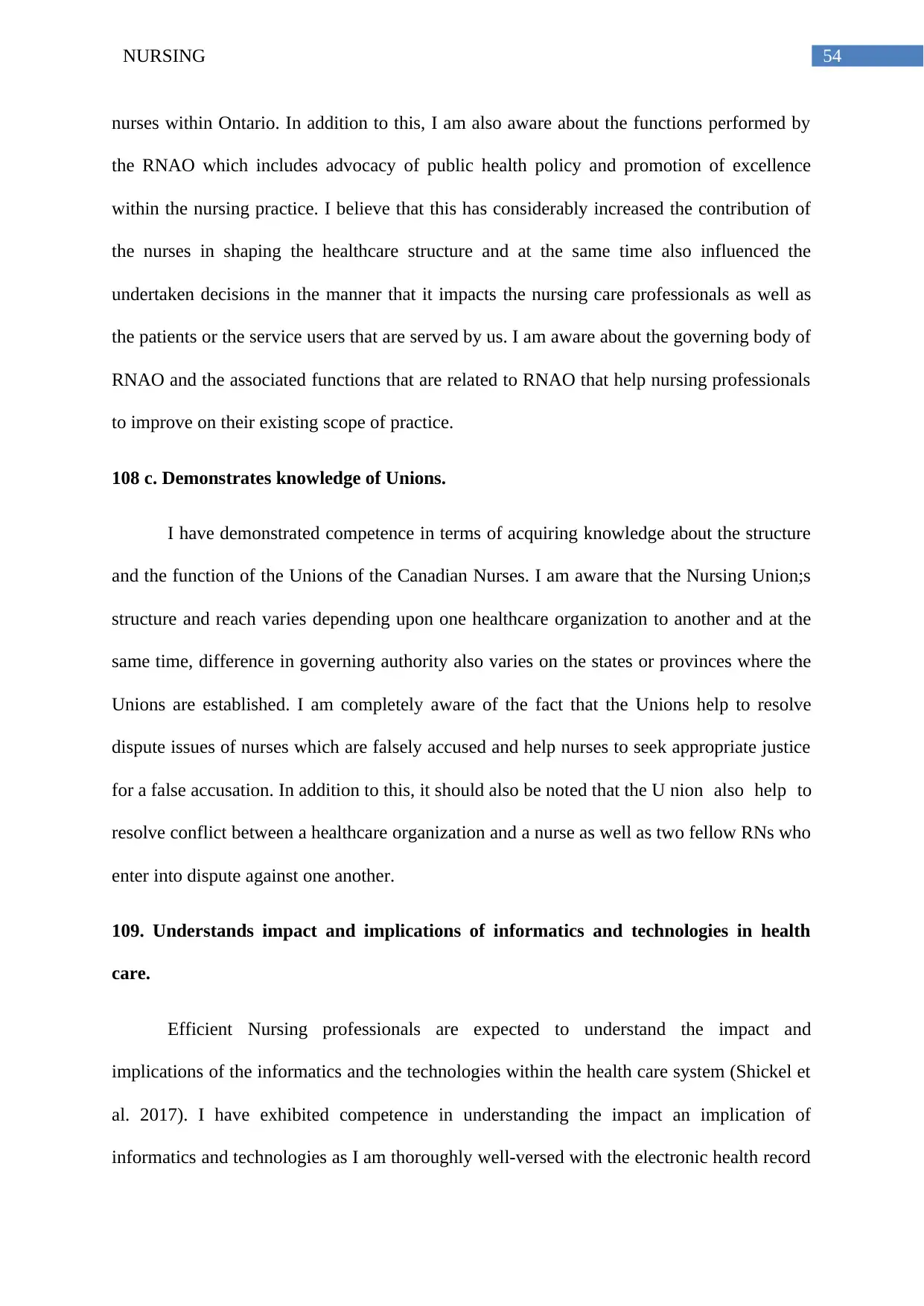
54NURSING
nurses within Ontario. In addition to this, I am also aware about the functions performed by
the RNAO which includes advocacy of public health policy and promotion of excellence
within the nursing practice. I believe that this has considerably increased the contribution of
the nurses in shaping the healthcare structure and at the same time also influenced the
undertaken decisions in the manner that it impacts the nursing care professionals as well as
the patients or the service users that are served by us. I am aware about the governing body of
RNAO and the associated functions that are related to RNAO that help nursing professionals
to improve on their existing scope of practice.
108 c. Demonstrates knowledge of Unions.
I have demonstrated competence in terms of acquiring knowledge about the structure
and the function of the Unions of the Canadian Nurses. I am aware that the Nursing Union;s
structure and reach varies depending upon one healthcare organization to another and at the
same time, difference in governing authority also varies on the states or provinces where the
Unions are established. I am completely aware of the fact that the Unions help to resolve
dispute issues of nurses which are falsely accused and help nurses to seek appropriate justice
for a false accusation. In addition to this, it should also be noted that the U nion also help to
resolve conflict between a healthcare organization and a nurse as well as two fellow RNs who
enter into dispute against one another.
109. Understands impact and implications of informatics and technologies in health
care.
Efficient Nursing professionals are expected to understand the impact and
implications of the informatics and the technologies within the health care system (Shickel et
al. 2017). I have exhibited competence in understanding the impact an implication of
informatics and technologies as I am thoroughly well-versed with the electronic health record
nurses within Ontario. In addition to this, I am also aware about the functions performed by
the RNAO which includes advocacy of public health policy and promotion of excellence
within the nursing practice. I believe that this has considerably increased the contribution of
the nurses in shaping the healthcare structure and at the same time also influenced the
undertaken decisions in the manner that it impacts the nursing care professionals as well as
the patients or the service users that are served by us. I am aware about the governing body of
RNAO and the associated functions that are related to RNAO that help nursing professionals
to improve on their existing scope of practice.
108 c. Demonstrates knowledge of Unions.
I have demonstrated competence in terms of acquiring knowledge about the structure
and the function of the Unions of the Canadian Nurses. I am aware that the Nursing Union;s
structure and reach varies depending upon one healthcare organization to another and at the
same time, difference in governing authority also varies on the states or provinces where the
Unions are established. I am completely aware of the fact that the Unions help to resolve
dispute issues of nurses which are falsely accused and help nurses to seek appropriate justice
for a false accusation. In addition to this, it should also be noted that the U nion also help to
resolve conflict between a healthcare organization and a nurse as well as two fellow RNs who
enter into dispute against one another.
109. Understands impact and implications of informatics and technologies in health
care.
Efficient Nursing professionals are expected to understand the impact and
implications of the informatics and the technologies within the health care system (Shickel et
al. 2017). I have exhibited competence in understanding the impact an implication of
informatics and technologies as I am thoroughly well-versed with the electronic health record
Paraphrase This Document
Need a fresh take? Get an instant paraphrase of this document with our AI Paraphraser
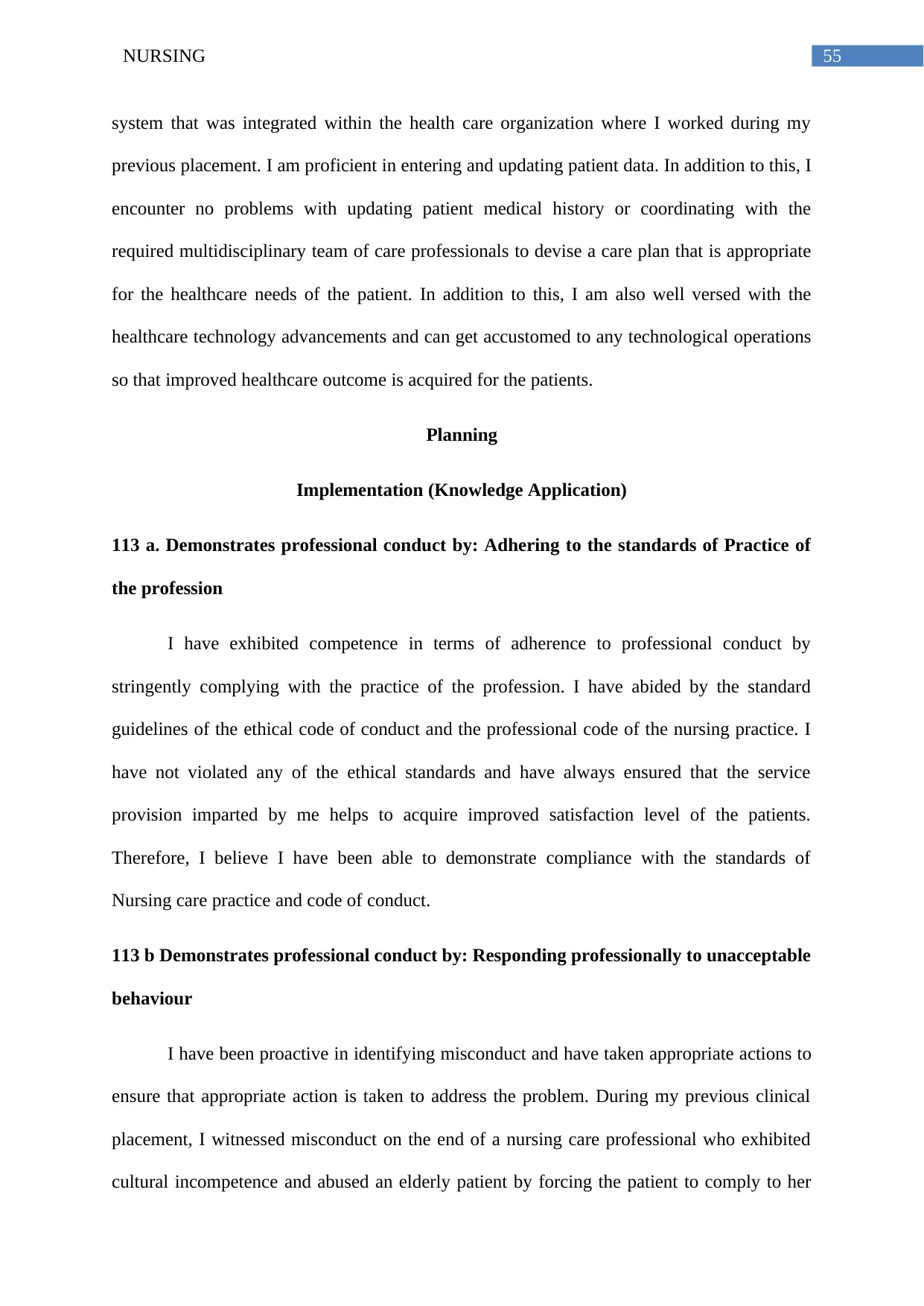
55NURSING
system that was integrated within the health care organization where I worked during my
previous placement. I am proficient in entering and updating patient data. In addition to this, I
encounter no problems with updating patient medical history or coordinating with the
required multidisciplinary team of care professionals to devise a care plan that is appropriate
for the healthcare needs of the patient. In addition to this, I am also well versed with the
healthcare technology advancements and can get accustomed to any technological operations
so that improved healthcare outcome is acquired for the patients.
Planning
Implementation (Knowledge Application)
113 a. Demonstrates professional conduct by: Adhering to the standards of Practice of
the profession
I have exhibited competence in terms of adherence to professional conduct by
stringently complying with the practice of the profession. I have abided by the standard
guidelines of the ethical code of conduct and the professional code of the nursing practice. I
have not violated any of the ethical standards and have always ensured that the service
provision imparted by me helps to acquire improved satisfaction level of the patients.
Therefore, I believe I have been able to demonstrate compliance with the standards of
Nursing care practice and code of conduct.
113 b Demonstrates professional conduct by: Responding professionally to unacceptable
behaviour
I have been proactive in identifying misconduct and have taken appropriate actions to
ensure that appropriate action is taken to address the problem. During my previous clinical
placement, I witnessed misconduct on the end of a nursing care professional who exhibited
cultural incompetence and abused an elderly patient by forcing the patient to comply to her
system that was integrated within the health care organization where I worked during my
previous placement. I am proficient in entering and updating patient data. In addition to this, I
encounter no problems with updating patient medical history or coordinating with the
required multidisciplinary team of care professionals to devise a care plan that is appropriate
for the healthcare needs of the patient. In addition to this, I am also well versed with the
healthcare technology advancements and can get accustomed to any technological operations
so that improved healthcare outcome is acquired for the patients.
Planning
Implementation (Knowledge Application)
113 a. Demonstrates professional conduct by: Adhering to the standards of Practice of
the profession
I have exhibited competence in terms of adherence to professional conduct by
stringently complying with the practice of the profession. I have abided by the standard
guidelines of the ethical code of conduct and the professional code of the nursing practice. I
have not violated any of the ethical standards and have always ensured that the service
provision imparted by me helps to acquire improved satisfaction level of the patients.
Therefore, I believe I have been able to demonstrate compliance with the standards of
Nursing care practice and code of conduct.
113 b Demonstrates professional conduct by: Responding professionally to unacceptable
behaviour
I have been proactive in identifying misconduct and have taken appropriate actions to
ensure that appropriate action is taken to address the problem. During my previous clinical
placement, I witnessed misconduct on the end of a nursing care professional who exhibited
cultural incompetence and abused an elderly patient by forcing the patient to comply to her
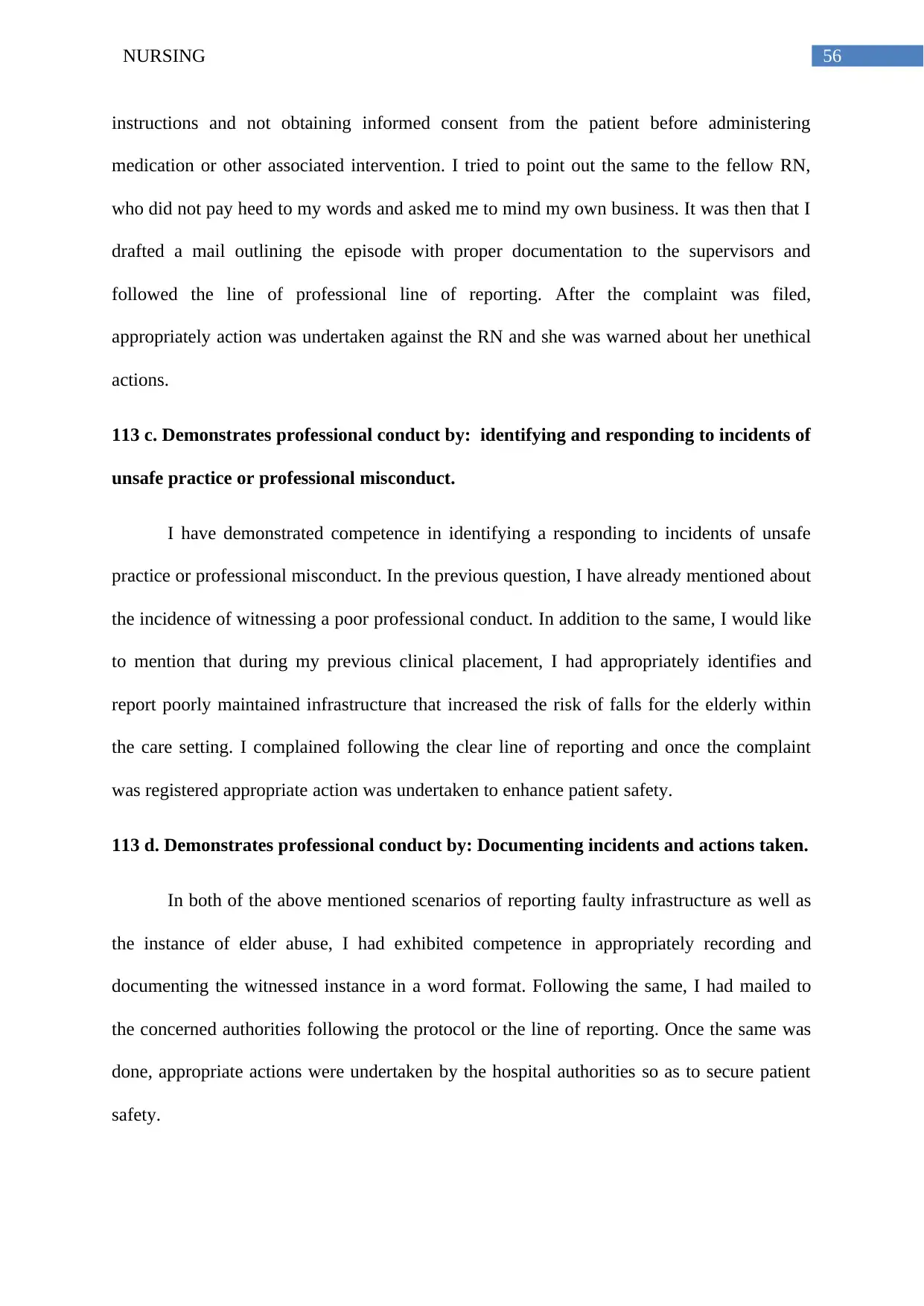
56NURSING
instructions and not obtaining informed consent from the patient before administering
medication or other associated intervention. I tried to point out the same to the fellow RN,
who did not pay heed to my words and asked me to mind my own business. It was then that I
drafted a mail outlining the episode with proper documentation to the supervisors and
followed the line of professional line of reporting. After the complaint was filed,
appropriately action was undertaken against the RN and she was warned about her unethical
actions.
113 c. Demonstrates professional conduct by: identifying and responding to incidents of
unsafe practice or professional misconduct.
I have demonstrated competence in identifying a responding to incidents of unsafe
practice or professional misconduct. In the previous question, I have already mentioned about
the incidence of witnessing a poor professional conduct. In addition to the same, I would like
to mention that during my previous clinical placement, I had appropriately identifies and
report poorly maintained infrastructure that increased the risk of falls for the elderly within
the care setting. I complained following the clear line of reporting and once the complaint
was registered appropriate action was undertaken to enhance patient safety.
113 d. Demonstrates professional conduct by: Documenting incidents and actions taken.
In both of the above mentioned scenarios of reporting faulty infrastructure as well as
the instance of elder abuse, I had exhibited competence in appropriately recording and
documenting the witnessed instance in a word format. Following the same, I had mailed to
the concerned authorities following the protocol or the line of reporting. Once the same was
done, appropriate actions were undertaken by the hospital authorities so as to secure patient
safety.
instructions and not obtaining informed consent from the patient before administering
medication or other associated intervention. I tried to point out the same to the fellow RN,
who did not pay heed to my words and asked me to mind my own business. It was then that I
drafted a mail outlining the episode with proper documentation to the supervisors and
followed the line of professional line of reporting. After the complaint was filed,
appropriately action was undertaken against the RN and she was warned about her unethical
actions.
113 c. Demonstrates professional conduct by: identifying and responding to incidents of
unsafe practice or professional misconduct.
I have demonstrated competence in identifying a responding to incidents of unsafe
practice or professional misconduct. In the previous question, I have already mentioned about
the incidence of witnessing a poor professional conduct. In addition to the same, I would like
to mention that during my previous clinical placement, I had appropriately identifies and
report poorly maintained infrastructure that increased the risk of falls for the elderly within
the care setting. I complained following the clear line of reporting and once the complaint
was registered appropriate action was undertaken to enhance patient safety.
113 d. Demonstrates professional conduct by: Documenting incidents and actions taken.
In both of the above mentioned scenarios of reporting faulty infrastructure as well as
the instance of elder abuse, I had exhibited competence in appropriately recording and
documenting the witnessed instance in a word format. Following the same, I had mailed to
the concerned authorities following the protocol or the line of reporting. Once the same was
done, appropriate actions were undertaken by the hospital authorities so as to secure patient
safety.
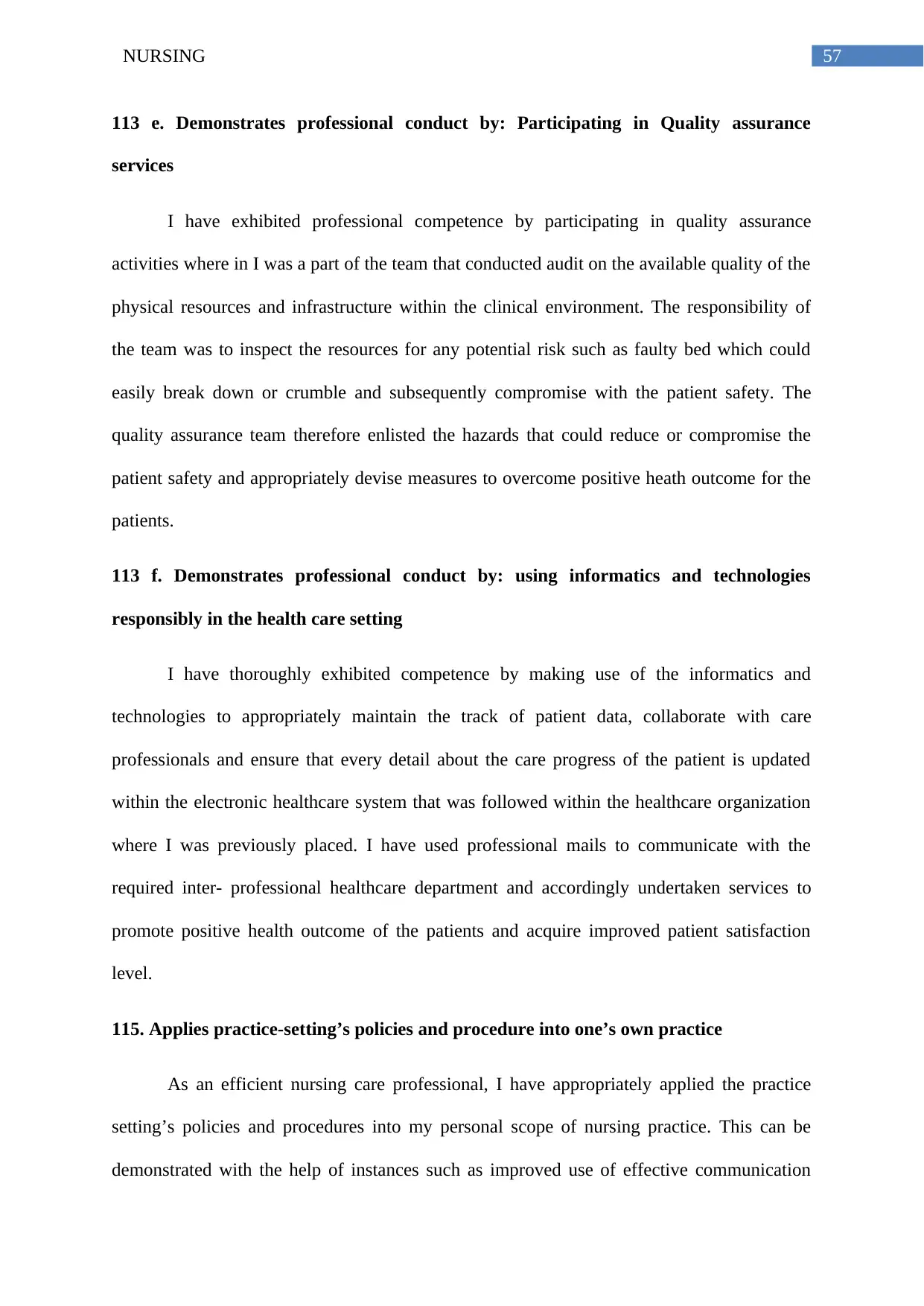
57NURSING
113 e. Demonstrates professional conduct by: Participating in Quality assurance
services
I have exhibited professional competence by participating in quality assurance
activities where in I was a part of the team that conducted audit on the available quality of the
physical resources and infrastructure within the clinical environment. The responsibility of
the team was to inspect the resources for any potential risk such as faulty bed which could
easily break down or crumble and subsequently compromise with the patient safety. The
quality assurance team therefore enlisted the hazards that could reduce or compromise the
patient safety and appropriately devise measures to overcome positive heath outcome for the
patients.
113 f. Demonstrates professional conduct by: using informatics and technologies
responsibly in the health care setting
I have thoroughly exhibited competence by making use of the informatics and
technologies to appropriately maintain the track of patient data, collaborate with care
professionals and ensure that every detail about the care progress of the patient is updated
within the electronic healthcare system that was followed within the healthcare organization
where I was previously placed. I have used professional mails to communicate with the
required inter- professional healthcare department and accordingly undertaken services to
promote positive health outcome of the patients and acquire improved patient satisfaction
level.
115. Applies practice-setting’s policies and procedure into one’s own practice
As an efficient nursing care professional, I have appropriately applied the practice
setting’s policies and procedures into my personal scope of nursing practice. This can be
demonstrated with the help of instances such as improved use of effective communication
113 e. Demonstrates professional conduct by: Participating in Quality assurance
services
I have exhibited professional competence by participating in quality assurance
activities where in I was a part of the team that conducted audit on the available quality of the
physical resources and infrastructure within the clinical environment. The responsibility of
the team was to inspect the resources for any potential risk such as faulty bed which could
easily break down or crumble and subsequently compromise with the patient safety. The
quality assurance team therefore enlisted the hazards that could reduce or compromise the
patient safety and appropriately devise measures to overcome positive heath outcome for the
patients.
113 f. Demonstrates professional conduct by: using informatics and technologies
responsibly in the health care setting
I have thoroughly exhibited competence by making use of the informatics and
technologies to appropriately maintain the track of patient data, collaborate with care
professionals and ensure that every detail about the care progress of the patient is updated
within the electronic healthcare system that was followed within the healthcare organization
where I was previously placed. I have used professional mails to communicate with the
required inter- professional healthcare department and accordingly undertaken services to
promote positive health outcome of the patients and acquire improved patient satisfaction
level.
115. Applies practice-setting’s policies and procedure into one’s own practice
As an efficient nursing care professional, I have appropriately applied the practice
setting’s policies and procedures into my personal scope of nursing practice. This can be
demonstrated with the help of instances such as improved use of effective communication
Secure Best Marks with AI Grader
Need help grading? Try our AI Grader for instant feedback on your assignments.
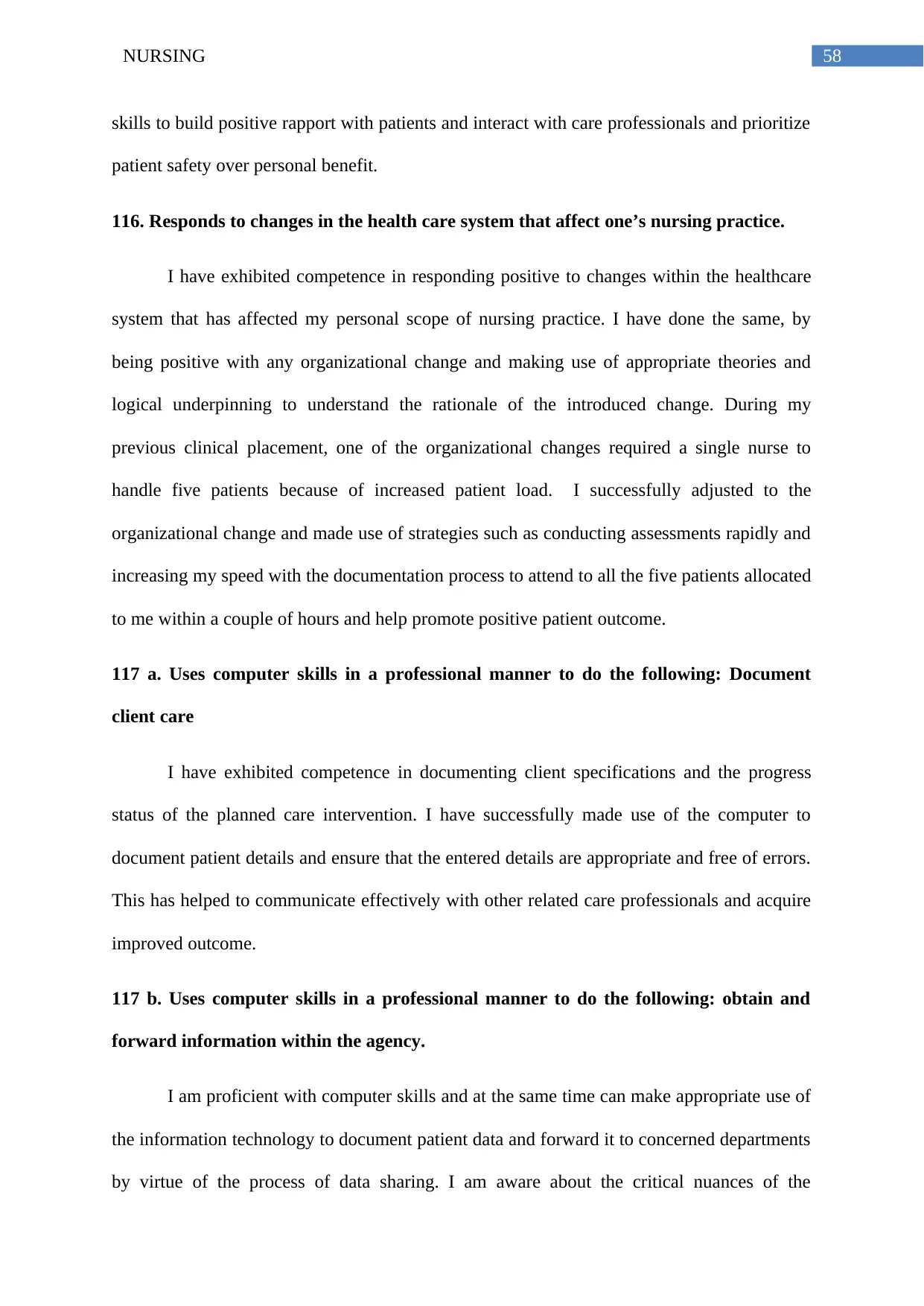
58NURSING
skills to build positive rapport with patients and interact with care professionals and prioritize
patient safety over personal benefit.
116. Responds to changes in the health care system that affect one’s nursing practice.
I have exhibited competence in responding positive to changes within the healthcare
system that has affected my personal scope of nursing practice. I have done the same, by
being positive with any organizational change and making use of appropriate theories and
logical underpinning to understand the rationale of the introduced change. During my
previous clinical placement, one of the organizational changes required a single nurse to
handle five patients because of increased patient load. I successfully adjusted to the
organizational change and made use of strategies such as conducting assessments rapidly and
increasing my speed with the documentation process to attend to all the five patients allocated
to me within a couple of hours and help promote positive patient outcome.
117 a. Uses computer skills in a professional manner to do the following: Document
client care
I have exhibited competence in documenting client specifications and the progress
status of the planned care intervention. I have successfully made use of the computer to
document patient details and ensure that the entered details are appropriate and free of errors.
This has helped to communicate effectively with other related care professionals and acquire
improved outcome.
117 b. Uses computer skills in a professional manner to do the following: obtain and
forward information within the agency.
I am proficient with computer skills and at the same time can make appropriate use of
the information technology to document patient data and forward it to concerned departments
by virtue of the process of data sharing. I am aware about the critical nuances of the
skills to build positive rapport with patients and interact with care professionals and prioritize
patient safety over personal benefit.
116. Responds to changes in the health care system that affect one’s nursing practice.
I have exhibited competence in responding positive to changes within the healthcare
system that has affected my personal scope of nursing practice. I have done the same, by
being positive with any organizational change and making use of appropriate theories and
logical underpinning to understand the rationale of the introduced change. During my
previous clinical placement, one of the organizational changes required a single nurse to
handle five patients because of increased patient load. I successfully adjusted to the
organizational change and made use of strategies such as conducting assessments rapidly and
increasing my speed with the documentation process to attend to all the five patients allocated
to me within a couple of hours and help promote positive patient outcome.
117 a. Uses computer skills in a professional manner to do the following: Document
client care
I have exhibited competence in documenting client specifications and the progress
status of the planned care intervention. I have successfully made use of the computer to
document patient details and ensure that the entered details are appropriate and free of errors.
This has helped to communicate effectively with other related care professionals and acquire
improved outcome.
117 b. Uses computer skills in a professional manner to do the following: obtain and
forward information within the agency.
I am proficient with computer skills and at the same time can make appropriate use of
the information technology to document patient data and forward it to concerned departments
by virtue of the process of data sharing. I am aware about the critical nuances of the
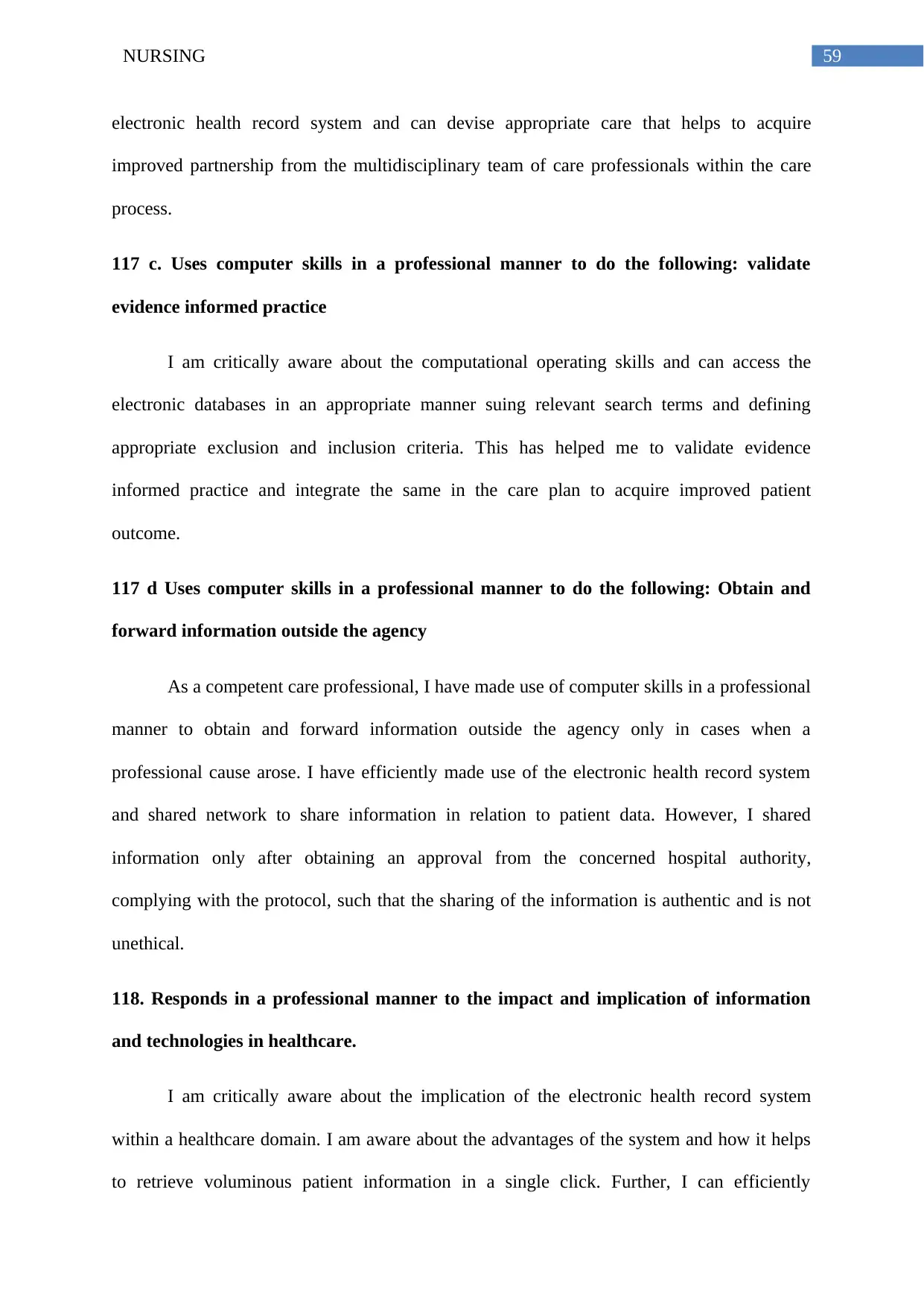
59NURSING
electronic health record system and can devise appropriate care that helps to acquire
improved partnership from the multidisciplinary team of care professionals within the care
process.
117 c. Uses computer skills in a professional manner to do the following: validate
evidence informed practice
I am critically aware about the computational operating skills and can access the
electronic databases in an appropriate manner suing relevant search terms and defining
appropriate exclusion and inclusion criteria. This has helped me to validate evidence
informed practice and integrate the same in the care plan to acquire improved patient
outcome.
117 d Uses computer skills in a professional manner to do the following: Obtain and
forward information outside the agency
As a competent care professional, I have made use of computer skills in a professional
manner to obtain and forward information outside the agency only in cases when a
professional cause arose. I have efficiently made use of the electronic health record system
and shared network to share information in relation to patient data. However, I shared
information only after obtaining an approval from the concerned hospital authority,
complying with the protocol, such that the sharing of the information is authentic and is not
unethical.
118. Responds in a professional manner to the impact and implication of information
and technologies in healthcare.
I am critically aware about the implication of the electronic health record system
within a healthcare domain. I am aware about the advantages of the system and how it helps
to retrieve voluminous patient information in a single click. Further, I can efficiently
electronic health record system and can devise appropriate care that helps to acquire
improved partnership from the multidisciplinary team of care professionals within the care
process.
117 c. Uses computer skills in a professional manner to do the following: validate
evidence informed practice
I am critically aware about the computational operating skills and can access the
electronic databases in an appropriate manner suing relevant search terms and defining
appropriate exclusion and inclusion criteria. This has helped me to validate evidence
informed practice and integrate the same in the care plan to acquire improved patient
outcome.
117 d Uses computer skills in a professional manner to do the following: Obtain and
forward information outside the agency
As a competent care professional, I have made use of computer skills in a professional
manner to obtain and forward information outside the agency only in cases when a
professional cause arose. I have efficiently made use of the electronic health record system
and shared network to share information in relation to patient data. However, I shared
information only after obtaining an approval from the concerned hospital authority,
complying with the protocol, such that the sharing of the information is authentic and is not
unethical.
118. Responds in a professional manner to the impact and implication of information
and technologies in healthcare.
I am critically aware about the implication of the electronic health record system
within a healthcare domain. I am aware about the advantages of the system and how it helps
to retrieve voluminous patient information in a single click. Further, I can efficiently
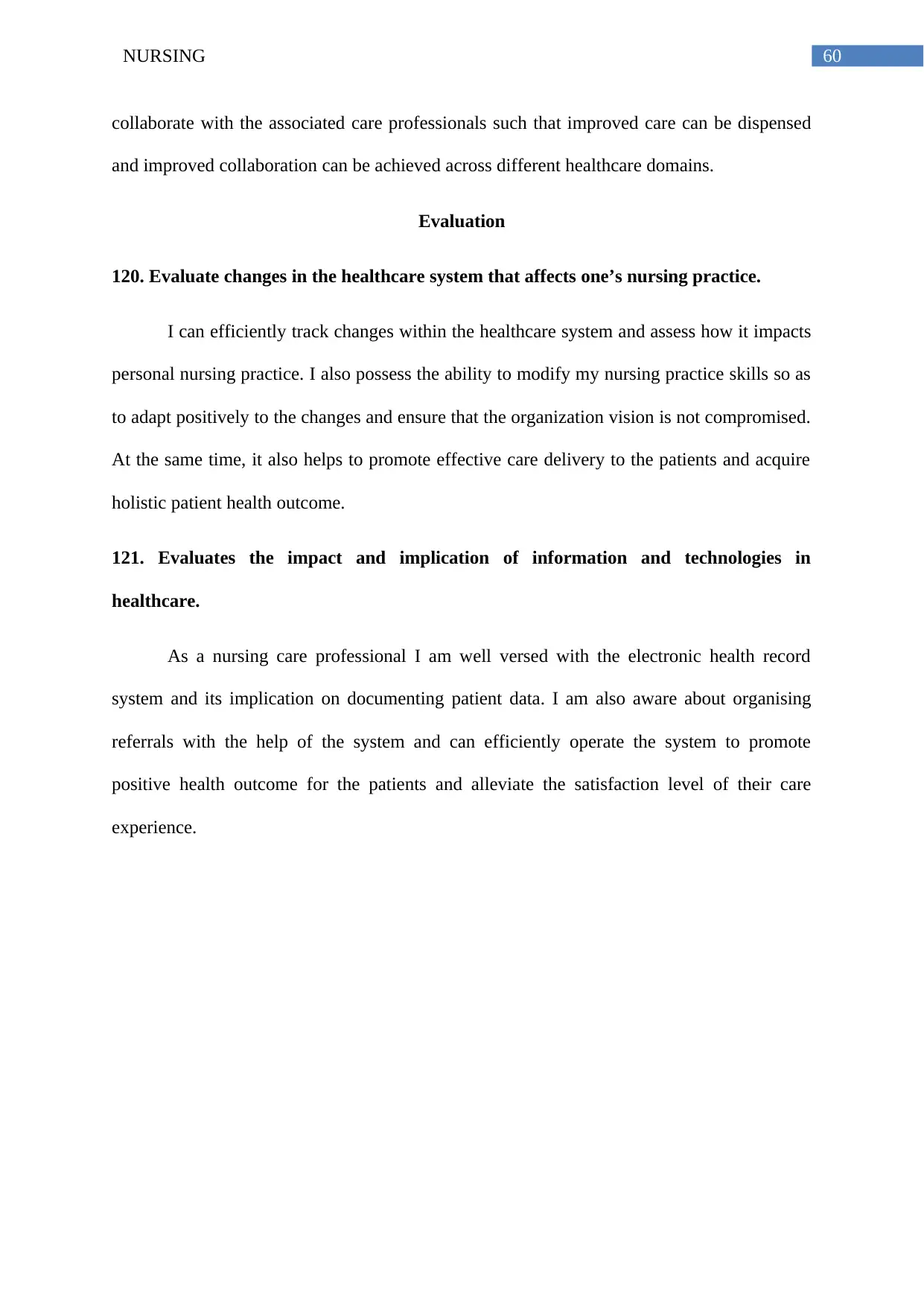
60NURSING
collaborate with the associated care professionals such that improved care can be dispensed
and improved collaboration can be achieved across different healthcare domains.
Evaluation
120. Evaluate changes in the healthcare system that affects one’s nursing practice.
I can efficiently track changes within the healthcare system and assess how it impacts
personal nursing practice. I also possess the ability to modify my nursing practice skills so as
to adapt positively to the changes and ensure that the organization vision is not compromised.
At the same time, it also helps to promote effective care delivery to the patients and acquire
holistic patient health outcome.
121. Evaluates the impact and implication of information and technologies in
healthcare.
As a nursing care professional I am well versed with the electronic health record
system and its implication on documenting patient data. I am also aware about organising
referrals with the help of the system and can efficiently operate the system to promote
positive health outcome for the patients and alleviate the satisfaction level of their care
experience.
collaborate with the associated care professionals such that improved care can be dispensed
and improved collaboration can be achieved across different healthcare domains.
Evaluation
120. Evaluate changes in the healthcare system that affects one’s nursing practice.
I can efficiently track changes within the healthcare system and assess how it impacts
personal nursing practice. I also possess the ability to modify my nursing practice skills so as
to adapt positively to the changes and ensure that the organization vision is not compromised.
At the same time, it also helps to promote effective care delivery to the patients and acquire
holistic patient health outcome.
121. Evaluates the impact and implication of information and technologies in
healthcare.
As a nursing care professional I am well versed with the electronic health record
system and its implication on documenting patient data. I am also aware about organising
referrals with the help of the system and can efficiently operate the system to promote
positive health outcome for the patients and alleviate the satisfaction level of their care
experience.
Paraphrase This Document
Need a fresh take? Get an instant paraphrase of this document with our AI Paraphraser
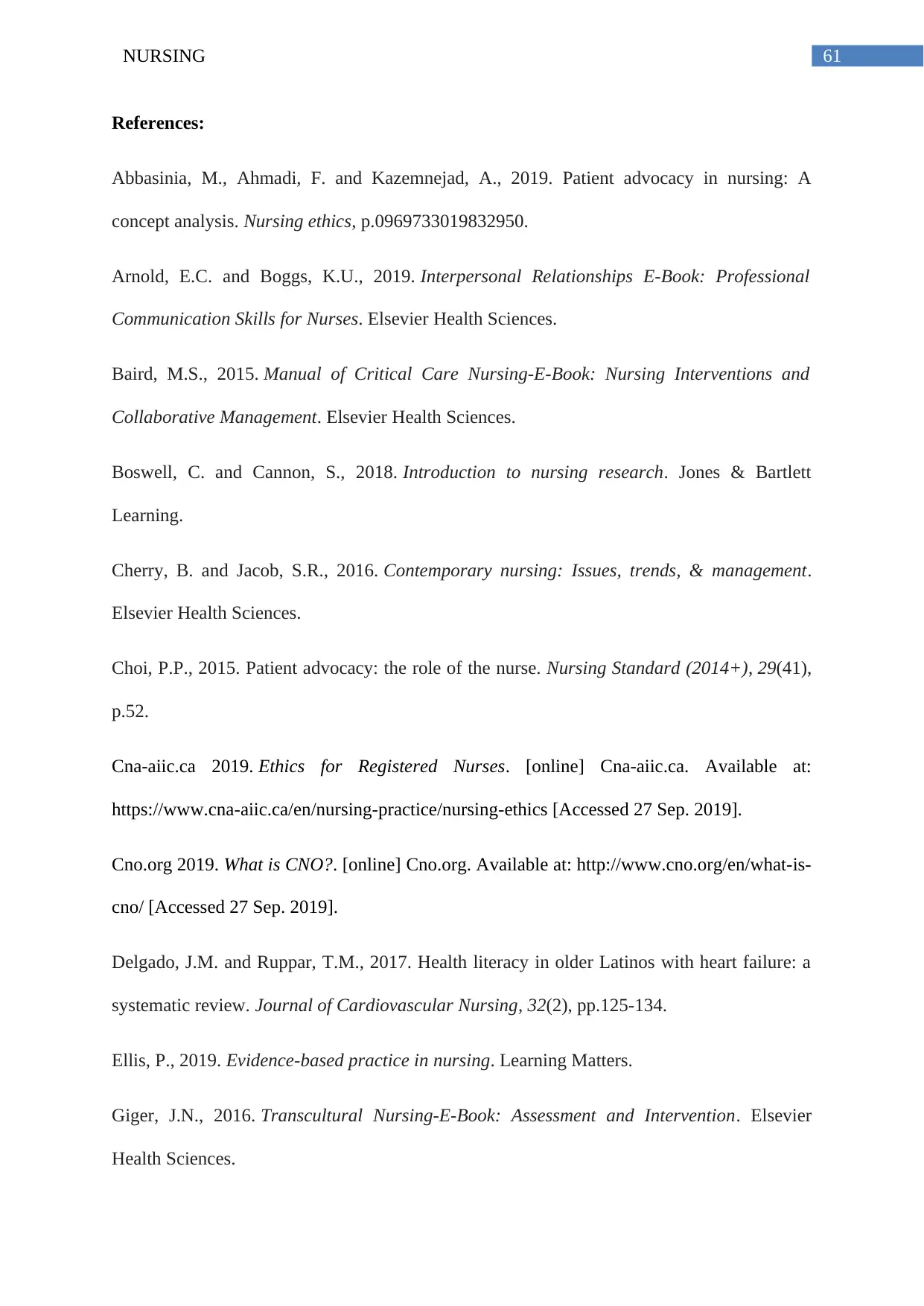
61NURSING
References:
Abbasinia, M., Ahmadi, F. and Kazemnejad, A., 2019. Patient advocacy in nursing: A
concept analysis. Nursing ethics, p.0969733019832950.
Arnold, E.C. and Boggs, K.U., 2019. Interpersonal Relationships E-Book: Professional
Communication Skills for Nurses. Elsevier Health Sciences.
Baird, M.S., 2015. Manual of Critical Care Nursing-E-Book: Nursing Interventions and
Collaborative Management. Elsevier Health Sciences.
Boswell, C. and Cannon, S., 2018. Introduction to nursing research. Jones & Bartlett
Learning.
Cherry, B. and Jacob, S.R., 2016. Contemporary nursing: Issues, trends, & management.
Elsevier Health Sciences.
Choi, P.P., 2015. Patient advocacy: the role of the nurse. Nursing Standard (2014+), 29(41),
p.52.
Cna-aiic.ca 2019. Ethics for Registered Nurses. [online] Cna-aiic.ca. Available at:
https://www.cna-aiic.ca/en/nursing-practice/nursing-ethics [Accessed 27 Sep. 2019].
Cno.org 2019. What is CNO?. [online] Cno.org. Available at: http://www.cno.org/en/what-is-
cno/ [Accessed 27 Sep. 2019].
Delgado, J.M. and Ruppar, T.M., 2017. Health literacy in older Latinos with heart failure: a
systematic review. Journal of Cardiovascular Nursing, 32(2), pp.125-134.
Ellis, P., 2019. Evidence-based practice in nursing. Learning Matters.
Giger, J.N., 2016. Transcultural Nursing-E-Book: Assessment and Intervention. Elsevier
Health Sciences.
References:
Abbasinia, M., Ahmadi, F. and Kazemnejad, A., 2019. Patient advocacy in nursing: A
concept analysis. Nursing ethics, p.0969733019832950.
Arnold, E.C. and Boggs, K.U., 2019. Interpersonal Relationships E-Book: Professional
Communication Skills for Nurses. Elsevier Health Sciences.
Baird, M.S., 2015. Manual of Critical Care Nursing-E-Book: Nursing Interventions and
Collaborative Management. Elsevier Health Sciences.
Boswell, C. and Cannon, S., 2018. Introduction to nursing research. Jones & Bartlett
Learning.
Cherry, B. and Jacob, S.R., 2016. Contemporary nursing: Issues, trends, & management.
Elsevier Health Sciences.
Choi, P.P., 2015. Patient advocacy: the role of the nurse. Nursing Standard (2014+), 29(41),
p.52.
Cna-aiic.ca 2019. Ethics for Registered Nurses. [online] Cna-aiic.ca. Available at:
https://www.cna-aiic.ca/en/nursing-practice/nursing-ethics [Accessed 27 Sep. 2019].
Cno.org 2019. What is CNO?. [online] Cno.org. Available at: http://www.cno.org/en/what-is-
cno/ [Accessed 27 Sep. 2019].
Delgado, J.M. and Ruppar, T.M., 2017. Health literacy in older Latinos with heart failure: a
systematic review. Journal of Cardiovascular Nursing, 32(2), pp.125-134.
Ellis, P., 2019. Evidence-based practice in nursing. Learning Matters.
Giger, J.N., 2016. Transcultural Nursing-E-Book: Assessment and Intervention. Elsevier
Health Sciences.
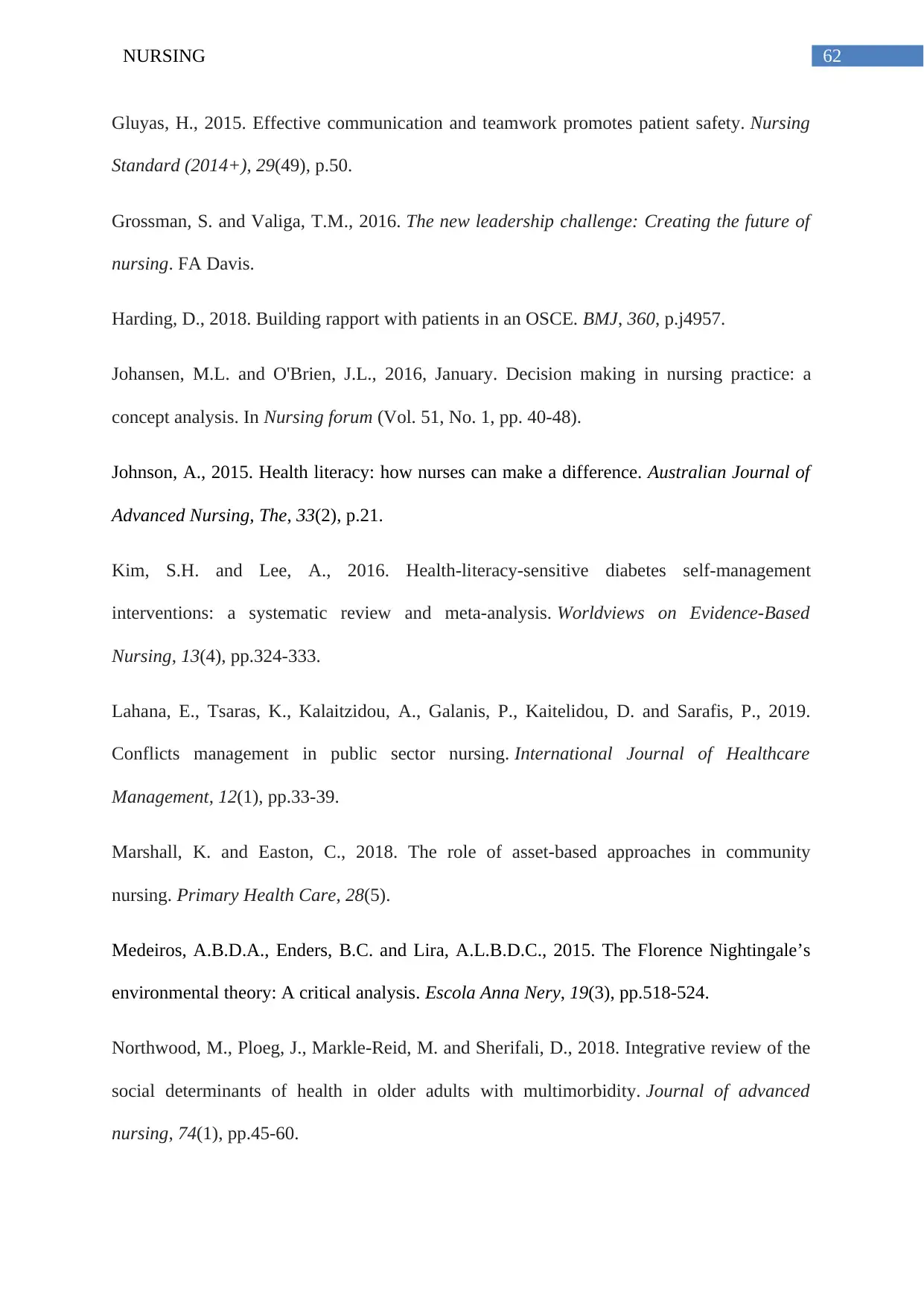
62NURSING
Gluyas, H., 2015. Effective communication and teamwork promotes patient safety. Nursing
Standard (2014+), 29(49), p.50.
Grossman, S. and Valiga, T.M., 2016. The new leadership challenge: Creating the future of
nursing. FA Davis.
Harding, D., 2018. Building rapport with patients in an OSCE. BMJ, 360, p.j4957.
Johansen, M.L. and O'Brien, J.L., 2016, January. Decision making in nursing practice: a
concept analysis. In Nursing forum (Vol. 51, No. 1, pp. 40-48).
Johnson, A., 2015. Health literacy: how nurses can make a difference. Australian Journal of
Advanced Nursing, The, 33(2), p.21.
Kim, S.H. and Lee, A., 2016. Health‐literacy‐sensitive diabetes self‐management
interventions: a systematic review and meta‐analysis. Worldviews on Evidence‐Based
Nursing, 13(4), pp.324-333.
Lahana, E., Tsaras, K., Kalaitzidou, A., Galanis, P., Kaitelidou, D. and Sarafis, P., 2019.
Conflicts management in public sector nursing. International Journal of Healthcare
Management, 12(1), pp.33-39.
Marshall, K. and Easton, C., 2018. The role of asset-based approaches in community
nursing. Primary Health Care, 28(5).
Medeiros, A.B.D.A., Enders, B.C. and Lira, A.L.B.D.C., 2015. The Florence Nightingale’s
environmental theory: A critical analysis. Escola Anna Nery, 19(3), pp.518-524.
Northwood, M., Ploeg, J., Markle‐Reid, M. and Sherifali, D., 2018. Integrative review of the
social determinants of health in older adults with multimorbidity. Journal of advanced
nursing, 74(1), pp.45-60.
Gluyas, H., 2015. Effective communication and teamwork promotes patient safety. Nursing
Standard (2014+), 29(49), p.50.
Grossman, S. and Valiga, T.M., 2016. The new leadership challenge: Creating the future of
nursing. FA Davis.
Harding, D., 2018. Building rapport with patients in an OSCE. BMJ, 360, p.j4957.
Johansen, M.L. and O'Brien, J.L., 2016, January. Decision making in nursing practice: a
concept analysis. In Nursing forum (Vol. 51, No. 1, pp. 40-48).
Johnson, A., 2015. Health literacy: how nurses can make a difference. Australian Journal of
Advanced Nursing, The, 33(2), p.21.
Kim, S.H. and Lee, A., 2016. Health‐literacy‐sensitive diabetes self‐management
interventions: a systematic review and meta‐analysis. Worldviews on Evidence‐Based
Nursing, 13(4), pp.324-333.
Lahana, E., Tsaras, K., Kalaitzidou, A., Galanis, P., Kaitelidou, D. and Sarafis, P., 2019.
Conflicts management in public sector nursing. International Journal of Healthcare
Management, 12(1), pp.33-39.
Marshall, K. and Easton, C., 2018. The role of asset-based approaches in community
nursing. Primary Health Care, 28(5).
Medeiros, A.B.D.A., Enders, B.C. and Lira, A.L.B.D.C., 2015. The Florence Nightingale’s
environmental theory: A critical analysis. Escola Anna Nery, 19(3), pp.518-524.
Northwood, M., Ploeg, J., Markle‐Reid, M. and Sherifali, D., 2018. Integrative review of the
social determinants of health in older adults with multimorbidity. Journal of advanced
nursing, 74(1), pp.45-60.
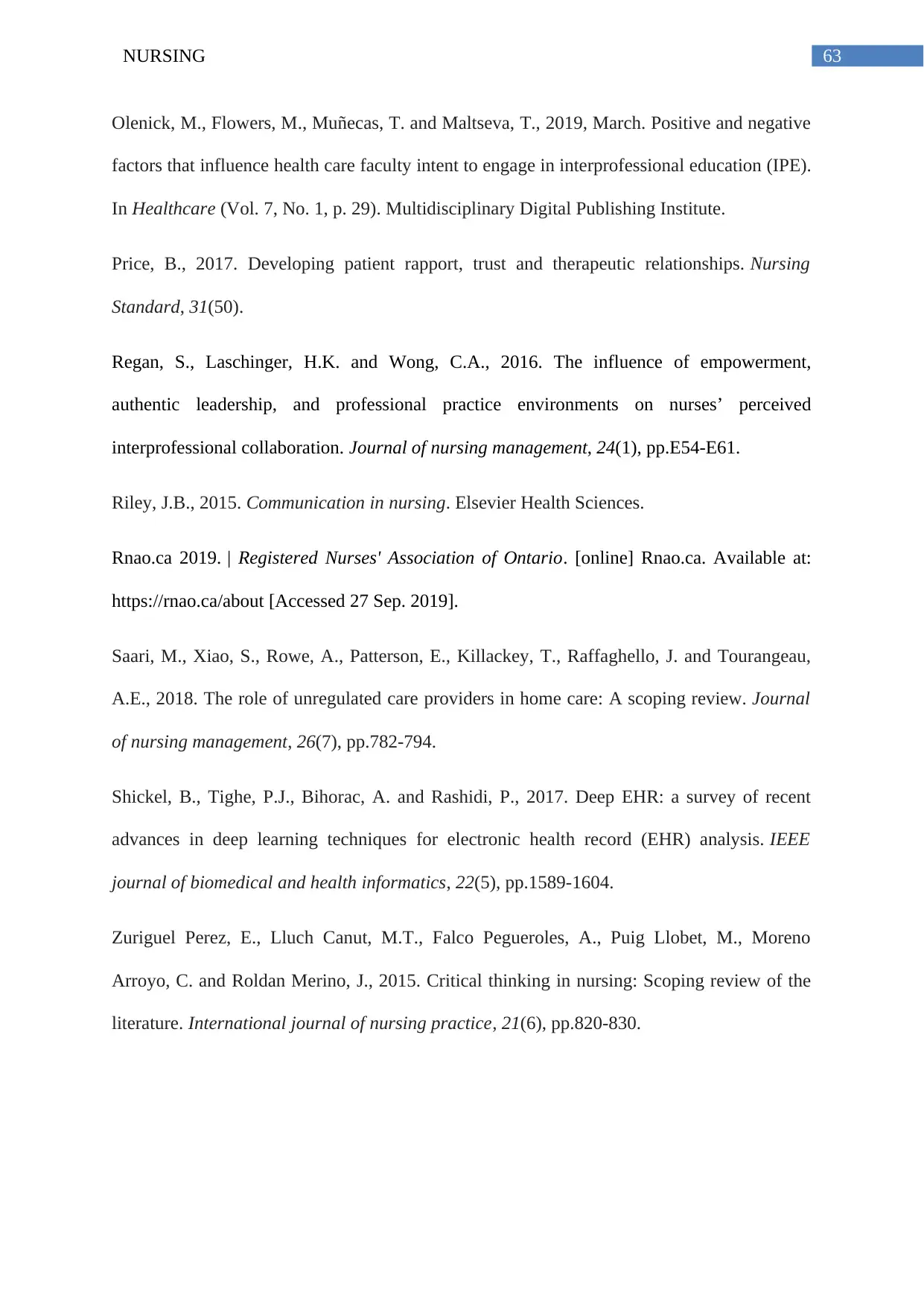
63NURSING
Olenick, M., Flowers, M., Muñecas, T. and Maltseva, T., 2019, March. Positive and negative
factors that influence health care faculty intent to engage in interprofessional education (IPE).
In Healthcare (Vol. 7, No. 1, p. 29). Multidisciplinary Digital Publishing Institute.
Price, B., 2017. Developing patient rapport, trust and therapeutic relationships. Nursing
Standard, 31(50).
Regan, S., Laschinger, H.K. and Wong, C.A., 2016. The influence of empowerment,
authentic leadership, and professional practice environments on nurses’ perceived
interprofessional collaboration. Journal of nursing management, 24(1), pp.E54-E61.
Riley, J.B., 2015. Communication in nursing. Elsevier Health Sciences.
Rnao.ca 2019. | Registered Nurses' Association of Ontario. [online] Rnao.ca. Available at:
https://rnao.ca/about [Accessed 27 Sep. 2019].
Saari, M., Xiao, S., Rowe, A., Patterson, E., Killackey, T., Raffaghello, J. and Tourangeau,
A.E., 2018. The role of unregulated care providers in home care: A scoping review. Journal
of nursing management, 26(7), pp.782-794.
Shickel, B., Tighe, P.J., Bihorac, A. and Rashidi, P., 2017. Deep EHR: a survey of recent
advances in deep learning techniques for electronic health record (EHR) analysis. IEEE
journal of biomedical and health informatics, 22(5), pp.1589-1604.
Zuriguel Perez, E., Lluch Canut, M.T., Falco Pegueroles, A., Puig Llobet, M., Moreno
Arroyo, C. and Roldan Merino, J., 2015. Critical thinking in nursing: Scoping review of the
literature. International journal of nursing practice, 21(6), pp.820-830.
Olenick, M., Flowers, M., Muñecas, T. and Maltseva, T., 2019, March. Positive and negative
factors that influence health care faculty intent to engage in interprofessional education (IPE).
In Healthcare (Vol. 7, No. 1, p. 29). Multidisciplinary Digital Publishing Institute.
Price, B., 2017. Developing patient rapport, trust and therapeutic relationships. Nursing
Standard, 31(50).
Regan, S., Laschinger, H.K. and Wong, C.A., 2016. The influence of empowerment,
authentic leadership, and professional practice environments on nurses’ perceived
interprofessional collaboration. Journal of nursing management, 24(1), pp.E54-E61.
Riley, J.B., 2015. Communication in nursing. Elsevier Health Sciences.
Rnao.ca 2019. | Registered Nurses' Association of Ontario. [online] Rnao.ca. Available at:
https://rnao.ca/about [Accessed 27 Sep. 2019].
Saari, M., Xiao, S., Rowe, A., Patterson, E., Killackey, T., Raffaghello, J. and Tourangeau,
A.E., 2018. The role of unregulated care providers in home care: A scoping review. Journal
of nursing management, 26(7), pp.782-794.
Shickel, B., Tighe, P.J., Bihorac, A. and Rashidi, P., 2017. Deep EHR: a survey of recent
advances in deep learning techniques for electronic health record (EHR) analysis. IEEE
journal of biomedical and health informatics, 22(5), pp.1589-1604.
Zuriguel Perez, E., Lluch Canut, M.T., Falco Pegueroles, A., Puig Llobet, M., Moreno
Arroyo, C. and Roldan Merino, J., 2015. Critical thinking in nursing: Scoping review of the
literature. International journal of nursing practice, 21(6), pp.820-830.
1 out of 64
Related Documents
Your All-in-One AI-Powered Toolkit for Academic Success.
+13062052269
info@desklib.com
Available 24*7 on WhatsApp / Email
![[object Object]](/_next/static/media/star-bottom.7253800d.svg)
Unlock your academic potential
© 2024 | Zucol Services PVT LTD | All rights reserved.



